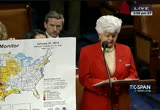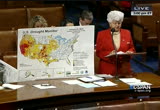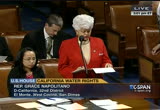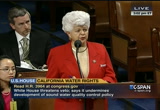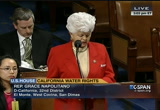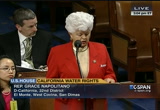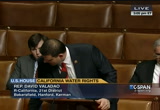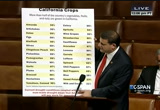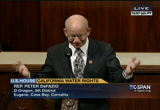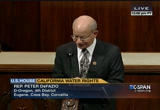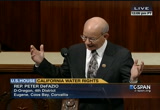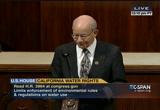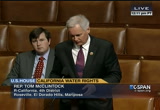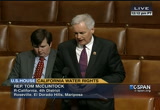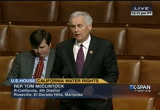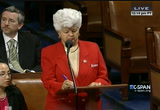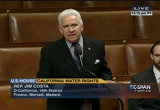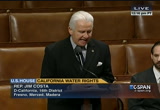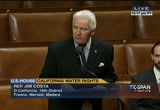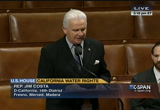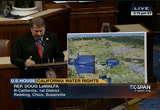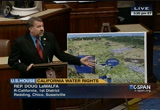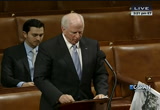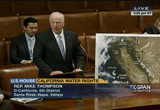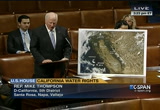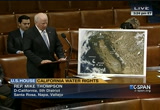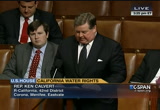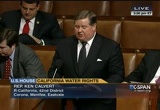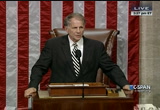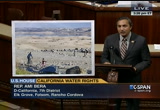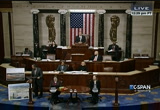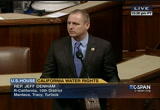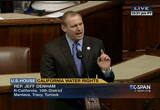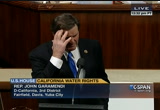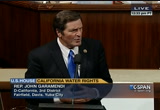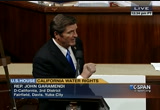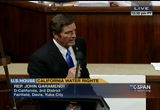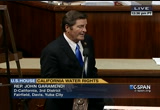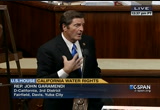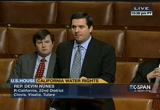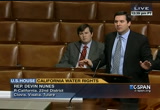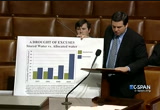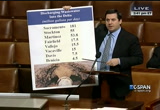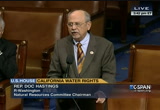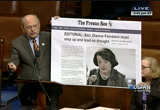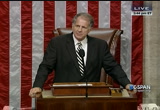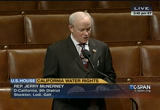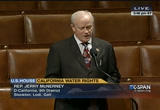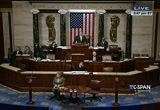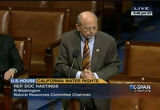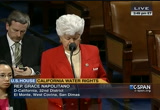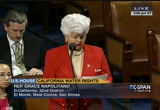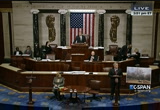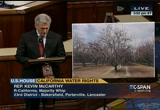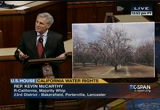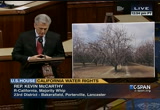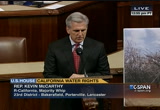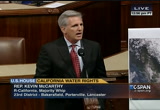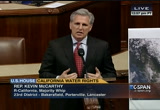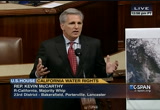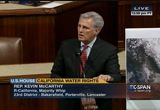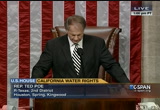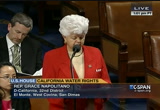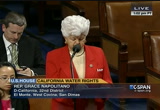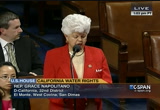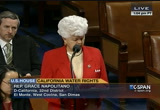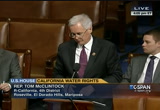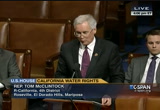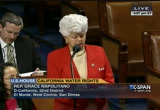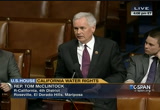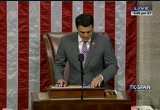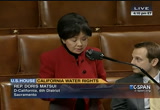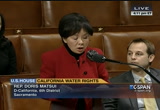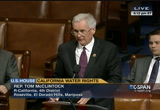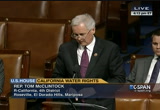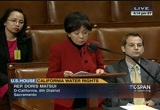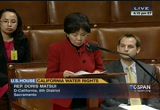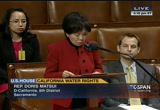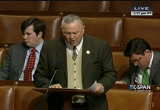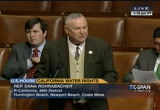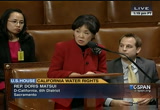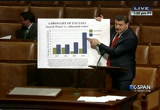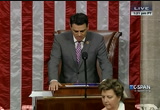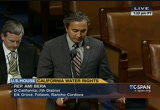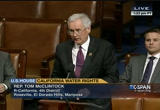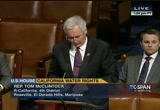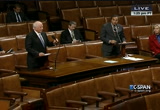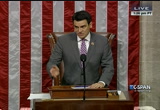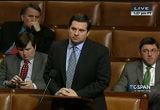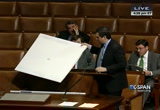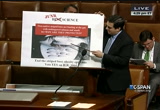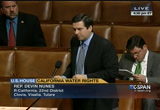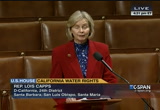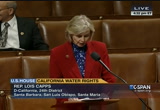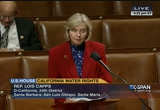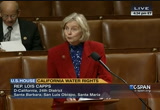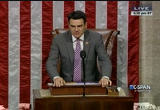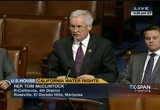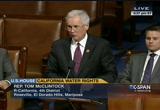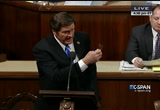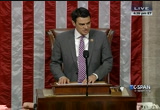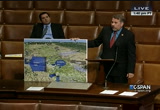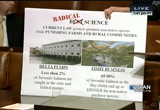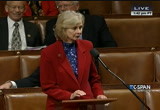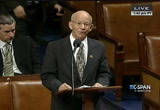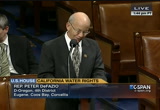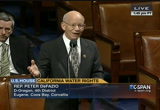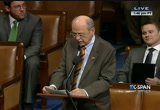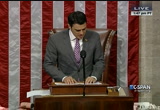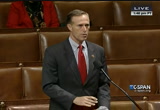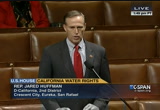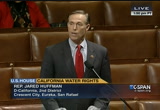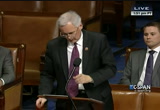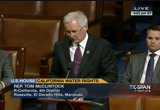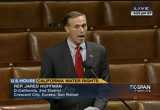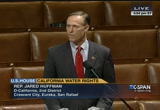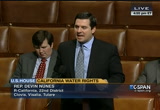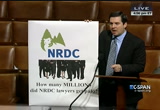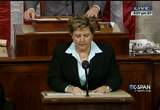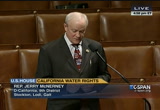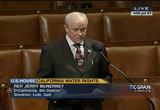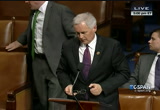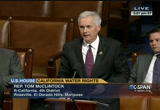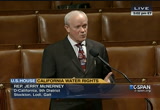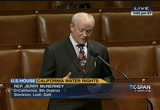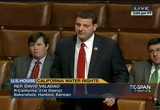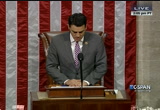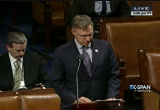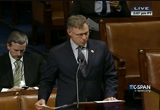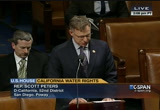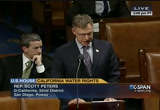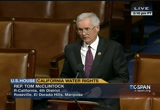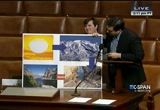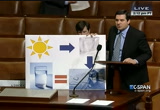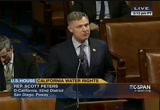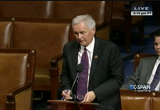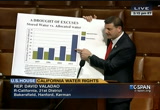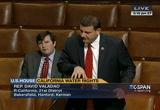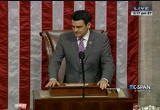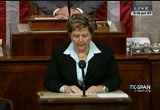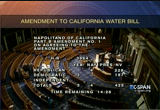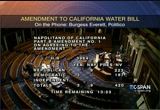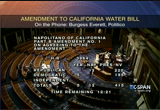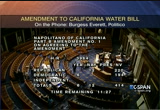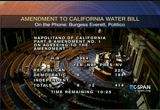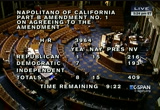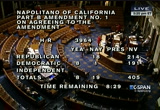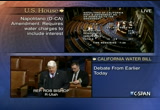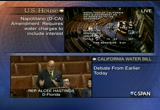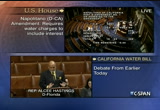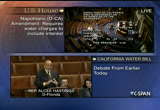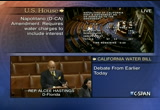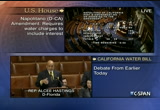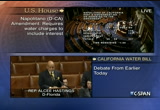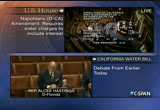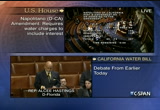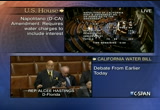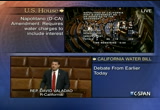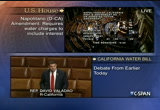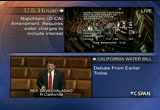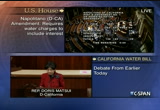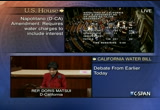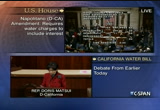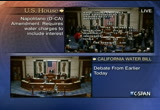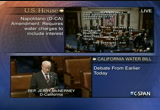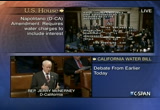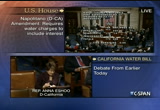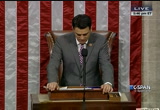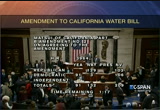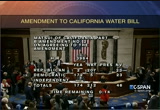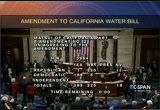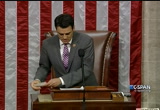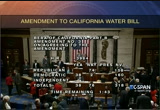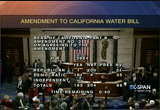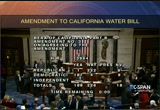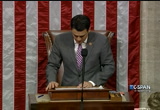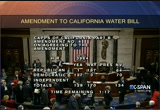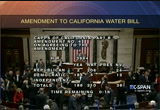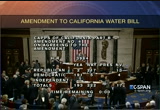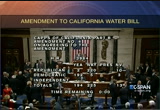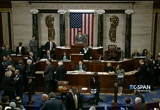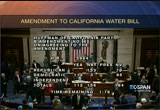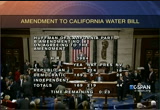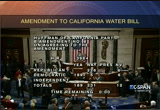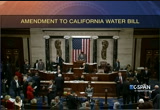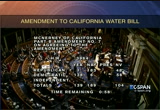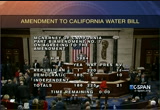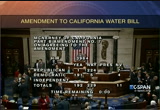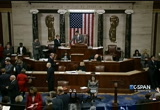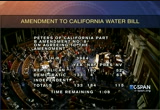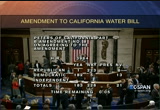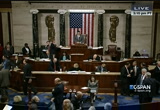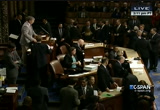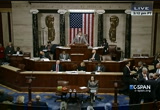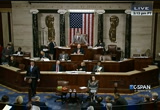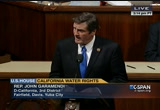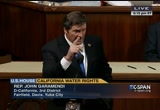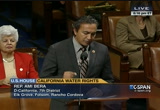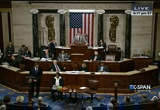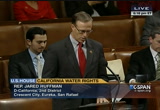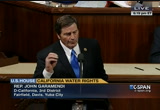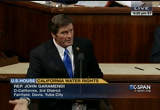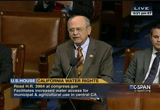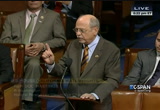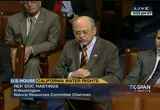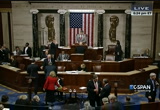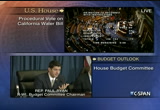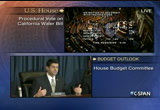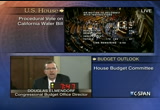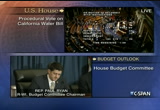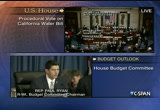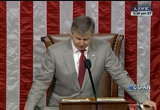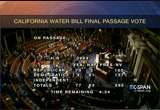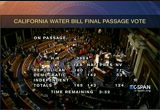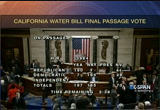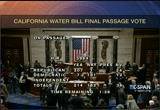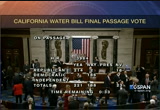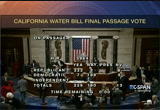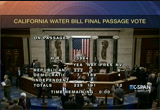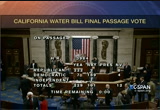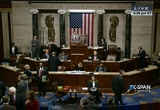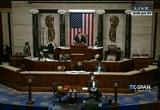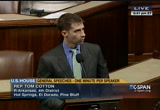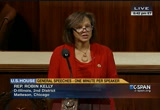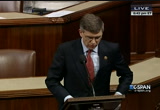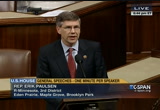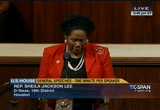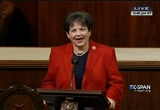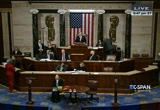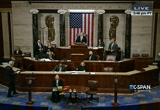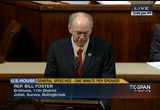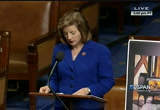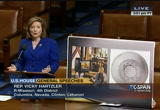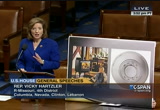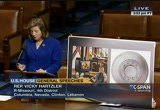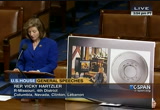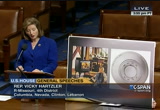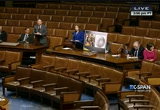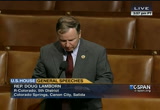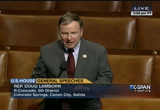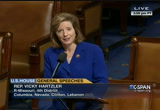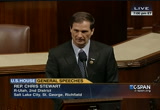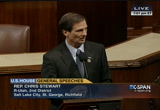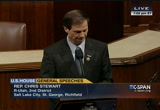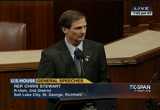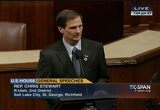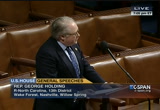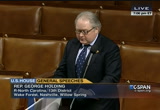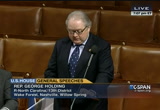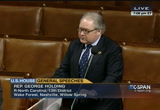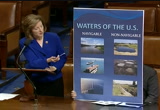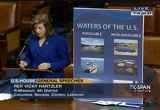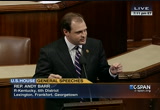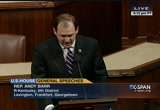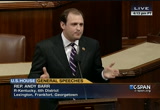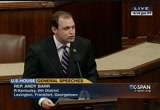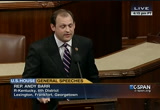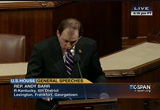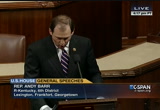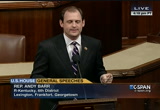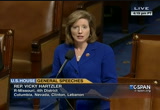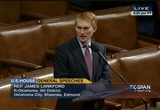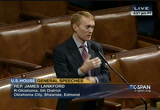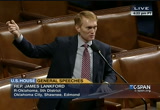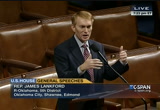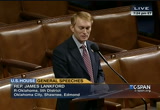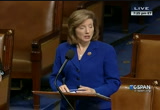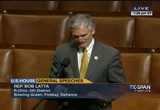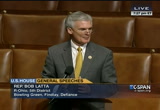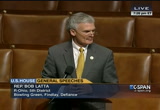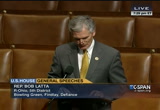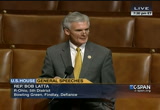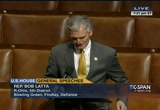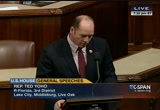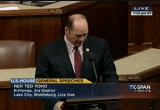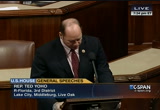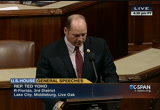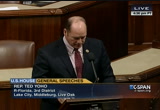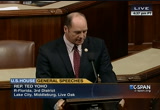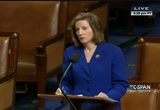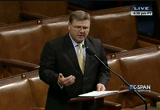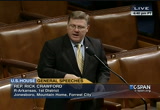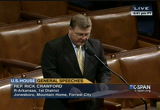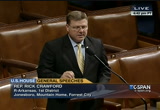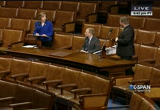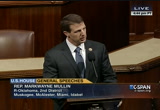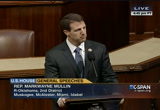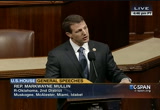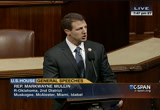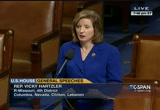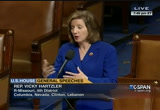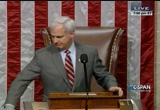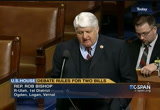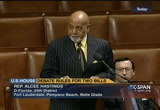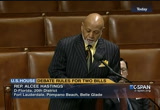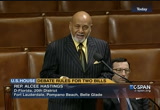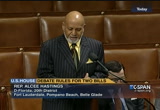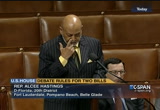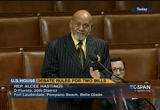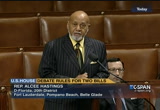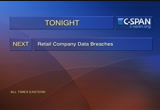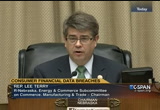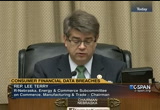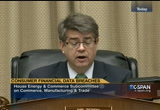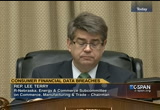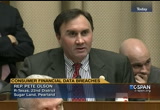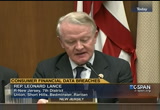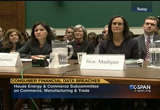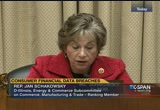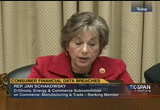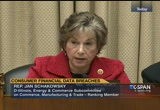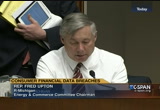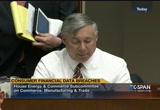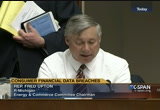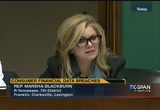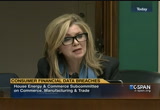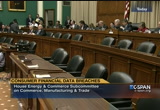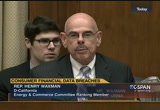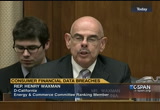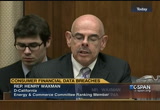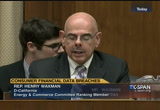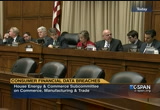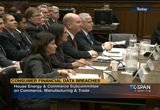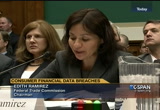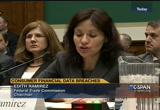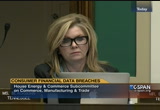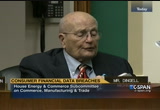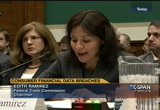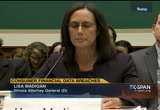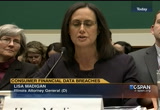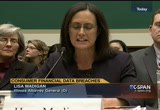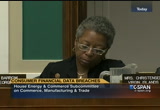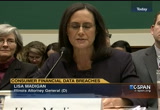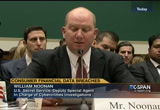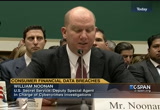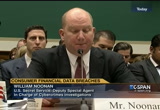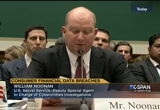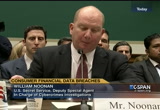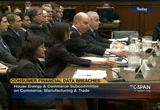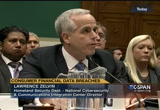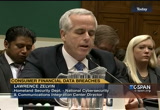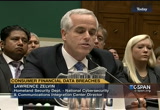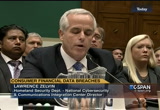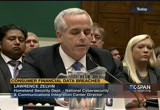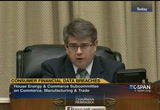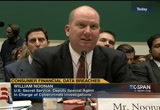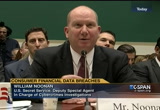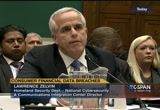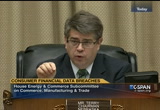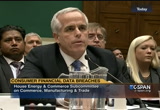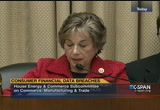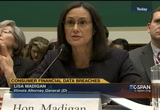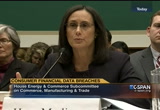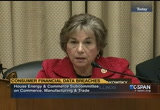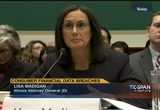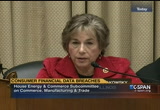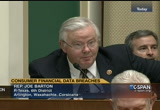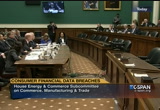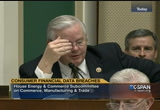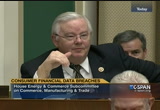tv U.S. House of Representatives CSPAN February 5, 2014 3:00pm-9:01pm EST
3:00 pm
we are entering the third year of drought. the driest on record in california. this bill, 3964, the sacramento-san joaquin valley emergency water delivery targets central california only, central valley, and was introduced one week ago with no hearing, no markup, nothing. it was introduced by republican california colleagues and no cooperation with the rest of california members who are facing similar drought impacts. it's similar in 1837 from 2011 and died in the senate, as was pointed out. according to the california department of resources, the snowpack in the sierras, the largest reservoir in the central valley system was 6% normal. the drought monitor found that 90% of the state is experiencing moderate to severe drought. so cry in california that the last -- first 18 days of january, the state saw 289 fires that burned 721 acres,
3:01 pm
ncluding the kobi fire in my district. they have used the superscooper water plane at a time when california should be xperiencing its wettest month. secretary laird said it best, he said, this bill falsely promise water relief that cannot be delivered because in this drought, the water simply doesn't exist this legislation is set to reallocate water in a way that erroneously elevates some water right boves all other need. it reveals existing state law for -- repeals existing state law for water use in california, establishing a very harmful precedent for other states. it repeals sections 104, 107, 108, 2014, and 201 that explicitly waive state law or reclamation law. it repeals historic california
3:02 pm
water rights because of careful, balanced compromise. undermining our and other california states' ability to use resources. it overturns 20 years environmental and copper is vation protections and the endangered species act and ignores, ignores the best available science demonstrating the negative effects on species. we are, in fact a species too, the human species. it repeals the federal and state agreement on the court order settlement act for san wo keen. it prohibits federal or state governments from exercising water rights in order to conserve, enhance, recover or otherwise protect any species that is protected by the operates of the state water project. it also reallocates water for junior water rights holders in central valley and ignores the needs of southern california and water users while prioritizing a
3:03 pm
water resource for a select few. it does not create any new water, ehe -- it eliminates the co-equal goal of protecting environment and allowing water delivery. it puts jobs at risk not only for fishermen but also at risk for the economy, it revert contract renewal terms to 40 years instead of the current 25. mr. chairman, the severity of this drought benefits a very small group. it does not benefit all of drought impacted california. it needs the cooperation of a bipartisan solution for all of the state including southern california. water bonds in the past favored northern california, the levee funds favored the bay delta. 3964 favors southern california only. we are currently in dialogue with senators over a drought bill. title 16 which is recycle water,
3:04 pm
water smart, they've been stole walling our ideas, not allowing bills to be given the courtesy of a hearing in the full committee or subcommittee. -- ureau of reclamation reclamation shows 21.5 million with a backlog of 400 million congressional approved projects. mr. speaker i request permission to submit letters in opposition from the white house a statement and veto threat, from the gonor of california, governor brown, from the california department of natural resources secretary john laird from california attorney general, and from 34 dwerts california environmental groups. the western environmental council indicates their opinion has not chame. the bill will create more litigation over water and not solve anything. we need to work on a bipartisan basis, putting that forth. 3964 is not such an attempt. i urge my colleagues to vote no
3:05 pm
on h.r. 39 of 4 and i reserve the balance of my time. the speaker pro tempore: without objection tissue the chair: without objection the gentlelady's request is covered by general leave. the gentlelady reserves. the gentleman from washington. mr. hastings: i'm pleased to yield three minutes to the author of this legislation a californian whose district is heavily impacted by this manmade drought, mr. valadao. the chair: the gentleman is recognized. mr. valadao: the reason we're here today is we have talked for long enough, we've seen negotiation after negotiation and the last one we're asking to go back to was in the mid 1990's. it aloud water to go for the environment and agriculture and now we're not getting that. what we're asking for is a little attention. this to many viewers probably don't find this interesting. it's a bunch of trees. but these trees are dead, they've been pulled out of the ground. it probably doesn't mean a lot to the speaker or others but
3:06 pm
these are trees that grow crops. those crops create jobs. the people that do those jobs are these people right here. we hear so many people talk about unemployment insurance. these people want to work. they want to earn a paycheck. they want to go home at the end of the day with their money in their pocket and be able to buy food that is grown around them. natural, good, wholesome, american food. these people do not like standing in a line and do not like waiting for government handouts. they want to work and be productive members of today's society. i know for a lot of people watching today, they think this is a california problem. this is the food grown in california. 99% of the almonds, 99% of the artichokes, 99% of the figs, 99% of the olives, 99% of the pis tashyows. so when we talk about helping people who need help and giving them the resources to feed their family, if we cut off water to california it has a direct
3:07 pm
impact on the money they rev -- receive from the government, it make theirs food more expensive, limit what is they can buy to feed their families. anybody who claims to be helpful to those who need our help the most and votes against this bill is saying, i want to raise the cost of food to everybody in the united states. thank you and i yield back. the chair: the gentleman from washington reserves. the gentlelady from california is recognized. mrs. napolitano: thank you, mr. speaker, i yield as much time heas may consume to the gentleman, mr. defazio. the chair: the gentleman is recognized. mr. defazio: here we are, day two of the house committee on natural resources on the floor. yesterday we spent the entire afternoon debating whether 435 members of the house were better suited to make decisions about individual forest service ranger districts wildlife management programs or units of the national park service motorized recreation regulations,
3:08 pm
overturning local managers. we were told that significant amendments, real eaments about real issues like the re-authorization land and water conserve -- conservation fund couldn't be offered because we immediate to respect the legislative process. are we respecting the legislative process here today? this bill was introduced last week. this no hearings have been held, no committee heatings have been held, it was brought straight to the floor. despite everyone here knowing we're going to face the worst drought the american west has seen in a century the committee of jurisdiction has failed to hold even one hearing on current conditions. and in case you missed the news, here it is. california, driest conditions in over 500 years, extreme drought over 70% of the state. nevada, my home state, severe drought in 0% of the state.
3:09 pm
do you think we should be thinking about how we're going to mitigate this, what are we going to do for disaster relief? shouldn't we be looking at rerality as opoed to this piece of legislative neater? no. a number of us on the committee have asked for a hearing a comprehensive hearing on all the aspects of this drought and the majority has yet to respond. now, this isn't a joke. and it's not something we should be playing political games with. seriously. you know, we have empty reservoirs, fallow fields, failing fisheries. that calls on us to be bigger and better than play these stupid, partisan games. that's what this is. just like the bill yesterday. this bill is not a serious effort to legislate. it's going nowhere. the governor of california opposes it. senator feinstein opposes it. colorado, montana, wyoming, new
3:10 pm
mexico and oregon are all opposed to the provisions overturning state water law. the party of states rights overturning state water law? the nonpartisan 18-governor water council opposes this bill. overturning state water law this intill a chimera in the real a mythical word, creature. it's a fiction. not something real. in greek mythology, the chimera was defeated by a great hero, mythical, but a slayer of beasts. in this case the senate will replace that hero. this is going nowhere. we're fiddling while our forests are going to burn this summer. the only way out of the current drought conditions is to make the skies open and rain. we aren't making rain with this bill. we aren't even making law today with this bill. cynical, embarrassing, we should
3:11 pm
tull this -- pull this bill from consideration, work on something that will help not only those in california but all of us impacted in the west by this drought. let's a hold a hearing on this drought, let's form a task force and come up with real, bipartisan solutions. i yield back the balance of my time. the chair: the gentleman yields back. the gentlelady from california reserves. the gentleman from washington is recognized. mr. hastings: mr. chairman, i'm pleased to yield three minutes to the gentleman from california, mr. mcclintock a member of the committee has -- who has worked hard on this legislation in the last congress and this congress. the chair: the gentleman is recognized for three minutes. mr. mcclintock: thank you. mr. chairman, california's drought is nature's fault but our failure to prepare for it is our fault. in california, the ruling democrats have not only obstructed the construction of new dams for the past 35 years they've also actively sought to tear down existing ones. they've substituted conservation for desperately needed storage and now that we face drought, we find that our few reservoirs are
3:12 pm
empty and our conservation options are exhausted. worse, in the first years this drought, 1.6 million acre-feet of water was dumped into the pacific ocean for the care and amusement of the delta smelt. 800,000 acre-feet, enough for four million californians, was deliberately drained from our now-empty reservoirs just several months ago, knowing that walter was desperately needed to support the threatened human population. part of that water was taken from central valley farmers who now face economic extinction. this bill corrects these tragic policies. it's true, we cannot make it rain but we can take measures to stop this lunacy, increase storage capacity, reinforce existing water rights and assure we never again must face a crisis of this magnitude this bill allows for the expansion of lake mcclure by 70,000
3:13 pm
acre-feet, it gives local water agencies the ability to store additional water, it sets demrirnse additional storage and it authorizes local water crickets to partner with the federal government to expedite expansion of existing reservoirs and construction of new ones. it reverses the policies that put the delta smelt ahead of the needs of thousands of farm workers and millions of consumers. the people responsible for these policies say that this steals watter from northern california. it does not. this is only watter that would otherwise be lost to the pacific ocean. this bill restores the bipartisan bay delta accord that guarantees the delta the water it needs and grants a portion of any excess to the central valley. this historic accord was broken when central valley water was expropriated for the delta smelt this bill reer tos that accord
3:14 pm
while making provision to increase the overall supply. the other outlandish charge is the measure overrides state water rights. it does exactly the opposite. it specifically protebts state water rights against infringement by any bureaucracy, local, state, or federal. we have listened to the environmental left for 40 years and this is where it's gotten us. it's time to reject these voices and return to the commonsense and proven -- common sense and proven policies of abundance that ensure the prosperity we once enjoyed. i yield back. the chair: the gentlelady from california is recognized. mrs. napolitano: may i inquire the time left on both sides? the chair: the gentlelady from california has 21 1/2 minutes. mrs. napolitano: and the other side? the chair: the gentleman has 20 1/2 minutes remaining. mrs. napolitano: i yield three minutes to mr. costa of
3:15 pm
california. the chair: the gentleman is recognized. mr. costa: thank you very much, i want to thank the ranking member of the subcommittee for having an opportunity to speak on this measure. i rise in support of this bill despite my reservations about the bill's prospects in the senate. over the years i supported a number of provisions and goals within this legislation that many of them will not offer much, if any, immediate relief unless we see biblical portions of rainfall taking place in california in the next six weeks. as california is in the midst of the worst, worst drought on record, reservoirs are at record lows and we have 13% of our average snow pack. people in my district deserve an effort that deals with the current realities that can offer help. no one has done more over 30 years working in sacramento and in washington to provide water not only for our valley but the entire state and to ensure that we have a long-term supply. unfortunately, too many folks on
3:16 pm
both sides of the aisle have kicked this can down the road. as much as i think a numb of reforms in this bill are long overdue, some of the policy decisions have increased frankly the damage of the current rought seasons. we have to recognize we are in atoryage situation. there are many things de-- are in a triage situation. there are many things we need to to fix our broken water situation in california. immediately we need to figure out how to move water, the scarce resource it is, if in fact we do get additional rainfall. this is not political points. it's about mitigating the impacts of people, people living in 17 water districts that in 30 or 60 days will no longer provide drinking water for themselves. new ideas, new immediate relief should be offered, not rehashing of the old political battles. last week we saw what could
3:17 pm
happen in california when the entire valley delegation working together on a bipartisan basis with senator feinstein and boxer asked the bureau of reclamation to honor the carryover water that had been provided by those farmers who saved it in last year. and in fact, we were able to maintain that water this year. it's a lifeline. the bureau and the administration heard our united calls loud and clear, and they made a fair decision to allow farmers in the valley to keep water that otherwise would have been confiscated. but we need more these kinds of efforts which is why i offered an amendment yesterday to create a joint committee to bring us together to deal with these short and long-term challenges. this effort's important since right now we seem to be talking past one another and feuding over editorial pages across the state rather than finding the common ground that we need. although leadership chose not to bring my amendment up for a vote, i think we have to be open to getting down at the
3:18 pm
brass tax at some point in time because it's the only thing we can do to solve these problems on a bipartisan basis. solutions to our water problems are not and should not be partisan. traditionally they have been regional and i can tell you where the political fault lines lie. they're deep and historic. it's time for cooler heads to prevail. it's not about political points. it's about people who've lost their jobs. the chair: the gentleman's time has expired. mrs. napolitano: 30 seconds. the chair: the gentleman is recognized for 30 seconds. mr. costa: this is not mr. political points. it's about the dairy producer who might soon have to consider selling the dairy their grandfather started. it's about farm workers who might find themselves in food lines instead of helping produce the most productive crops in the world. it's about migrant children workers who might soon have to leave their school because their parents have to look for work elsewhere. and the coming -- in the coming days we will be introducing legislation. i hope we can ingender some
3:19 pm
bipartisan support and at the end of the day that's what it's going to take to solve the water problems in california. i yield back the balance of my time. the chair: the gentleman yields back. the gentlelady from california reserves. the gentleman from washington is recognized. mr. hastings: mr. chairman, i am very pleased to yield two minutes to another member of the natural resources committee and a californian, mr. lamalfa from california, two minutes. mr. lamalfa: thank you, mr. chairman, mr. speaker. the chair: the gentleman is recognized for two minutes. mr. lalma if a: i am pleased to support mr. valadao's bill. we are able to work together as neighbors to overcome the overreaching environmental restrictions that this bill seeks to do. it's diverted so much water away from san joaquin families for their farms, away from agriculture, away and in favor of a three-inch fish. title 4 says that northern california cities and farms will maintain their first right
3:20 pm
to water from the waters of origin, rivers, which runs through their communities. i'm open to working with anyone at anytime as a realistic plan to address our historic droughts. the minority has offered amendments that would do nothing to address this crisis. indeed, they would put more roadblocks between californians and the water they need. we see plenty of potential for projects that could happen, such as the reservoir in my neighborhood in northern california, possibly the raising of shasta dam. other projects that would be very viable. indeed, if you look at this graph here, there's much potential that could be realized when 76% of the water that comes into the delta flows straight out the pacific. only 24% actually stays in the delta or goes south of the massive amount of water that comes in to the delta initially. potential there for storing more water, to have more available for everyone, whether it's farms, cities, environmental use can be
3:21 pm
realized by building projects by removing the roadblocks that are unnecessarily there by bureaucracy or politics. we need to have a much better atmosphere of cooperating in this time of drought and putting our efforts forward to truly help californians. indeed, mr. speaker, we need to pass this bill today to take that step. moses parted the red sea. i think we need someone to part the red tape that's held california up for so many years in holding the water up. i yield back the balance of my time. the chair: the gentleman yields back the balance of his time. the gentleman from washington reserves. the gentlelady from california is recognized. knapp national park -- mrs. napolitano: thank you, mr. speaker. i yield to the gentleman from california, mr. thompson, three minutes. the chair: the gentleman from california, mr. thompson, is recognized for three minutes. mr. thompson: thank you, mr. chairman. i rise in strong opposition to this bill. a bill that would destroy jobs, does nothing to address the real problem, the drought, and ignores more than 20 years of established science. what's the bill do?
3:22 pm
well, this bill help -- will this bill help alleviate the drought? no. even if we pumped as much water as possible, farmers would still not have enough. there simply isn't enough water to go around. we're in extreme drought, the worst in the last creptry. you can look at these photographs and see the snowpack last year versus the snowpack this year. we're in bad straits and it's a drought. it's not a man-made problem. it's a drought. will this bill kill jobs? yes. the delta supports thousands of jobs in farming, fishing and tourism and has an economic output of more than $4 billion a year. this bill puts those jobs in jeopardy. will this bill harm drinking water that millions of people rely on? approximate yes. when clean water is pumped south, the level of saltwater in the delta increases. people can't drink sea water. the entire state of california
3:23 pm
is in a drought. you saw it in today's "usa today." there are towns without water. there's more towns in line to lose all the water they have. and it's not due to a lack of pumping, because of a quote-unquote little fish. it's due to the lack of snow and the lack of rain. now, i know this is personal for many of my colleagues. it's personal for me too. many of the towns that i represent are running out of water. my hometown is rationing water. 65 gallons per person per day. it's a real, real serious problem. i understand the concerns of the central valley farmers. ag is big in my district too, and this drought is hurting my constituents as well. because of these dry conditions, grapevines will experience an early bud this year and without water to protect the early bud from the frost, we have no crops. out of business. but it's a drought that's
3:24 pm
causing the problem. proponents of this bill say those who oppose it care more about fish than people. these comments cheapen the debate. they insult the intelligence of californians are not based on facts. as u.c.-berkley professor stated in the paper today, michael hamon, he said you can kill every fish in the delta and you still would have a real problem. simply put, this bill is nothing more than a thinly veiled attempt to use this drought as an excuse to pump water from other users and to do so with zero regard for the people who depend on that water for their livelihoods. it would be more productive for this body to join in a rain dance on the floor today than to pass this bill. our people, our constituents deserve better than this political-driven bill. they deserve solutions. i ask for a no vote on the
3:25 pm
bill. thank you. the chair: the gentleman's time has expired. the gentlelady from california reserves. the gentleman from washington is recognized. mr. hastings: mr. speaker, i'm pleased to yield two minutes to a former member of the resources california, two minutes. the speaker pro tempore: the gentleman is recognized for two minutes. >> mr. speaker, i rise in strong support of the legislation. mr. calvert:: albert einstein said the definition of insanity is doing something over and over again and expecting different results. that just about sums up californians' water policy today. time and time again, we have put californians down by diverting water away from communities because of federal practices based on unfair priorities. california is headed toward an economic calamity unless meaningful action is taken. ongoing drought conditions, combined with regulatory restrictions have placed a tremendous strain on california water supplies.
3:26 pm
today we're offering a first step to a solution to the devastating drought that california is facing. the central valley of california produces a significant amount of our nation's crops. the devastation caused by this drought will reverberate to the country in the form of soaring food prices. water officials across the state are taking responsible steps to ramp up conservation efforts and stretch every drop of water that we do have. unfortunately congress and our federal regulatory agencies have failed to take a similar approach during these trying times. with our face facing an unprecedented water shortage, it's time for congress to end the regulatory restrictions that are outdated and ineffective. like many californians, i'm tired of seeing millions and millions of gallons of water that could go to people in california instead of being dumped in the pacific ocean because of federal regulations that punish families, farmers and the economy.
3:27 pm
it's been mentioned here just last year, 800,000 acre-feet of water was flushed in the ocean during unprecedented rains. we should never be wasting that amount of money when people are suffering from drought. today, the house can change that equation, restore balance between protecting the environment and providing water to the people who need it. i want to thank and commend my colleague, david valadao, for his passion and leadership on this had issue. it's' been here a short time but -- he's been here a short time but he's been a tremendous impact on the central valley. i ask my colleagues to support this bill. i yield back. the chair: the gentleman's time has expired. the gentleman from washington reserves. the gentlelady from california is recognized. mrs. napolitano: may i inquire the length of time left on both sides, please? the chair: the gentlelady from california has 15 minutes. and the gentleman from washington has 16 1/2 minutes. the gentlelady from california. mrs. napolitano: thank you, mr. speaker. i yield to the gentleman from ifornia, congressman ami
3:28 pm
bera, three minutes. the chair: the gentleman is recognized for three minutes. mr. bera: i rise to speak against this bill and here is why. this does nothing to create additional water supplies. the water we lost we can't get back. what we need to do is look at ways to better manage the water we have and look at ways to better conserve that water. we're ready to do this. we're ready to work with our colleagues on the other side of the aisle as californians. this isn't about democrats versus republicans. we can't pit one community against another. you're talking about families. this is a picture of folsom lake in my district. 500,000 residents, and our community relies on water from folsom lake for drinking water. it's not about a little fish. it's about when a child goes to turn on their tap they get clean water coming out of it. this should be underwater. if you want to understand how bad it is, let's look at this picture. this is the west side of folsom
3:29 pm
dam. where's the water? this bill takes water where it doesn't exist. you can't move water if it doesn't exist. so we stand ready to work with our colleagues in both houses and across the aisle to look at better ways for us to manage water, better ways for us to predict weather forecast if you're going to have a dry season, to protect that water, and better serve all of californians' communities. it can't be northern california versus southern california versus central california. it's got to be californians oork working together. let's solve this. let's work together and let's create a better california for managing our water together. with that i yield back. the chair: the gentleman yields back the balance of his time. the gentlelady from california reserves her time and the gentleman from washington is recognized. mr. hastings: thank you, mr. chairman. i'm very pleased to yield two minutes to another former member of the natural resources committee, mr. denham from
3:30 pm
california, two minutes. the chair: the gentleman from california, mr. denham, is recognized for two minutes. mr. denham: thank you, mr. speaker. i rise today to support the bill to ensure again the house takes the lead in taking action about this big crisis that we're having in california's central valley. this measure puts a number of commonsense ideas on the table to alleviate the severity of today's drought. there's need for federal response because california has a cross-cutting network of both state and local water projects. with the passage of this bill, i hope the senate will finally come to the table. if you don't like our idea, come up with one of your own. we have to have storage, we have to have conveyance, we need to plan for the future. there are times we have wet years, but if we don't store the water, we don't have it for drought years. it is common sense, and it should be bipartisan and it should be bicameral. what i'm most proud about on this bill is you actually have members from different regions of the state that have come
3:31 pm
together and said the time is now to finally come together on a solution for what we have and what we're facing today in california's central valley. so i'm thankful to mr. valadao for not only bringing this bill up but for also including my provisions which will create some more water storage, and streamlining some construction projects. this bill also includes two of my bills, h.r. 2705, seeking to protect native salmon and steelhead, and h.r. 2554, which would allow 100,000 new acre-feet of storage. we can do simple things to conserve more water. these two measures produce more water and alleviate pressure on upplies. and at no cost to the taxpayer. yesterday the senate passed the farm bill which we passed here last week, but without water new york california, having a farm
3:32 pm
bill doesn't mat aerowhole lot if you can't plant the crops to feed the rest of the nation. i urge my colleagues to pass this bill. the time is now to have a real water solution. again if you don't like this one, come up with one of your own. let's have some water storage. let's have a dialogue. but let's not shut down residents of the central valley or drinking water across the state. the speaker pro tempore: the gentleman's time -- the chair: the gentleman's time has expired. the gentlelady from california is recognized. mrs. napolitano: i yield five minutes to the gentleman from california, congressman garamendi. the speaker pro tempore: the gentleman is recognized for fife minutes. mr. garamendi: mr. speaker, i don't know if it's propper to ask you a question but is this february 2? i'm reminded of the movie "groundhog day." we continue to repeat what
3:33 pm
happened yesterday and the year before. this is a repetition of a bill that came to the floor two years ago. it was a bill that had a lot of different pieces to it but was very, very simple in what it accomplished or attempted to accomplish, and that was to take water from someone, the environment, fish, and the delta, farmers, communities, contracosta county, the east bay of san francisco, and deliver it to someone else. that would be the san luis unit of the central valley project. it was two years ago. must be february 2. must be ground hogg day because we're doing -- groundhog day because we're doing it all over again. whatever whistles and bells and bows you want to put on it, this is essentially a theft of water from someone to give to somebody
3:34 pm
else. plain and simple. that's what it's about. in this case, the water is going to be stolen and i use that word because that's accurate, from the delta. from the environment. san francisco bay. from the salmon. which is a huge industry in california. all the way up the coast to oregon. to be given to the largest single water district in the nation. a district that by its contract with the federal government is specifically set to take shortages in their water when there is a drought. this bill becomes law that won't be the case. they'll get the water and someone else won't. ok, we've seen this show before.
3:35 pm
we also saw before that this type of legislation, as does this bill, overturns the california constitution, pushes it out of the way, and all this done by folks who normally call themselves state writers. ok. well this is the biggest grab of power by the federal government on water anywhere in the history of the reclamation law dating back to 1904. never before has the federal government made such an attempt to grab the water rightfully belonging to a state and saying, you, in this case california, e going to use that water as seen fit by the federal government. current water law and current law and practices for a century and more have been the opposite. this doesn't solve the problem.
3:36 pm
we got a real problem. these have been seen before and they're going to have to be seen over and over because that was a ear ago. turn it right side up. that's a lot of snow. that was a year ago. snow in the sierras. that's this year. no snow. and by the way, central valley looks pretty much like a desert, not just the san joaquin valley but the whole valley. we've got a problem. we've got a very real problem. an we really need a real solution. this bill isn't a solution. this bill is a call to arms. this bill is the clarion call of yet one more battle in the great california water war. and we're all -- we're all veterans of that war.
3:37 pm
my colleagues on the republican aisle my colleagues on the democratic aisle, we're veterans of the water war. unfortunately, this bill doesn't solve the problem of california. there are solutions available. we really need to get to them. we really need to sit down and work with a bill that passed the house and the senate and signed by the presidentless than two weeks ago, the omnibus bill in that omnibus bill there's a restoration a re-authorization of the federal drought emergency program that has some 16, 17 different provisions that provide for specific things that we should be funding. there's no money in this bill for funding. we're going to have to fund this this is a problem that reaches across many, many states. it's going to take all of us working together to help each individual state, each community and every water district deal with a very real problem.
3:38 pm
but oh, no, it's a battle, it's a call to arms, get to your barricades, put pull out the old weapons. we need a solid solution here and this bill doesn't do it. the speaker pro tempore: the gentleman's time has expired. the gentlelady from california reserves. the gentleman from washington is recognized. mr. hastings: i'm pleased to yield three minutes to the author of the legislation that passed this house in a bipartisan way last time of which this bill emulates the gentleman from california, mr. nunez. the chair: the gentleman is recognized. mr. nunes: this is about 40 years policy that passed out of this body that took water from our region and sent it out to the ocean. that's what this debate is about the inconvenient truth for the folks on the left is that their 40 years of policies have resulted in people running out of water. one of the times they stole
3:39 pm
water was in 1992, after that, we had what were called the bay-delta accords. state-federal partnership, that was the last time we were supposed to give up water. it codified into law that agreement. the gentleman was talking about stealing water, they're very good at stealing water. at the time they stole water last time, they said the accord was going to be the last time. we were going to have water -- the last time we were going to have water stolen from us. that was in 1994. but water continued to be stolen. and now there seems to be a misunderstanding about how the system works. l.a., hollywood, san francisco, it's a desert. they don't have water. they conveniently get their watter from the colorado river oreo semitee valley. they ignore all environmental rules. but they make people who live in the san joaquin valley live by the rules that they don't want to live by. that's reality. we have these projects that are
3:40 pm
built for five years of storage. and movement of water. so you can see when we had a drought in 1997 and 1991 and 2009, these were the allotments at those times. last year we actually didn't have real bad drought. look at the allocation. so the system simply isn't beingudes. all the audiocassette we ducts, all the dams use -- all the aqueducts, all the dam that were kennedy ed, -- john f. said this this is a fast trip but if it had no other benefit than to have us look at this valley and others like it across the country where we can see the greenest an most richest earth producing the greatest an richest crops in the country and a mile away and see the same earth and see it brown and dirty and useless all because there's water in one place and not in
3:41 pm
another. president kennedy had the foresight to construct these projects that now after 40 years of bad policies by the left they've run the state out of water. they've run the state out of water. and meanwhile, they talk about killing fish, well, why are they killing the fish? because all of these cities that most on the left represent dump their sewage into the delta that kill the fish. so stop dumping the sewer water in the delta if you care about the fish. if you care about the fish, give up your water in yosemite national park, let that water go out to the delta to save the fesh. mr. speaker, time for stealing water has ended and that's what this bill does. i yield back. the chair: the gentleman yields back his time. the gentleman from washington reserves. the gentlelady from california. mrs. napolitano: i reserve my time. the chair: the gentlelady
3:42 pm
reserves. the gentleman from washington. mr. hastings: mr. chairman, i yield myself such time as i may consume. the chair: the gentleman is recognized for as much tile as he wishes to use. mr. hastings: this debate is interesting. what we are presenting here today and what is being presented by my california colleagues is from their poif a solution to a problem caused by a drought and caused by regulatory action in the state of california. and i've heard my colleagues on the other side of the aisle stand up, virtually everybody has said this i know my colleague, mr. garamendi said something that i'll allude to in a moment, mr. costa said something about that the ranking member of the natural resources committee said something about what i'm going to say. and i dare say the gentlelady from california, mrs. napolitano said the same thing. the threat of what they all said is that there are slugses and we need to work together. d -- solutions and we need to work together. to which our side says fine.
3:43 pm
this is our solution. we recognize you may not like it. we recognize that. but we also have one other point we need to recognize and that is the genius of our founding fathers created two bramples of the legislative branch, the congress. the house, which we have the privilege to serve, and the senate. i made the observation in my opening statement that the senate has not acted on any water bill laws at all. finally, somebody in this area is catching that message. "fresno bee" in the middle of the san joaquin valley, editorialized that senator feinstein must step up and lead on the drought. what that means is step up and write a piece of legislation. i heard my colleague says we're working on a piece of legislation, maybe by next week. i want to make this point, this is very specific. introducing a piece of legislation is not legislating.
3:44 pm
legislating is when you pass a piece of legislation out of your respective house. ic that's what the "the fresno bee" is saying here when they tell senator feinstein and others to step up on this pass some legislation. i'm sure that legislation will be different than this. we've heard from my colleagues on the other side. that's fine. i can take it, i dare say my colleagues can take it too. then we can work out the difference. but we don't know what your position is. that is what is frustrating to us. mr. chairman, i think this is a good piece of legislation, the last congress acted on it and should act on it again. i reserve my time. the chair: the gentleman from washington reserves. the gentlelady from california is recognized. >> may i inquire the balance of time on both sides. the chair: the gentlelady has 8 1/2 minutes. the gentleman from washington has nine minutes. mrs. napolitano: thank you, mr. chairman. i now turn it over to congressmen from california, mr. mcnerney. three minutes.
3:45 pm
the chair: three minutes. is it three minutes? the gentleman is recognized for three minutes. mr. mcnerney: i thank the gentlelady for yielding. i rise to express anymy trong opposition to h.r. 3964. this legislation will do tremendous harm to the sacramento-san joaquin delta, an area i'm privileged to represent. let's start with the facts. california is in a drought, experiencing its driest year on record. snow packs are at about 13% of what they should be, regions have set new records for consecutive dry day days during the rainy season. 17 mustn'ts are at risk for running out of drinking water within 60 days. the national drought mitigation center upgraded about 9% of california to an exceptional drought, the organization's most intense level of drought severity. yet here we are again, spending time on a bill which according to its authors is only a short-term fix for a few
3:46 pm
communities and duds nothing to help california and its water crisis. john laird said that h.r. 3964, and i quote him, falsely holds the promise of water relief that cannot be delivered because in this drought, the water simply does not exist. let me repeat that. the water simply does not exist. now, i know that the other side is going to vote unanimously for this bill, so i ask them to look and see what's inside of it. the not in your interest. this takes away states' rights. his -- it does away with states' protections. i ask people that live in the great lakes area, people that live in the florida everglades area, pay attention. this is a federal precedent. it allows the federal government to come and take your water. is that what you want? i don't think so.
3:47 pm
so i ask the members of the other side of the aisle, please consider what this bill contains. please vote the right way. we should be addressing water efficiency, storage, reuse and recycling, water management, innovative water projects and a long-term approach to water shortages. all h.r. 3964 ensures is that more water is shift out of the delta, turning this precious estuary into a salty, stagnant marsh, devastating local economy and costing the delta region thousands of jobs. we should stand united in preventing this legislation from ever becoming law, and i urge my colleagues to oppose h.r. 3964. thank you and i yield back. the chair: members are advised to address their comments to the chair and not to each other and the gentlelady from california reserves. the gentleman from washington. mr. hastings: mr. speaker, i yield myself such time as i may consume. the chair: the gentleman is recognized for as much time as
3:48 pm
he wishes. mr. hastings: mr. chairman, i just want to respond to remarks that my -- the previous speaker from california made about the potential danger in this bill as it relates to water rights in other states. what the gentleman was alluding to is absolutely incorrect, because the language in this bill is very specific. it is very specific as it relates to california. we went through this process in the last congress when we went through hearings because other state, my state included, was very, very concerned if whatever preemption had to do with water here would affect other states. and in this bill, last year and in this bill, the language is very, very specific. it does not apply to other states. it is california centric only. so i want to make that point, mr. chairman and with that i reserve the balance of my time. the chair: the gentleman reserves. the gentlelady from california. mrs. napolitano: i continue to reserve my time. the chair: reserves. the gentleman from washington. mr. hastings: mr. chairman, i would inquire if my friend has more speakers and if she's
3:49 pm
prepared to close, i'm prepared to close. mrs. napolitano: we have no speakers and i'm prepared to close. mr. hastings: we'll reserve. the chair: the gentlelady from california is recognized. napolitano thap thank you, mr. speaker. we heard -- mrs. napolitano: thank you, mr. speaker. we hear we need to work together. mr. bera said that. mr. denham says create your own. i thought this was the house of the people, that we were supposed to be working together. that's why we have such low ranking in the view of the american public is we continually fight against each other. we need to sit in dialogue and be able to converse, at least agree on things that are necessary, to be able to help our country back on its feet instead of fighting over what's not necessarily fightable about. mr. hastings, the chairman, talked about solutions, past legislation. like anything else, we don't get information about many of the bills until the last minute
3:50 pm
and i cannot get any hearings on some of my bills and neither can some of my members get hearings in the subcommittee or the full committee for being able to address some of these issues that have come up on water. in summary, we have, of course, his bill that repeals historic california water rights, ignores best available science -- excuse me -- repeals court orders on the san joaquin water right, preempts california state law, creates no new water. with that i'd like to enter a statement that the statement of administrative policy, administration strongly opposes h.r. 3964, the emergency water delivery act because it would not alleviate the effects of california's water and would disrupt decades of work, that includes settlements that equitablely addresses california's most complex water challenges. california is experiencing severe drought questions and
3:51 pm
low reservoir storage. the urgency and seriousness requires a balanced approach that requires ecosystem, restoration that ends with, for the president's advises him to veto the bill. -- the president's advisors him to veto the bill. i urge my colleagues to vote no and i yield back the balance of my time. the chair: the gentleman from washington. mr. hastings: thank you, mr. chairman. -- i d the majority of my yield the gentleman the balance of the time, the majority whip, mr. mccarthy. the chair: the gentleman is recognized. mr. mccarthy: thank you. i want to thank you. the news from california is not bright. current news, our drought is
3:52 pm
the worst in a century. governor brown has declared a state of emergency because of the drought. our water storage is at near empty. farmland is going foul. drinking water is threatened. 17 communities can go dry in four months. absence from god, our options are limited to ease this pain. it didn't have to be this way. so why are we here today and why are we debating this bill? well, without action, farms are going to go fallow. so what does that mean for the rest of the nation? a lot of people don't look what happened throughout california in the central valley. most of the produce is produced there for the nation and the world. if you just look at a few, 94% of all tomatoes, 93% of all
3:53 pm
broccoli, 89% of all carrots, 78% of all lettuce, so that means prices will go up. but it also means you're going to buy that produce somewhere else. you're going to buy it overseas. maybe china, maybe mexico. what about the food safety? more importantly, what about those jobs? what about those workers. just a few short years ago, unemployment in some of these cities were 40%. it's already more than 10%. the worst part of all this, it didn't have to be this way. we could plan for it. you know, i've heard colleagues talk about this, mr. chairman, but back in 1994, we actually had a bipartisan agreement. the bay delta accord. and it's more than just democrats and republicans agreeing. it was environmentalists,
3:54 pm
farmers, water users. everybody came to an agreement. but that bond was broken. the reason we debate this is water is so precious. most of the snowpack comes from the north and travels down to the south. we have a state water project that, which is little ironic, governor brown today when his father was governor, built more than 50 years ago. there's always been allocations to send it down south. this year they made history. in the history of the water project, the allocation is zero . zero. you know, when growing up you study in history. there's always those esop fables. he -- aesop fable. he was a slave in ancient greece that would tell these tales about lessons.
3:55 pm
one of them talked about the ant and the grasshopper where the ant in the summertime, because they knew winter would come, would go out and work hard and store food for the winter. not the grasshopper. they'd be idle out there in summer and enjoying life and hopefully nothing bad ever happened. well, over the years government regulation has made it harder. government regulation has changed the bay delta accord. safe to say environmentalists have decided fish are more important than those unemployed. that maybe they come before the individual. and what does that mean? since 2007, the state water project has lost 2.6 million acre-feet because of these policies. ow, what does that mean, 2.6
3:56 pm
million acre-feet? that means that's enough for the annual water needs of every resident in los angeles, new york and chicago combined. where'd that water go? out to the ocean. why would we send it out to the ocean when we could store it for the drought that we knew would happen? there's nothing that illustrates this more of a broken system than just three years ago. you've all seen those photos of people shown down here on tv of california when it had a snowpack and california today when it's all dry. but just three years ago, you know what that snowpack was? . re than 170% boy, that would be a good year to be an ant. that would be a good year to send it down. that would be a good year to store for today so those communities would fought go dry or that land would not go fallow.
3:57 pm
that wasn't the case. you know what the allocation was when we had 170% of snowpack? 90%. you know what's unjust in all of this. this year when we get 0% or when we got 80% of allocation, the bill was always the same. you paid 100% regardless of what the allocation you got. what about property rights? what about responsibility? what about a broken system? so what does this bill actually do? well, first and foremost, it puts families before fish. it goes back to an agreement hat everybody agreed upon, and it moves us in a place where we can prepare. you know, standing defensively in the face of droughts is not a noble gesture. it's actually insanity.
3:58 pm
oday this house will act again because we would not be in the drier place we are today had the senate taken up the bill we acted on in the last congress. why? because this house believes and understood and learned the lessons of the fables before, the senate ared but in the grasshopper style sat idly by. our senators -- california is pretty powerful in the senate. mr. chairman, i would say that california has two senators that are chairs of committee. there was an opportunity to act. and what's unique in this form of government and what we have the greatest of the world, we have two houses. it doesn't mean both houses have to agree at the very beginning. it does mean that you take action and show where you
3:59 pm
stand, just like the house did two years ago. the senate took no stance, so how do we know where they stand? but we will act again. the senate needs to act, show us where they stand, go to conference and stand up for the families of california. this has gone on too long. we do not have to be in the situation we stand today. this -- there are families that do not have to be unemployed if we acted -- and we acted in the senate based on what we did. there are communities that did not have to go dry had we acted before. so enough of rhetoric, enough of the fight. the time is now. as the sun sets today, a bill will be out of this house, but still nothing is even introduced in the senate. mr. chairman, i implore, don't
4:00 pm
make california hurt anymore. i yield back. the chair: the gentleman's time has expired. all time for general debate has expired. pursuant to the rule, the bill shall be considered for amendment under the five-minute rule. it slal be in order to consider -- it shall be in order to consider an original bill for the purpose of amendment under the five-minute rule an amendment in the nature of a substitute consisting of the text of rules committee print 113-134. that amendment in the nature of a substitute shall be considered as read. no amendment to that amendment in the nature of a substitute shall be in order except those printed in part b of house report 113-340. each such amendment may be offered only in the order printed in the report by a member designated in the report , shall be considered as read, shall be debatable for the time specified in the report equally divided and controlled by the proponent and opponent, shall not be subject to the amendment and shall not be subject to
4:01 pm
demand for division of the uestion. it is now in order to consider amendment number up with printed in house report 113-140. for what purpose does the gentlewoman from california seek recognition? mrs. napolitano: i have an amendment made in order. the chair: the clerk will kezzig nate. the clerk: amendment number one printed in house report 113-340, offered by mrs. napolitano of california. the chair: pursuant to house resolution 472, the gentlewoman from california, mrs. napolitano and a member opposed each will control five minutes. the chair recognizes the gentlewoman from california. mrs. napolitano: pli amendment is to h.r. 3964 is very, very simple. it is an inconvenient truth however it creates a revenue stream to the treasury by eliminating an irrigation
4:02 pm
subsidy which requires irrigators to pay project debt with interest. in other words ending free taxpayer of funded subsidy since 1902 that's been in place since reclamation was created. it requires that any new water contracts or renewed contracts must reflect the price of watt we are interest and repay the debt of the project to only treasury with interest. this will be a small assistance to balancing our national debt. when reclamation was established in 1902, it was nonet deliver water to farms with approximately 160 acres, and in 1982 it was changed to 960 acres. subsequent congressional -- subsequently it's changed. congressional action has also made repayment of project debt interest free. i repeat, debt interest-free for irrigators.
4:03 pm
while my municipalities and constituents and power users pay required appropriate interest. i repeat, debt interest free for irrigators while municipalities, cities, and power users pay required interest. which other state water users were as lucky as these folks. h.r. 3964 removes the role of federal government in protecting the environment and public good. that's not good. if we are removing the role of the federal government we should remove federal subsidy associated with renewed or new water contracts. my constituents and anybody else's must fairly and equally repay interest on any project and they have. for over a decade, a decade, southern california foresaw needed infrastructure and many entities stepped up to the plate and provided some relief. we paid for new facilities like diamond valley reservoir
4:04 pm
entirely paid for with local money with not one federal cent. this is on top of investments we made in title 16 with recycled water, only a 25% federal match. let's thend interest-free subsidy at our taxpayers' ex-pebs. i repeat, let's end this free interest subsidy at america's taxpayers' expense. eliminating this unfair subsidy will help to cut our deficit and i urge all my colleagues to vote yes on the amendment and i would like to make a statement about a statement made on the bay delta. it seems that secretary bab et and secretary resource -- resources were the ones who passed the bay delta accord and three years spen by mr. garamendi to implement this. thank you mr. speaker, i yield back the blbs of my time. the chair: the gentleman from california is recognized.
4:05 pm
for what purpose does the gentleman from california seek recognition? >> i rise to claim time in opposition to the amendment. the chair: the gentleman is recognized for five minutes. >> this amendment was rejected by a bipartisan vote when the gentlelady introduced it in 2012 and it deserves a similar fate on the floor today. let's be clear about what it does. mr. mcclintock: it singles out central valley project participants who pay their federal loans off early to a punitive surtax that's imposed by -- on no other bureau of reclamation project in the united states. this surtax will be passed on to consumers through higher prices. now the central valley project was already singled out for a punitive tax, about $50 million annually, by congress in 1992 to fund an array of environmental slush funds. i believe that beneficiaries should pay the cost of water
4:06 pm
projects but they should pay only the cost of those projects and no more. these are not cash cows for the federal government to milk until they're dry. when the left speaks of corporate farms they leave out the fact that virtually every family farm is incorporated and that's who we would be singling out for this special tax. that tax is then paid in only one of two ways, by employees through lower wages or by consumers through higher prices. i have a modest suggestion. perhaps we should start putting people back to work rather than running them out of business. i've often criticized the gentlelady and her colleagues for policies that created conditions that indirectly send water prices through the roof but this proposal does so quite directly and dramatically. i think that's why so many of her colleagues on the democratic side abandoned her two years ago and why they would be well advised to do so again.
4:07 pm
i reserve the balance of my time. the chair: the gentleman reserves. the gentlelady from california is recognized. mrs. napolitano: how much time is left. the chair: the gentlelady has two minutes remaining. mrs. napolitano: thank you, mr. chairman. we can go on debating the issue but everybody who takes a loan has to pay interest. i see no reason why since 1902 our irrigators have been singled out for not having opay that while other agencies do have to ante up the interest and they do pass it on to the consumer but the consumer understands why. we need to be transparent on the issue and be able to let people know what we're paying for. yes, we have the lowest price crop in california but we must be able to ensure that we let the rest of the nation know why we need to move forward. the central valley project, v.: -- c.v.p., it was $1.7 billion.
4:08 pm
only $235 million have been repaid. $1.45 billion have not been repaid. mr. chairman, i think this is an amendment that's in order to begin trying to help balance our budget and we hope that we will get our colleagues to understand that all of us have to hurt a little bit. i don't see why this has not had the merit that it should. i urge a yes vote and yield back the balance of my time. the chair: the gentlelady yields back. the gentleman is recognized. mr. mcclintock: it ought to be obvious to everyone that once you paid off a loan you don't keep paying interest on that loan. why? because you've already paid it off. what the -- and that is what every project managed by the bureau of reclamation does. when they're given permission to prepay the loan, to pay off the loan, the way you would early pay off your home loan, they no lominger are charged interest for it. the gentlelady would single out
4:09 pm
the central valley and the central valley alone for this punitive surtax. i've often wondered why the policy seemed to be aimed at the central valley. i don't know what it is that my friends on the opposition have against the thousands of farm workers whose livelihoods depend upon farming in that region, but they have been waging war on that hapless and helpless group for far too long. this is another example of singling them out for special punitive tax paid by no one else in all of the bureau of reclamation experience and with that i reserve the plans of my time. the gentlelady yielded back? in that case, i yield back the balance of my time. the chair: the question is on the amendment offered by the gentlelady from california. those in favor say aye. those opposed, no. in the opinion of the chair the noes have it. he amendment is not agreed to.
4:10 pm
mrs. napolitano: recorded vote, sir. the chair: the gentlelady requests a recorded vote. further proceedings on the amendment offered by the gentlelady from california will be postponed. it is now in order to consider amendment number two printed in part b of house report 113- 340678 for what purpose does the gentlelady from california seek recognition? ms. matsui: i have an amendment at the desk. the chair: the clerk wiz designate the amendment. the clerk: amendment number two printed in house report 113-340 offered by ms. matsui of california. the chair: pursuant to house resolution 472, the gentlelady from california, ms. matsui and this a member opposed each will control five minutes. the chair recognizes the gentlelady from california. ms. matsui: i yield myself such time as i might consume. the chair: the gentlelady is recognized. ms. matsui: i have an amendment that would preserve water rights. this bill causes more harm to
4:11 pm
california's water system than good. as i mentioned during our debates about california water, we should not jeprardies the health of one part of the state for another. in northern california, we have balanced our watershed between urban areas, agriculture, the environment. we have been good stewards and care deeply about how our withouter shed is preserved and grows. this legislation would take the problems of one part of the state and export them to the other. we cannot have a lasting solution to our water problems until we work on a comprehensive solution that includes all the stake helders. specifically this bill attempts to dissolve the responsibility for 800,000 acre-feet of water for the delta environment that doesn't solve california's water problems, it only exacerbates them. we all know that the sacramento-san joaquin delta needs to be restored, not driven into further rede-cline. the delta is a hub of
4:12 pm
california's water system. california needs it to be healthy. my amendment to h.r. 3964 seeks to amend the lang wamming regarding the elimination of water if for the delta environment. the amendment preserves senior water rights in northern california. the underlying legislation only creates discord at a time when we need alliances. we can and must do better for california as a whole. i urge my colleagues to support this amendment and i reserve the balance of my time. the chair: the gentlelady from california reserves. for what purpose does the gentleman from california seek recognition? mr. mcclintock: i rise to claim time in opposition to the amendment. the chair: the gentleman is recognized. mr. mcclintock: this amendment more than any other focusing on the ecentral issue surrounding this bill -- what comes first? families or fish? in 1992, the central valley project improvement act carved out 800,000 acre-feet to be dedicated to fish and wildlife
4:13 pm
purposes that water came out of the allocations for the central valley that all sides had agreed to at the time -- agreed to. at the time it was promised the water would be replaced that promise is unfulfilled to this day. the federal government began treating this allotment as a floor rather than a ceiling. a zealous official in the department of the interior re-efforted state water rights and ordered that more than one million acre-feet of water be used for purposes not authorized under water rights permits issued by the state of california this bill re-establishes the 800,000 acre-foot allotment agreed to by all sides when interior secretary bruce bab it promised, quote, a deal is a deal and if there's a need of adecisional water it will come at the expense of the federal government this redeems the promise broken by mr. bab it's deputy and the provision the
4:14 pm
gentlelady is offering would delete that provision. i might add that also under this bill the 800,000 acre-feet can be recycled by communities once it's met its environmental purpose rather than being lost to the ocean. to those who tell us they like recycling, this is the ultimate recycling bill. i might also point out that an amendment that had a similar effect two years ago was rejected on a bipartisan vote of 178-247 in this house and again i would recommend that we do so again today. with that, i reserve the plans of my time. the chair: the gentleman reserves. the gentlelady from california is recognized. ms. matsui: mr. chairman, my friend on the other side is trying to distract the public on what their bill actually does. h.r. 3964 would not provide any relief from the real drought but would permanently reallocate water for one interest. the 1992 central valley project improvement act designated
4:15 pm
800,000 acre-feet of water for environmental purposes. this water is important and is used to balance our water needs between urban, agricultural and environment. this so-called b2 water was dead kayed to hetch stem the rapid decline of a delta ecan system. h.r. 3964 repeals the b2 water allocation unless 800,000 acre-feet of additional capacity is found by 2018. who is going to make that up by 2018? as written, the bill would relieve the south delta c.v.p., the users of any responsibility for the environmental water. instead, it would be attempt to shift the responsibility to northern california. putting into jeopardy senior water right holders in northern california. mr. chairman, my district, the city of sacramento, and sacramento county, wrote letters saysing -- stating what we all know. this is a backdoor attempt to undermine long-standing
4:16 pm
california water rights. in short, this bill is another blatant water grab from northern california. mr. chairman, my amendment would protect senior water right holders in northern california and ensure we are all in this together in california. we should not pit one power state against another. again, this bill would not help alleviate the drought. even if we pumped as much water south as possible, central valley farmers still wouldn't have enough. that's because a lack of pumping is not the problem, the problem is a lack of rain and snow. there's no more water to pump. northern california is in a serious drought. this bill does not solve california's drought. it only further divides our state. mr. chairman, again, i urge my colleagues to support my amendment, i reserve the balance of my time. the chair: the gentlelady from california reserves. the gentleman from california is recognized. mr. mcclintock: mr. chairman, i yield two minutes to my distinguished colleague from california, mr. rohrabacher. the chair: the gentleman from
4:17 pm
california is recognized for two minutes. mr. rohrabacher: i rise in opposition to the amendment and in strong support of h.r. 3964. the final passage of this bill, and as we vote on this, as we have looked -- as it will come to the floor, is a defining vote. it is a vote by which the public will be able to determine just whose side we are on. do we favor animals, even fish, above the well-being of people? a click of environmental extremists with lots of money and no common sense have fostered the insane policies that are destroying one of the most vibrant and productive industries of california. these antihuman, proanimal policies have resulted in the unemployment of tens of thousands of hardworking americans who are struggling to make ends meet. their lives and livelihood have been destroyed all for the purpose of protecting a minnow that isn't even good enough to be bait. yes, this vote, the public will
4:18 pm
be able to determine whether or not at a time of drought and crushingly high unemployment we will continue to dump hundreds of thousands of acre feet of freshwater into the san francisco bay every year, enough water to grow 10 million tons of toe mateows, 200 -- tomatoes, 200 million boxes of lettuce, or tons of grapes. this is government regulation gone becircle. instead of protecting us from environmental threats, people are being treated as expendable. the current policy is destructive, not only to our farmers, but probably affect at most the poor people who are trying to put food on their table. yes, again, all of this is being done by, what? to protect the well-being of a fish. now, we have the opportunity to re-establish our priorities, a vote against this bill is a vote for radical environmentalist
4:19 pm
antihuman policies. a vote for this bill is a vote to reaffirm that we place a higher value on human beings and want to improve their condition. join me in opposing this amendment and supporting the bill. the chair: the gentleman's time has expired. the gentleman from california reserves. the gentlelady from california is recognized. ms. matsui: how much time is remaining? the chair: the gentlelady from california has 1 1/4 minutes remaining. the gentleman from california has one minute remaining. ms. matsui: mr. chairman, i might just say this. i grew up in central valley. my father was a farmer. so, i understand clearly the challenges the farming community has. i'm not an individual who dismisses the farming community. i lived on a farm. my father was a small farmer. my grandfather was a farmer. my uncle's a farmer. so i understand these challenges. but i also understand that we are together in california and we must work together. and we should be using this time to find real solutions to
4:20 pm
california's water issues, including the drought. unfortunately we seem to be paying part -- playing partisan games. my amendment would simply protect water rights in northern california. i urge my colleagues to support this amendment and i yield back the balance of my time. the chair: the gentlelady yields back the balance of her time. the gentleman from california is recognized. mr. mcclintock: mr. chairman, i yield the balance of our time to the author of this measure, my distinguished colleague from the central valley, mr. valadao. the chair: the gentleman from california is recognized for one minute. mr. valadao: thank you, mr. speaker. what we're asking for here is a little understanding of the situation we've got. this graph here shows how much water was in storage at the end of 2013. there was quite a bit of water there. but the allocation was this much. what this amendment does is continue to waste all the water here that should have been used for families at their homes, because people need clean water to drink, they also need water to grow food. because farmers don't farm for fun, they farm for food. because people like to eat. it's a funny little concept
4:21 pm
we've depot going on here. but -- we've got going on here. but here, this blue graph, we tnt continue to wastewater. if we're going to talk about the drought, and i've enjoyed all the pictures referring to the dams, we've got to stop wasting water. that's what our goal is and that's why i oppose this amendment. thank you. the chair: the gentleman from california yields back. all remaining time. the question is on the amendment offered by the gentlelady from california. those in favor say aye. those opposed, no. in the opinion of the chair, the noes have it. the amendment is not agreed. to ms. matsui: mr. chairman, i ask for a recorded vote. the chair: the gentlelady from california requests a recorded vote. pursuant to clause 6 of rule 18, further proceedings on the amendment offered by the gentlelady from california will be postponed. it is now in order to consider amendment number 3 printed in part b of house report 113-240. for what purpose does the gentleman from california seek recognition? mr. bera: i have an amendment made in order by the rule. the clerk: amendment number 3
4:22 pm
printed in part b of house report 113-340 offered by mr. bera of california. the chair: pursuant to house resolution 472, the gentleman from california, mr. bera, and a member opposed each will control five minutes. the chair now recognizes the gentleman from california, mr. bera. mr. bera: thank you, mr. chairman. mr. chairman, this amendment is simple. supporters of this bill argue that it won't negatively impact upstream users. my constituents are these upstream users. my amendment protects upstream users, adding safeguards for the five california delta counties. it guarantees that this politically motivated water grab would not harm the quality, quantity or safety of drinking water supplies for these residents. california's in the middle of a crisis. we need real solutions, not political solutions. last year was our driest year on record and we're at record lows of water. we all agree there's a problem.
4:23 pm
so let's sit down, democrats and republicans, and let's work to find solutions together. not pit one community against another. in the meantime, let's not sacrifice one community. this amendment ensures that. thank you, mr. chairman, i reserve the balance of my time. the chair: the gentleman from california reserves. the gentleman from california, mr. mcclintock, for what purpose does he seek recognition? mr. mcclintock: i rise to claim time in opposition to the amendment. the chair: the gentleman from california is recognized for five minutes. mr. mcclintock: mr. chairman, like tennyson's rotting meck real by -- mackerel by the moonlight, this amendment shines and it sinks. it states the obvious, that the bill would not harm delta drinking water supplies. well, of course it won't. after all, the delta counties are senior to the central valley in their water rights and so they have first call on that water. and under this bill, no agency of the state or federal government can take that right away. furthermore, under this bill, the delta counties can also reuse environmental water that would otherwise have been lost
4:24 pm
to the ocean, making in the ultimate water recycling bill. this bill in no way affects the quality of drinking water in the delta or anywhere else. the proof of that is in the fact that in the years following adoption of the bay delta accord, which h.r. 3964 merely restores, never was it suggested by any water agency that their drinking water oring a culingt water wased a -- oring a incumbent water was -- or agriculture water was wasted. the mere allegation by a single litigant, no matter how outlandish, no matter how contorted, can stall these vitally needed reforms. it would also give this administration the ability to claim a right to nullify this law based on such a fiction. back a few years ago, before the drought, when central valley water was being diverted for the delta smelt, i confronted the secretary of the interior and the natural resources committee. i pointed out that with thousands of farm workers unemployed, with a quarter
4:25 pm
million acres of prime farmland destroyed, with food lines in the agriculture capital of the west, with unemployment in some of these communities reaching 45%, he had the authority to suspend the diversions and to restore that water to the valley, to stop this human tragedy. he acknowledged that he had that authority, but he wouldn't use it, he said. because doing so would be like admitting failure. this amendment before us would give the same administration the excuse to ignore reality and act on ideological whim. this amendment, when it was offered two years ago, was rejected on a bipartisan vote of 177-243 in this house. i reserve the balance of my time. the chair: the gentleman from california reserves. the gentleman from california, mr. bera, is recognized. mr. bera: mr. chairman, i yield to my colleague from california, mr. thompson, two minutes. the chair: the gentleman from is recognized to for -- the gentleman is recognized for two minutes. mr. thompson: i rise in support of this amendment. california is facing a severe statewide drought. this drought is having a
4:26 pm
devastating impact on families all across our state. and this bill will only make things worse for many. it will jeopardize the drinking water for millions of californians. in my district, families from my counties get their drinking water from the delta. this supply is already limited due to the extreme drought. this bill wants to pump that limited drinking water south. doing this would flood the delta with sea water and people can't drink sea water. that's why this amendment is so important. it simply says that this bill shall not harm the delta's very limited drinking water supply. i urge a yes vote on the amendment and i thank the gentleman from sacramento for bringing it to the floor. i yield back. the chair: the gentleman yields back the balance of his time. the gentleman from california reserves. the gentleman from california, mr. mcclintock, is recognized. mr. mcclintock: we're ready to close when the gentleman from california is. the chair: the gentleman from california, mr. mcclintock, is ready to close. mr. bera is recognized.
4:27 pm
mr. bera: mr. chairman, from my perspective, this is stating the obvious. let's protect the water rights, the quality and -- of the users in my community in northern california. if it's in the bill, this just codifies that. it just makes sure that folks in the five delta counties, had they turn on their taps, can get water -- when they turn on their taps, can get water, clean water, quality water. if it's in the bill, there's no reason not to vote yes on this and codify it and make sure we protect those families in northern california. with that, mr. chairman, i yield back. the chair: the gentleman from california, mr. bera, yields back. the gentleman from california, mr. mcclintock, is recognized. mr. mcclintock: i'm pleased to combreeled the -- to yield the balance of our time to the gentleman from california, who introduced the predecessor to this bill to years ago, the honorable mr. nunes. the chair: mr. nunes is recognized for 2 3/4 minutes. mr. nunnelee: thank you, mr. speaker. i thank -- mr. nunes: thank you,
4:28 pm
mr. speaker. let's not be fooled here. this is about sewer discharge from the communities that are in the delta, that continue to dump their sewer water, runoff water, into the delta. they don't want to have to take responsibility for their actions. so, i hate to have to keep going back to this, but i'm going to have to go back to it again. there you see a discharge. here's the communities. all dumping sewage into the delta. that's all this is about. both of these amendments. that's why you should vote against them. but what's interesting about this is that you've heard a lot of talk about the fish. this is what the true believers really want to protect. they want to protect this little fish right here called the delta smelt. this is what this is about.
4:29 pm
it's about the endangered species act. it's about the biggest water grab in huftry and running people out of -- in history and running people out of water to protect this little fish. but they don't want to protect just that fish. oh, no. that's not good enough, mr. speaker. they want to dump their sewer water and protect the smelt and this is really inconvenient, they want to protect the striped bass. now, the striped bass is not native to the delta. but they want to protect it. you know why they want to protect it? because they say that, you know, fishermen, they want to fish, but conveniently, it's not native to the delta, but guess what the striped bass eats? if you can see on your television screen, see those little -- it eats the smelt. it eats the smelt, mr. speaker. it's an inconvenient little
4:30 pm
truth there. so, they want to protect these and these this one eats those. -- these, this one eats those. this is a problem that can't be fixed by people who want to protect little fish, mr. speaker. started out today, this is a bill that passed the last congress, had the senate act -- had the senate acted on it, we would not be in a situation that we are today. we are out of water because we are not using the infrastructure that our state has built and added on to over the last century. we decided to throw all that infrastructure away, not use it, dump the water out into the ocean, now we have no more water left. i yield back. the chair: the gentleman's time has expired. the question is on the amendment offered by mr. berah. those in favor say aye. those opposed, no. in the opinion of the chair the
4:31 pm
noes have it. mr. berah: i ask a vord -- mr. bera: i ask for a recorded vote. the chair: further proceedings on the amendment offered by the gentleman from california will be postponed. it is now in order to consider amendment number four printed in part b of house report 113-340. for what purpose does the gentlelady from california seek recognition? mrs. capps: i have an amendment at the desk. the chair: the chloric will report the amendment. the clerk: amendment number four printed in house report 113-340 offered by mrs. capps. the chair: the gentlelady from california, mrs. capps and a member opposed each will control five minutes. the chair recognizes the gentlelady from california. mrs. capps: thank you, mr. chairman. i rise in support of my amendment. california is in the middle of a severe drought. an emergency with no significant relief in sight. we must do all we can to responsibly manage the situation, working with state and local officials to ensure
4:32 pm
that our farmers, our businesses, and our constituents now the resources they need and in the future while we work to address the current -- and in the future. while we work to address the current situation, we know that severe droughts like this one will only become more frequent in the future due to climate change and we must do all we can as we deal with this emergency to also prepare for the next one. my amendment simply requires a study of the resiliency and adaptability of bureau of reclamation facilities and projects in california to predict changes to the quality, quantity, or reliability of water resources. simply put, it will look at how well the bureau is prepared for the expected impacts of climate change. like it or not, climate change is real and it's already happening. we've seen the evidence all around us in more extreme storms new york wildfires, in sea level
4:33 pm
-- extreme storms, in wildfire, in sea level rising, and drought. water is gold in california. scientists have long warned that climate change will make droughts, shortages of water, particularly in the western united states, longer, stronger and more frequent. rather than bury our heads in the stand denying the science we should be doing all we can to make our infrastructure more resilient and adaptable. at every point in our water infrastructure from reservoirs to kitchen faucets we need to find sustainable ways to lessen the impact of droughts like this one. that means more conservation, more efficiency and more recycling to be sure. it also means increasing the adaptability of existing infrastrubblingture to maximize the resources we have. that's what my amendment is all about. preparing for the future. simply lurching from crisis to crisis, from drought to drought is no way to govern and that's
4:34 pm
exactly what we have been doing. according to a fema study, every dollar spent on predisaster mitigation reduces the cost of future damages by $4. the drought emergency may not be destroying structures and infrastructures like some of our extreme storms do, but it is definitely causing serious damage to our crops, to our critical habitats, to our livelihoods. yet the underlying bill does nothing to address these serious problems and it does nothing to alleviate the drought emergency in california. and it does nothing to prevent any in the future. instead it uses the drought emergency as an excuse to repeal federal environmental laws to preempt california law. and it would set a dangerouses predebit that would have lasting implications on how water is managed throughout the west. that's why the bill is ose pod by the state of california and
4:35 pm
numerous local government agencies, fishing and hunting organizations, editorial boards and national environmental groups. rarely has such a diverse coalition come together to oppose a piece of legislation. mr. chairman, instead of wasting time on a divisive bill that is going nowhere, we should be working together to find comprehensive solutions that get our communities the resources they need. i want to be clear. my amendment does not fix the serious problems with this underlying bill. i will oppose the bill even if my amendment is adopted. but my amendment will at least move us one step closer to properly preparing for future drought emergencies. so i urge my colleagues to support this amendment and i reserve the balance of my time. the chair: the gentlelady reserves. the gentlelady from california, mr. mcclintock, for what purpose does he seek recognition? mr. mcclintock: i rise to claim time in opposition. the chair: the gentleman is recognized for five minutes.
4:36 pm
mr. mcclintock: this amendment seeks to impose another environmental study that may lead to more water being taken away from families and farmers and flushed into the ocean. if you support putting more this does he ocean that. they want to account for faster snow melt from the mountains and rain-based inflows. just today the east bay express reported that water managers deliberately dumped 800,000 acre-feet, as i said earlier, enough for four million californians, into the pacific ocean. that they knew was desperately needed as the drought continued to worsen. folsom lake, the principal source of water storage for sacramento the suburbs is nearly empty now because of those
4:37 pm
releases. we watched the sacramento river at full flood all winter and wondered what they were thinking. we should not be asking a g.a.o. to be investigate terms based on a lack of scientific consensus. this amendment does nothing that continues to store watt that continues to be lost to punitive federal regulations and may contribute to new regulatory overreach. californians are in a drought crisis now, it is time for action not another bureaucratic study with no end in sight. this is why we must not oppose -- impose studies in this bill. we need to build more stornl and thur -- capture more water and that's what this bill does. this bill is aimed at implementing a permanent solution to california's water crisis so we can put people back to work permanently and dere-store balance back to california's water supply. i reserve the balance of my time. the chair: the gentleman reserves. the gentlelady from california recognized.
4:38 pm
mrs. capps: could i inquire how much time remains? the chair: the gentlelady has one minute remaining, the gentleman from california has three minutes remaining. mrs. capps: i'm pleased to yield to my colleague, mr. garamendi 0 seconds. the chair: the gentleman is recognized for 30 seconds. mr. garamendi: thank you, mr. chairman. we continually hear about 800,000 acre-feet. there is 800,000 acre-feet, it is not out to the ocean, it is in the delta, it's available far variety of purposes including contra costa, the entire east bay and the county i represent. it is there as environmental law but it has multiple purposes. it's not wasted water at all. out of time i hope not this allocation chart that keeps coming up, that's based on a prediction of the amount of water that rain will fall that year. it's not the amount of water delivered. if you look at the actual amount
4:39 pm
of water delivered it's greater. the chair: the gentleman from california is recognized. mr. mcclintock spe -- we're ready to close when the gentlelady is. mrs. capps: this is a straightforward amendment, it requires a study of the adaptability and resiliency of the water infrastructure in california. scientists are warning us that severe droughts like this one will only grow more severe and frequent in the future. we have a responsibility to our farmers, our businesses, and all of our constituents to do everything possible to prepare for these impacts. my amendment is a step in this direction so i urge my colleagues to support it and i yield back. the chair: the gentlelady from california yields back the balance of her tie. the gentleman from california, mr. mcclintock is recognizedful mr. mcclintock: i thank the gentleman from california for maybing the point. i want people to look at the pictures of the empty reservoir
4:40 pm
at folsom, the near empty reservoir at oraval and remember 800,000 acre-feet that could have been retained behind those dams was released by officials, per the environmental regulations the gentleman detcheds. people need to reflect on the water that should be sitting behind those dams except for these regulations and realize what's exacerbating this drought. with that i yield the balance of our time to the gentleman from california, my friend and neighbor, mr. lamalfa. the chair: the gentleman is recognized. mr. lamalfa: we hear a lot about this particular amendment is going to start another study. we heard about more task forces. this is why we had 40 years worth of delay or longer on building new prompts in california. we hear about what the projected flows are going to be. here's what the flows are coming back to this chart once again. you see over here on the left, 76% of the watter that flow into
4:41 pm
the delta goes straight out to the ocean. three quarters. a mere 6% stays in the delta for its use. 18% is split between central valley and southern california needs system of we're wasting a lot of water. a lot of opportunity. we could be taken -- taking advantage of and still capturing water for environmental needs, ag needs and urban needs. i have also this chart shows his illustration, that we talk about water needs to be delivered south of the delta, indeed, even to the central coast which is running very quickly out of water as well. the central coast benefits from the pumps, the pumps when you talk about fish take are approximately %. maybe we can do better but they're doing a good job. as was talked about earlier, predator fish in the delta are taking from 65% to 90% of the
4:42 pm
fish kill of the salmon and ther protected fish that we're facing all this fuss about. we need to get very real about what the problem is and that the solutions aren't coming today from these amendments but indeed mr. valadao's bill is a step in that direction as well asest tablying long-term the type of storbling, the type of reoperation that's in favor of the people that are productive in california, in the bread basket of the nation and of the world. mr. speaker, i yield back. the chair: all time having been yielded back, the question is on the amendment offered by the gentlelady from california. those in favor say aye. those opposed, no. in the opinion of the chair the ins -- noes have it. mrs. capps: i ask for a recorded vote. the chair: pursuant to clause 6 of rule 18, further proceed thonings amendment offered by the gentlelady from california will be postponed. it is now in order to consider amendment number five printed in
4:43 pm
house report 113-340. for what purpose does the gentleman from oregon seek recognition? mr. defazio: i have an amendment at the desk. the chair: the clerk will designate the amendment. the clerk: amendment number five prinned in house report 113-340 offered by mr. defazio of oregon. the chair: pursuant to the rule the gentleman from oregon, mr. defazio, and a member opposed each will control five minutes. the chair recognizes the gentleman from oregon. mr. defazio: i yield to the gentleman from california. mr. miller: i rise in strong opposition to h.r. 3964 and ask unanimous consent to put my statement in the record. the chair: the gentleman's request is covered by general leave. mr. defazio: mr. speaker, on january 17, 2014, the governor of california issued a proclamation, a state of emergency regarding the drought. my amendment simply states that the secretary of commerce should treat this emergency proclamation as requested by the
4:44 pm
governor under section 312 of the madison-stevens act to determine whether there's a commercial fishery failure for any fisheries that originate in the state of california. many charter and commercial boat fisheries on the west coast are dependent on chinook and coe hossa monostock that originate in the rivers and migrate to the pacific oocean where they're harvested. one of these runs from the central valley turns north and makes up as much as 50% of the salmon production off oregon and to areas to the north. it's responsible for as must have as 90% of california's salmon catch this run and others are in peril due to the drought, reducks in river flose will impact incubating eggs, jufle fish in the upper reaches of the river. while many fishing grups are working with federal and state agencies to plan for the drought conditions and mitigate as much as possible against the
4:45 pm
potential impacts by facilitating migration, we can't know how successful those efforts will be. while it's likely the drought will not have a long impact on commercial activities this year, many fisheries could see devastating impacts over the next several years particularly in 2015 and 2016. this amendment does not mandate a fisheries disaster declaration but would enable the secretary to issue one should it be necessary. such a declaration will enable the fishermen to qualify for disaster assistance. many of us have dealt with fisheries it's aers in the past. during the last drought in california, i had to literally stock secretary gutierrez of the bush administration to get a declaration, joe barton graciously had him coming to testify and put him in a side room and said a few members want to talk to you, myself and a few other members from california, oregon, to get him to sign a
4:46 pm
disaster declaration and we were successful. this time, let's put it on the desk now and give the secretary that capability to easily declare a disaster. it's clear it will have wide-ranging economic impacts this amendment will put the commerce secretary on notice that we have the potential to face a major economic hardship n the fishing industry as well. this will ensure that fisheries will be given due consideration as these impacts unfold. i reserve the balance of my time. the chair: the gentleman from oregon reserves. for what purpose does the gentleman from washington seek recognition? mr. hastings: marriage, i ask unanimous consent to -- mr. chairman, i ask unanimous consent to claim time in opposition, although i am not opposed to the amendment. the chair: without objection, the gentleman is recognized for five minutes. mr. hastings: i yield myself as much time as i may consume. the chair: the gentleman is recognized. mr. hastings: mr. chairman, this amendment states, as the ranking member stated, that the california governor's declared drought emergency is considered a request to the federal
4:47 pm
government to declare fisheries disaster. under longstanding law, the governor can make such a request by sending a letter to the commerce secretary. the amendment does not change underlying law that requires the commerce secretary to determine whether a fishery's disaster declaration is merited. this amendment simply serbs -- serves as a request. but the commerce secretary still has the discretion to make a decision on this request. as such, we do not have any objection to the amendment and i yield back the balance of my time. the chair: the gentleman from washington yields back the balance of his time. the gentleman from oregon is recognized. mr. defazio: i thank the gentleman for accepting the amendment and appreciate his sensitivity to the potential disaster for our fisheries. and with that i'd yield back the balance of my time. the chair: the gentleman from oregon yields back the balance of his time. the question is on the amendment offered by the gentleman from oregon. those in favor say aye. those opposed, no. in the opinion of the chair, the ayes have it and the amendment s agreed to.
4:48 pm
it is now in order to consider amendment number 6 printed in art b of house report 113-340. for what purpose does the gentleman from california seek recognition? mr. huffman: mr. speaker, i have an amendment made in order. the chair: the clerk will designated -- designate the amendment. the clerk: amendment number 6 printed in part b of house report 113-340 offered by mr. huffman of california. the chair: pursuant to house resolution 472, the gentleman from california, mr. huffman, and a member opposed each will control five minutes. the chair now recognizes the gentleman from california, mr. huffman. mr. huffman: thank you, mr. speaker. at this time i yield myself three minutes and would reserve the balance. the chair: the gentleman is recognized for three minutes. mr. huffman: thank you. mr. speaker, we have heard a lot about a three-inch fish in this debate and in fact i hear my colleagues on the republican party tell it, this is a story about a three-inch fish that is
4:49 pm
taking water away in this critical drought that should be allocated to people. well, the truth is, mr. speaker, you'd have to have the brain of a three-inch fish to believe that narrative. there is no such thing happening in this critical drought year. what is happening, however, is some people are cynically trying to capitalize on the worst drought in california history in order to steal water from some parts of the state and from other water users and give it to a few. in fact, if this bill were accurately named, it would be called the massive federal preemption overreach and theft act for the elections of 2014. but it is in fact pretending to be something quite different. we need to ask ourselves why the state of california is so passionately opposing this bill. attorney general wrote a letter just yesterday following the same position that prior attorney generals have always taken on this issue, including republican attorney generals. that the federal government should abide by the 100-year
4:50 pm
precedent of deference, a cooperative federalism, letting california administer its own water rights and allocate that water instead of the sweeping preems that we see in this -- preemption that we see in this bill. this bill would upset the most basic tenants of california water law. the fact that the california constitution provides the state the ability to allocate water, the ability to administer things like the public trust doctrine, all of that is repealed and swept away by the preemption provisions in this bill. and it doesn't have to be that way. in a crisis like this, it actually is possible for republicans and democrats, from people of all parts of the state, to come together and solve problems. i know that because i was part of something just like that that happened in our last multiyear critical drought. i chaired the water committee in the state assembly in 2009, when there was a historic water package passed, a package that was supported by republicans and democrats, signed by a republican governor, supported by people from inland central valley california, southern
4:51 pm
california, urban areas, national media like "the new york times" called it the most significant water reform in california in 60 years. well, unfortunately all of that too is repealed. just swept away by the overreaching preemption in this bill. the amendment i'm offering, mr. speaker, would say, at least let's save what the national media and just about everybody else in the water world have called the most important thing, the best thing to happen in california water in the last 60 years, let's save that from preemption, as this bill goes forward. the amendment is made in order and i would request that my colleagues vote yes on it. the chair: the gentleman from california, mr. huffman, reserves. for what purpose does the gentleman from california seek recognition? mr. mcclintock: i rise to claim time in opposition to the amendment. the chair: the gentleman is recognized for five minutes. mr. mcclintock: mr. chairman, my objection to this amendment is similar to the others of its il. it would allowly the -- ilk. it would allow litigation to limit this bill. there's nothing that would
4:52 pm
interfere with the state's groundwater monitoring or conservation. indeed, it will improve groundwater convation since it brings -- conservation since it brings back incentives for groundwater recharging. the poison pill is not only the prospect of indefinite delay based upon the allegation of a single individual that can find the ear of a sympathetic judge, it's introducing the subjective standard of co-equal goals for the dell at it. the term co-equal goals is something that's subjective. this is subject to litigation not only at the state level, but it will be used as a means, if this amendment is adopted, to litigate this bill and to delay the balance that it restores. that balance was established by the bipartisan bay delta accord that was hailed by all sides as an historic agreement to serve the co-equal goals of human prosperity and environmental protection. and when that agreement was signed, interior secretary babbitt assured all parties that a deal is a deal and that any
4:53 pm
additional water needed will come at the expense of the federal government. the water diversions for the delta smelt, based upon the same opportunity to litigate that this amendment renews, shattered that promise. this bill redeems it. the amendment should be rejected. and i reserve the balance of my time. the chair: the gentleman from california, mr. mcclintock, reserves. the gentleman from california, mr. huffman, is recognized. mr. huffman: thanks, mr. speaker. the public trust doctrine and the co-equal goals articulated in that 2009 california legislation are the centerpieces of california water. without those co-equal goals, codified in that state law, the entire bay delta conservation plan is over. it's done. it has zero chance of success. without the public trust doctrine and other state laws, in critical years where a fully allocated and appropriated system like we have in california, where tough balancing decisions have to be made by the state water board, without those basic stool tools for how to do that -- tools for how to do that job, they can't do their job.
4:54 pm
they can't allocate a diminishing resource. the entire system of water and water rights allocation is thrown into chaos. so, to hear my friend talk about his concern for litigation, i have to say, this is the recipe for endless litigation and confusion and uncertainty in california. this is essentially throwing a grenade into california water that would ignite a water war unlike anything we've ever seen. i would reserve the balance of my time. the chair: the gentleman from california, mr. huffman, reserves. the gentleman from california is recognized. mr. mcclintock: mr. chairman, we're ready to close when the gentleman from california is. the chair: the gentleman from california, mr. mcclin tock, reserves. the gentleman from -- mr. mcclintock, reserves. the gentleman from california, mr. huffman. mr. huffman: with that, i would ask a -- request a yes vote it. doesn't have to be partisanship, it doesn't have to be taking water from one part of the state or one set of users, giving it to another. scapegoating three-inch fish. there's a way to solve water problems, even in california where water is scarce. we did it in 2009. it was widely recognized as
4:55 pm
historic, important and positive. let's save those 2009 water reforms from being roadkill from this reckless piece of legislation and vote yes on this amendment. the chair: the gentleman yields back the balance of his time. the gentleman from california, mr. mcclintock, is recognized. mr. mcclintock: mr. chairman, i'm pleased to yield the balance of our time to the gentleman from california, mr. nunes. the chair: the gentleman from california is recognized for 3 1/2 minutes. mr. nunes: thank you, mr. chairman. i want to reiterate what mr. mcclintock said. this is designed to kill the bill. this is a sneaky little lawyer amendment designed for litigation. this bill, the valadao bill, stops all litigation and gives bang the people of california -- back the people of california their water and it quits wasting water, that's what this does. i can understand why my friends on the other side of the aisle don't like to talk about the three-inch fish. i guess it has a little brain now. it's a bait fish, of course it has a brain.
4:56 pm
the folks you have to ask yourself about are the ones who come down here and talk about state preemptions when they know the endangered species act is a state preemption. they know what passed in 1992 was a state preemption. they know what passed in 2009 was a state preemption. sneaky little lawyers all over the place. money, mr. chairman, money. it's about money. it's about nrdc. nrdc has made millions of dollars that we still cannot get an accounting for. mr. chairman, i want to know how much money has nrdc made off of bringing water lawsuits to the state of california? millions. millions and millions and millions. that's what this amendment is designed to do. is to create jobs for lawyers. that's what this is about.
4:57 pm
so i would advise and ask my colleagues to kill this amendment, vote no, and i yield back my time. the chair: all time having expired, the question is offered by the gentleman from california, mr. huffman. those in favor say aye. those opposed, no. in the opinion of the chair, the noes have it. the amendment is not agreed to. mr. huffman: request a recorded vote. the chair: the gentleman from california requests a recorded vote. pursuant to clause 6 of rule 18, further proceedings on the amendment offered by the gentleman from california will be postponed. it is now in order to consider amendment number 7 printed in part b of house report 113-340. for what purpose does the gentleman from california seek recognition? mr. mcnerney: mr. speaker, i have an amendment at the desk. the chair: the clerk will designate the amendment. the clerk: amendment number 7 printed in part b of house report 113-340 offered by mr. mcnerney of california. the chair: pursuant to house resolution 472, the gentleman from california, mr. mcnerney, and a member opposed each will control five minutes. the chair recognizes the gentleman from california, mr.
4:58 pm
mcnerney. mr. mcnerney: thank you, mr. speaker. i rise to offer an amendment to h.r. 3964, which i urge all of my colleagues to support. as my colleagues know, i'm honored to represent the people of san joaquin delta. the delta is a precious resource that provides tremendous economic benefits to our entire state. preserving the delta should be a priority for all of california. now, agriculture is the backbone of the delta region. generating about $3 billion of economic activity a year in my district. $3 billion is a lot of money for us. and our producers rely on high-quality water for their products. as currently written, h.r. 3964 will ship more water out of the delta, even though the current shipments have already threatened that water quality for our delta farmers. during debate on this legislation in the previous congress, we were told that the bill was a great deal for the delta and yet delta counties
4:59 pm
opposed the legislation. and we still strongly oppose the legislation now. that's because this bill, as governor brown says, will mandate that certain water interests come out ahead of others. all of california's experiencing a drought that threatens nearly 82,000 farmers and ranchers in the state. we should not be pitting farmers against each other. simply put, this bill will steal water from northern california and devastate water quality for delta farmers. farmers need freshwater, not saltwater, for their harvests. what my colleagues are saying is this, we've got the votes, we've got the money, let's go take the water. in other words, the doctrine of might makes right. mr. speaker, we should follow established law and protect the rights of the delta farmers. and that's why i'm offering a
5:00 pm
simple amendment to make sure that the most harmful provisions of this bill do not take effect until the department of the interior and the department of agriculture verify that the water quality for agriculture in the delta region is not negatively affected. proponents of h.r. 3964 claim that the bill is pro-farmer. but this bill steals water from one part of california and gives it to another. if the authors of h.r. 3964 support farmers throughout the entire state, they should support my amendment. mr. speaker, i reserve the balance of my time. the chair: for what purpose does the gentleman from california, mr. mcclintock, seek recognition? mr. mcclintock: i rise to claim time in opposition. the chair: the gentleman is recognized. mr. mcclintock: the gentleman has it backwards this prevents water from being stolen from northern california in violation
5:01 pm
of state water rights. it strengthens the water rights that exist in current law, it means that water cannot be stolen from northern california even by the state itself. this amendment offered by my friend is a variation of the amendment offered by the gentleman from california, mr. bera, earlier. it gives the secretary of the interior the ability to suspend most provisionings -- provisions of the law until she certifies it will have no adverse effect on delta agricultural water. the same objections apply. this amendment would give the secretary on whim the power to ignore this law even in wet years and authority -- an authority her predecessor has already proven can and will be abused. i challenge the gentleman to cite one example of a complaint that agricultural water in the delta was adversely affected during all the years that the
5:02 pm
delta accord was in effect. this bill merely restores the bay delta accord while strengthening northern california water rights and if he cannot cite even one example he must admit this amendment is a hoax designed to nullify the law. i reserve. the chair: the gentleman from california is recognized. mr. mcnerney: our farmers are already experiencing saltwater intrusion, salt water levels are increasing, ship manager water south of the delta will increase our salt water concentration. this is a known, ongoing problem. i ask my colleague, mr. speaker, if he's confident that the bill will benefit california farmers including delta farmers, then he should support my amendment. because that's exactly what we're asking it to do, to allow the secretary of agriculture, allow the secretary of the interior to make an assessment before water is shipped, lowerer
5:03 pm
-- lowering our quality. with that, i reserve the balance of my time. the chair: the gentleman reserves. the gentleman from california, mr. mcclintock. mr. mcclintock: we're ready to close when the gentleman is. the chair: the gentleman is recognized. mr. mcnerney: i'm asking my colleagues to give us a chance to make sure that our farmers are not damaged -- damaged, our farmers are not hurt, our $3 billion of economic activity is not curtailed in favor of a bill of doubtful quality. i think it's going to make a difference if we can just work together, find a solution that we can all -- the stake holders can abide by and not resort to what appears to be a water steal. and i think my farmers are going to ask me to defend their water quality and that's exactly what i'm doing. if my colleagues are supporting defending the farmers and rights of the farmers throughout the state then they should support my amendment.
5:04 pm
the chair: the gentleman from california, mr. mcnerney, yield back. the gentleman from california, mr. mcclintock, is recognized to close. mr. mcclintock: i remind the house, this same amendment was brought up two years ago, rejected once again on a bipartisan vote of 177-243. i yield the balance of our time to the gentleman from california, the author of this important legislation, mr. valadao. the chair: the gentleman is recognized to close. mr. valadao: thank you, mr. speaker. as someone who farms myself i understand the value of water. when the state water resource board issued the cease and desist order in the gentleman's district for moving the water, i notice sod many pumps with no meters. pump and water, pumping above -- pumping above their rights, taking more water than they were supposed to -- to the level of
5:05 pm
77.7 cubic feet per second illegally system of when we talk about stealing water, there's a lot that needs to be talked about. but more importantly, water is an important resource and we should respect that. but to insert more bureaucracy in thed myle to prevent us from taking what's rightfully ours and have the audacity to dump sewage in this water and claim they're tiing to protect it and keep it clean, talking sewage if these communities, 380 million gallons per day being dumped in the delta and they tell us they're trying to protect and keep the water cloon. i yield back. the chair: the gentleman from california yields back the balance of his time. the question is on the amendment offered by the gentleman from california, mr. mcnerney, those in favor say aye. those opposed, no. in the opinion of the chair the noes have it. the amendment is not aeed. mr. mcnerney: i request a recorded vote. the chair: the gentleman requests a recorded vote. pursuant to clause 6 of rule 18,
5:06 pm
further proceed ogs will be postponed. it is in order to consider amendment number eight prinned in part b of house report 113-340. for what purpose does the gentleman from california seek recognition? mr. peters: i have an amendment at the desk. the chair: the clerk will redez egg nate the amendment. the clerk: amendment number eight printed in house report 113-340 offered by the gentleman, mr. peters. the chair: the chair recognizes the gentleman from california. mr. peters: thank you, mr. chairman. california is experiencing its worst drought in decades, threatening local drinking water supplies, power generation and california's economy and relief doesn't seem to be near at hand. more than three quarters of the state is in extreme or exceptional drought which affects every resident in my home state. it would be wrong to take action today that may help one part of the state but harm another. in its current form the bill is
5:07 pm
not clear on how reallocating thousands of acre-feet of water from the san joaquin river restoration to the state's agricultural sector will affect future water supply. we must think about the long-term impacts of today's water decisions and my amendment ensures that the bill will not adversely affect any community's water supply or water budget, especially during predicted dry years. it's imperative that we figure out how to ensure sustainable water supplies so that next year, or in five years or to years, californians on farms or in the suburbs or in the cities will still have enough water to drink and pursue their livelihoods. water is our most precious resource and we must manage it carefully. the underlying bill does not create more water and will not make it rain. we must make sure that decisions made here in washington won't hurt everyday americans. water issues affect every part they have state. the state water project anouned
5:08 pm
a zero allocation nor year. this unprecedented move means that southern california communities including san diego will get no watter from the bay delta in the on northern part of the state. reallocating and rerouting water will not solve that problem. the real solution is to become resilient in the face of future droughts through improved conservation, expanded storage and increased diversity in our water supplies. san diego was devastated by drought in the 1970's and since then southern california has made necessary investments to better prepare for, respond to and withstand drought. over several decades, san diego has reduced its long-term water demand and informsed in increased efficiency. per capita water use has decreased about 27% since 2007. local cities and water districts are on pace to meet their state mandated water efficiency targets for 2020. toal consumption of potable
5:09 pm
water was 24% lower than in 2007. by raising the san vicente dam, the largest in the western hemisphere, stage has increased its storage capability which will provide adequate storage in cry years. -- in dry years. the san diego water authority and city of san diego are national leaders in recycling waste water and desalination, turning ocean water into usable, potable water. san diego has done and is continuing to do its part because we've done a good job of conserving, preparing and investing as needed to minimize coming hardships. a real drought solutions should not put any community at risk of losing future water supplies to another region without addressing better measures to conserve water this is not the last drought california will face. we'll continue to have water supply challenges and we need to be continuing to prepare for the future. all users must become more resilient and any action now should have the foresight to
5:10 pm
maintain water supplies for dry years that are sure to come. i urge my colleagues to support my amendment to protect communities across california and to promote a long-term vision for protecting our scarce water resources. thank you, mr. chairman, i reserve the plans of my time. the chair: the gentleman reserves. for what purpose does the gentleman from california, mr. mcclintock, seek recognition? mr. mcclintock: i rise to claim time in opposition to the amendment. the chair: the gentleman is recognized. mr. mcclintock: california has been plagued by litigation and regulation and delay and obfuscation on its water policy and we are living with the result of that. the gentleman offers us an amendment that's more of the same. in fact in this case, delaying the bill until the federal government measures the water content of clouds. enough is enough. it is a time now for action and this bill calls for action. i'd now like to yield two minutes to the gentleman from california, mr. nunes. mr. nunes: mr. chairman, this
5:11 pm
amendment is another stall tactic. there's been several speakers who have talked about how this bill creates no water. well, i hate to break it to people but bills don't create water. it rains. that's why the founding fathers of our state, including franklin roosevelt and john f. kennedy two united states presidents, worked with the leadership of california to develop a system that could keep water for five years so we could withhold five years drought. i hate to have to use this but his is how it works. mr. chairman. the sun melts the snow. the know gets stored in the reservoirs, in this case, this is yosemite where san francisco gets all its water. then the water runs out.
5:12 pm
that's how it works. that's how the system was designed to work. if you don't understand this -- , i have another chart once again i apologize mr. chairman, this one is a little basic but sun -- sun creates heat. heat melts ice. ice becomes water. water we use to drink and irrigate our crops. that's how this works. government doesn't create water. government can only help to create the infrastructure to hold the water in an area that's like california that is always in a drought. so our friends from the coastal areas of california like to have it both ways. they like to drink their water from the sierra nevadas, pipe it over so that it never has to go
5:13 pm
into the delta, at the same time they dump their sewage boo the -- into the delta that kills the fish this bill is not designed to make it rain. nobody can do that we don't need to measure clouds this bill is designed to get the water that we have in the wet years and hold it for the dry years. i yield back, mr. chairman. the chair: the gentleman from california yields back. the gentleman from california, mr. peters, is recognized. mr. peters: thank you, mr. chairman. i guess we've come to some agreement that the government can't create water, that's productive. i guess what i would say is we're at 12% of snow pack at the sierra nevada which has functioned as our water storage and it's not there over decades, are the state and federal government and cities and agencies within california worked to deal with a framework for addressing this kind of situation and the bill as it's constituted would change that all my amendment does is give some assurance to communities
5:14 pm
that in the event that there are water transfers, that their particular water budgets would not be affected. i think it's a reasonable assurance to give. i think the author of the bill might suggest it's already there. if it is, let's codify it and make the bill much better, provide that assurance to cities and counties and agencies and the state that's work sod hard to get the framework for dealing with this situation. i reserve. the chair: the gentleman from california, mr. peters, reserves. the gentleman -- mr. mcclintock: we're ready to close when the gentleman is. the chair: the gentleman from california. mr. peters: i yield back. the chair: the gentleman is recognized to close. mr. mcclintock: i'm pleased to yield the balance of our time to the author of the measure, mr. valadao of california. the chair: the gentleman is recognized for two and a half minutes. mr. valadao: we're coming to an end and this bill is about to get voted on. what we've got going on here,
5:15 pm
and we've all figured it out from the colorful presentations and pictures on both sides, we are in a drought. we know that we can't make it rain. we also know that. but we also know that over the years our forefathers invested to make sure that we can alleviate the pain of what what -- of what we're going through today. we did not use that the way we're supposed to. s the third time this graph is coming up but i think it's important. all the different years we have gone through a drought, we've had decent allocations and the green is the allocation for 2013, a 20%, yet we had all this water in storage. what happened to this water? when everybody talks about how their communities are running out of water, this water should have been going to those districts, should have been going to those homes, kids, parents, families, farmers, this water should have been going to you to grow crops, to feed family, this is important, that's the most important part about this. we had a lot of water we lost it
5:16 pm
all. it was dumped into the ocean in the name of a fish and i know in this body, thankfully, that -- yes, i'll yield. mr. garamendi: we are going back and forthwith a lot of numbers here and thank you for yielding. allocation is a number that's taken from the nature of the -- hat the -- early allocation. mr. valadao: i reclaim my time. we are limited on our time. so the most important thing, what i've noticed over time with the studies and the reports are that the food prices do not affect the people in this room. we all know from all the news articles that at least half the people in this room, money is no issue to you. but for the average person, the average person sitting at home watching today, this has a direct impact on you at home. it has a direct impact at your grocery store, grocery bill.
5:17 pm
so this is an important piece of legislation. i'd love to see some other ideas that can get more water. we need to come up with some actual ideas that help protect water for our future, for our communities in southern california like the author would like to see so thank you and i yield back. the chair: the gentleman yields back the balance of his time. members are reminded to direct their remarks to the chair. the question is on the amendment offered by the gentleman from california, mr. peters. all those in favor say aye. all those opposed, no. in the opinion of the chair, the noes have it. the amendment is not agreed to. the gentleman requested a recorded vote. pursuant to clause 6 of rule 18, further proceedings on the amendment offered by the gentleman from california will e postponed. pursuant to clause 6 of rule 18, proceedings will now resume on those amendments printed in part b of house report 113-340 on which further proceedings were postponed in the following
5:18 pm
order -- amendment number 1 by mrs. napolitano of california, amendment number 2 by ms. matsui of california, amendment number 3 by mr. bera of california, amendment number 4 by mrs. capps of california, amendment number 6 by mr. huffman of california, amendment number 7 by mr. mcnerney of california, amendment number 8 by mr. peters of california. the chair will reduce to two minutes the minimum time for any electronic vote after the first vote in the series. the unfinished business is the request for a recorded vote on amendment number 1 printed in part b of house report 113-340 by the gentlewoman from california, mrs. napolitano, on which further proceedings were postponed and on which the noes prevailed by voice vote. the clerk will redesignate the amendment. the clerk: amendment number 1 printed in part b of house report 113-340 offered by mrs. napolitano of california. the chair: a recorded vote has been requested. those in support of the request for a recorded vote will rise and be counted. a sufficient number having arisen, a recorded vote is ordered. members will record their votes by electronic device.
5:19 pm
this will be a 15-minute vote. [captioning made possible by the national captioning institute, inc., in cooperation with the united states house of representatives. any use of the closed-captioned coverage of the house proceedings for political or commercial purposes is expressly prohibited by the u.s. house of representatives.]
5:46 pm
the request for the vote on amendment number 2002. by the gentlewoman from california, ms. matsui on which further proceedings were postponed. the clerk will redesignate the amendment. the clerk: amendment number two prinned in house report 113-340 offered by ms. matsui of california. the chair: a recorded vote has been requested. these in support of the recorded vote will rise and be downed. a sufficient number having beened or everyday -- ordered, a recorded vote is ordered. members will record their votes by electronic device. this is a two-minute vote. [captioning made possible by the national captioning institute,
5:47 pm
5:50 pm
5:51 pm
postponed and on which the noes prevailed by voice vote. the clerk will redesignate the amendment. the clerk: amendment number 3 printed in part b of house report 113-340 offered by mr. bera of california. the chair: a recorded vote has been requested. those in support of the request for a recorded vote will rise and be counted. a sufficient number having arisen, a recorded vote is ordered. members will record their votes by electronic device. this will be a two-minute vote. [captioning made possible by the national captioning institute, inc., in cooperation with the united states house of representatives. any use of the closed-captioned coverage of the house proceedings for political or commercial purposes is expressly prohibited by the u.s. house of representatives.]
5:54 pm
the chair: on this vote the yeas are 194. the nays are 226. the amendment is not adopted. the unfinished business is a request for a recorded vote on amendment number 4 printed in part b of house report 113-340 by the gentlewoman from california, mrs. capps, on which further proceedings were postponed and on which the noes prevailed by voice vote. the clerk will redesignate the amendment. the clerk: amendment number 4 printed in part b of house report 113-340 offered by mrs. capps of california. the chair: a recorded vote has been requested. those in support of the request for a recorded vote will rise and be counted. a sufficient number having arisen, a recorded vote is ordered. members will record their votes by electronic device. this will be a two-minute vote. [captioning made possible by the national captioning institute, inc., in cooperation with the united states house of
5:55 pm
5:59 pm
the chair: on this vote the yeas are 194. the nays are 227. the amendment is not adopted. the unfinished business is the request for a recorded vote on amendment number 6 printed in part b of house report 113-340 by the gentleman from california, mr. huffman, on which further proceedings were postponed and on which the noes prevailed by voice vote. the clerk will redesignate the amendment. the clerk: amendment number 6 printed in part b of house report 113-340 offered by mr. huffman of california. the chair: a recorded vote has been requested. those in support of the request for a recorded vote will rise and be counted. a sufficient number having arisen, a recorded vote is ordered. members will record their votes by electronic device. this will be a two-minute vote.
6:00 pm
6:03 pm
the speaker pro tempore: on this vote the yeas are 189, the nays are 231, the amendment is not adopted. the clerk: the unfinished business is the request for a recorded vote on on amendment number 7 by the gentleman from california, mr. mcamericany, on which further proceedings were postponed and on which the noes prevailed by voice vote. the clerk will redesignate the amendment. the clerk: amendment number 7 printed in part b of house report 113-340 offered by mr. mcnerney of california. the chair: a record the vote has been requested. those in support of the request for a recorded vote will rise and be counted. a sufficient number having arisen, a recorded vote is ordered. members will record their votes by electronic device. this will be a two-minute vote. [captioning made possible by the national captioning institute, inc., in cooperation with the united states house of representatives. any use of the closed-captioned coverage of the house proceedings for political or commercial purposes is expressly prohibited by the u.s. house of representatives.]
6:07 pm
the chair: on this vote the yeas are 193, the nays are 230. the amendment is not adopted. the unfinished business is the request for a recorded vote on amendment number 8 printed in part b of house report 113-340 by the gentleman from california, mr. peters, on which further proceedings were postponed and on which the noes prevailed by voice vote. the clerk will redesignate the amendment. the clerk: amendment number 8 printed in part b of house report 113-340 offered by mr. peters of california. the chair: a recorded vote has been requested. those in support of the request for a recorded vote will rise and be counted. a sufficient number having arisen, a recorded vote is in order. members will record their votes by electronic device. this will be a two-minute vote. [captioning made possible by the national captioning institute, inc., in cooperation with the united states house of representatives. any use of the closed-captioned coverage of the house proceedings for political or commercial purposes is expressly prohibited by the .s. house of representatives.]
6:10 pm
the chair: on this vote the yeas are 192, the nays are 231. the amendment is not adopted. the question is on the amendment in the nature of a substitute as amended. those in favor say aye. those opposed, no. the ayes have it. the amendment is adopted. accordingly, under the rule, the committee rises.
6:11 pm
the speaker pro tempore: mr. speaker, the committee of the whole house on the state of the union has had under consideration h.r. 3564. the chair: purr subte to house resolution 472, i report the bill back to the house with an amendment adopted in the committee of the whole. the speaker pro tempore: the chair of the committee of the whole house on the state of the union reports that the committee has had under consideration the bill h.r. 3964, and pursuant to house resolution 472, reports the bill back to the house with an amendment adopted in the committee of the whole.
6:12 pm
under the rule, the previous question is ordered. is a separate vote demanded on the amendment to the amendment reported from the committee of the whole sthuss -- whole? if not, the question is on adoption of the amendment in the nature of a substitute as amended. those in favor say aye. those opposed, no. in the opinion of the chair, the ayes have it. the amendment is agreed to. the question is on engrossment and third reading of the bill. those in favor say aye. those opposed, no. the ayes have it. third reading. the clerk: a bill to address certain water-related concerns in the sacramento-san joaquin value have -- valley and for what purpose does. -- for other purposes. the speaker pro tempore: the ouse will come to order. the chair would ask all members to please take their onversations from the floor.
6:13 pm
the chair would ask all members to please take their seats. members and staff, please take your conversations from the floor. for what purpose does the gentleman from california seek recognition? >> i have a motion to recommit at the desk. the speaker pro tempore: is the gentleman opposed to the bill? mr. garamendi: i'm opposed. the speaker pro tempore: the gentleman qualifies. the clerk will report the motion. the clerk: mr. combar mendy of california -- mr. garamendi of california moves to recommit the bill to the committee on natural resources with instructions to report the same back to the house for thewith with the following amendment. - forthwith with the following amendment. mr. hastings: i ask that the reading be dispensed with. the speaker pro tempore: is there objection? seeing none, so ordered. the house will come to order.
6:14 pm
the chair would ask all members to lease take their seats -- to please take their seats. would asks and staff to please take their conversations from the floor. the gentleman from california deserves to be heard. the gentleman from california is recognized for five minutes. mr. garamendi: thank you. this is the final amendment to the bill, which unfortunately will not kill the bill or send it back to committee. if adopted the bill will immediately proceed to final passage as amended. now, perhaps all of you have heard that there's a drought in the west. if you haven't, i'm here to tell you, there's a serious drought in the west. not just california, but throughout the west. this particular piece of legislation is said to deal with the drought. it does not. this legislation does two things that every one of us ought to be concerned about. first of all, it is a water-grab. it takes water from somebody and gives it to somebody else.
6:15 pm
secondly, if you're interested in states' rights, if you're interested in the power of a community to decide its own future, you better be paying attention to this bill. the speaker pro tempore: the gentleman from california will suspend. the gentleman's correct. the house is not in order. the chair would again ask all members to please take their seats. ask all members and staff to please take their conversations from the floor. mr. garamendi: this bill is about the power of a community to decide what to do with its water. this is an issue of profound importance to every state in the west that has a reclamation project because this bill sets out the federal government overriding state constitution, in this case, the state constitution of the state of california. this is serious stuff. if this were to somehow solve
6:16 pm
the crisis in california, you may accept it. but it does not. it does not create one gallon of water. it simply steals what little water there is available from some and gives it to another. i would like now to give to my colleague from california one minute of time. mr. bera: in support of this motion, this is br protecting existing state law and the current bill before us takes away state law. this motion will make this bill much better. it is incredibly important to the residents of the five delta counties that they have water they can drink. this motion allows us to honor those state, county and local laws. i urge my colleagues to support the motion and i yield back. mr. garamendi: i yield one minute to my colleague from
6:17 pm
california, mr. huffman. mr. huffman: i thank my colleagues to improve a deeply flawed bill. there are two dozen tribes in my wild salmon end on as a vital source of economic opportunity. >> mr. speaker, the house is not in order. the speaker pro tempore: the entleman will suspend. the gentleman will state his parliamentary inquiry. the gentleman will suspend. does the gentleman yield for parliamentary inquiry? mr. garamendi: will it take my time. the speaker pro tempore: it will. mr. garamendi: i do not yield. the speaker pro tempore: the house will be in order. the chair would ask all members
6:18 pm
to stop their conversations. the gentleman from california is recognized. mr. huffman: some of the water is needed by tribes in my district. this bill explicitly waives state and federal law that would lead to additional diversions from the trinity river. the tribe in my district has written about provisions in this bill that they would undermine the federal government's ability to protect, enhance the trust resources of that tribe. this house has the obligation to clarify that this bill would not diminish any protected tribal water and fishing rights. i urge a yes on this motion to recommit. mr. garamendi: reserving my time. the speaker pro tempore: the entleman's time has expired.
6:19 pm
mr. huffman's time has expired. the gentleman from california has a minute and a half remaining. mr. garamendi: i was going to ask the chairman if he would yield. the speaker pro tempore: the gentleman has a minute and a alf remaining. mr. garamendi: sorry for the confusion, members. with to be very clear you. california water issues go back to the beginning of the state, the gold rush and as i have said, whiskey is for drinking, water is for fighting. this bill does nothing to solve the current crisis in california. what it does, it sets in motion a series of pieces of legislation that will unravel 150 years of california water law and set in place extraordinary chaos. it does deliver water from one area to another area, literally
6:20 pm
stealing that water and giving it to others. it does override the california state constitution and what we call the public trust doctrine, that is the water of california belongs to the people of california, it is allocated by law, by precedent and water rights that are allocated. this overrides that. we don't want this the federal government to go there. if you care anything about the water in your state and about your community, we need a long-term and short-term solution. fortunately in the omnibus bill we did reinstate the federal drought protection, drought response act. we have many of the tools to deal with it today. we don't have the money. i ask the majority to put up the bill to put up the money to carry out the law which we did two weeks ago. unfortunately this bill puts in place a new water war which we cannot have at a time when we need to come together to solve
6:21 pm
california water problems. mr. speaker, i yield back the time i do not have. the speaker pro tempore: for what purpose does the gentleman from washington seek recognition? mr. hastings: i seek time in opposition to the motion to recommit. i'm opposed to the motion to recommit. mr. speaker, for any of you that were listening to the debate as we debated the amendment and the general debate on this, it is very, very evident that this bill is focused only on california. only on california. and the reason i make that point, because part of the reason that california is in this situation is because of federal law and federal regulation. now, one of the ironies here, there are a lot of ironies when you look at these motions to recommit. my good friend, the sponsor of the motion to recommit, was
6:22 pm
overseeing at some time when these water projects were passed for california. and here's the interesting point, because he makes the very -- valid point, one worries about preempting state law, but the central valley project in california preempted california law when it was passed. no one heard anything about that. the san joaquin river project preempted state law. i want to make this point, no other state is affected. this is a california piece of legislation. so -- mr. garamendi: would you yield for a fact? mr. hastings: i'm not going to give him that courtesy. this is the final point i want to make and this is important. this is important. we heard the solution to the alifornia water problem is
6:23 pm
embodied in this bill, similar to a bill we passed last year with bipartisan support, i might add. we heard today, my friends on the other side debate there are solutions. there are solutions to this, solutions to that. no one offered a solution. and furthermore, the other body in our legislative process has yet to offer a solution. now, i can understand people not liking the solution. i understand that. but somebody has to give us something to negotiate with. that's what the issue is all about. we think this is right. we'll find out if it's right if the house votes to pass it and then go to the next process. for goodness sake give california a chance to have a solution. and this does nothing to advance that. m.t.r. w on the
6:24 pm
and i yield back. the speaker pro tempore: the present question is ordered. the question is on the motion to recommit. those in favor say aye. those opposed, no. the noes have it. mr. garamendi: mr. speaker, i would love to set the chairman straight on the facts but instead i ask for a recorded vote. the speaker pro tempore: a recorded vote is requested. those favoring a recorded vote will rise. a sufficient number having arisen, members will record their votes by electronic device. by electronic vote. this five-minute vote on the motion to recommit will be followed by five-minute votes on passage of the bill if ordered and question on agreeing of the speaker's journal, if ordered. this is a five-minute vote. [captioning made possible by the national captioning institute, inc., in cooperation with the united states house of representatives. any use of the closed-captioned coverage of the house proceedings for political or commercial purposes is expressly prohibited by the u.s. house of epresentatives.]
6:30 pm
6:31 pm
>> mr. speaker. the speaker pro tempore: the gentlelady from california. >> may i request a recorded vote? the speaker pro tempore: the gentlelady requests a recorded vote. all those in favor of taking this vote by the yeas and nays will rise and remain standing until counted. a sufficient number having arisen, a recorded vote is ordered. members will record their votes by electronic device. this will be a five-minute vote. [captioning made possible by the national captioning institute, inc., in cooperation with the united states house of representatives. any use of the closed-captioned coverage of the house proceedings for political or commercial purposes is expressly prohibited by the u.s. house of representatives.]
6:39 pm
the speaker pro tempore: on this vote the yeas are 229, the nays are 191. the bill is passed. without objection, the motion to reconsider is laid upon the table. pursuant to clause 8 of rule 20, the unfinished business is the question on agreeing to the speaker's approval of the journal. those in favor say aye. those opposed, no. in the opinion of the chair, the ayes have it. the journal stands approved.
6:40 pm
for what purpose does the gentleman from california seek recognition? >> mr. speaker, mr. speaker, i ask unanimous consent that when the house adjourns today it adjourn to meet at 9:00 a.m. tomorrow. the speaker pro tempore: without objection, so ordered. mr. lamalfa: thank you. the speaker pro tempore: the chair will now take requests for one-minute speeches. for what purpose does the entleman from arkansas rise?
6:41 pm
without objection, so ordered. >> mr. speaker, the house is not in order. the speaker pro tempore: the house will come toward. please -- to order. please take your conversations off the floor. >> mr. speaker, today i recognize jeff teague, president of the teague auto group in el dorado, arkansas, who was recently named "time" magazine's auto dealer of the year. mr. mccotter: this recognizes the auto dealer who democrat -- cothcoth this recognizes the auto -- mr. cotton: this recognizes the auto dealer who demonstrates a great thriving business. but more than a businessman, jeff is also a dedicated member of the el dorado community. he's involved with arkansas baptist children's home and
6:42 pm
family ministries, the main street el dorado music festival, the salvation army, the south arkansas historical foundation and the boys and girls club of el dorado. i want to offer jeff and his family my congratulations on this honor and thank him for all he does for the community of el dorado. the speaker pro tempore: the gentleman yields back. for what purpose does the gentlewoman from illinois seek recognition? without objection. >> thank you, mr. speaker. as we celebrate black history month, i rise to honor a remarkable american, john rogers sr., a man of unrivaled determination and intellect who led an extraordinary life. ms. kelly: mr. rogers moved to chicago at the age of 12, following the death of his parents and earned his pilot's license and enlisted in the army air forces, where he flew in 120 combat missions in world war ii as a member of the famed
6:43 pm
husband keegy airmen. he went on to attend the university of chicago's law school, on the g.i. bill, and served for 21 years as the cook county juvenile court judge. he was known as much for his compassion as he was for his convictions. and believed as much in give second chances as he did in doing things right the first time. mr. rogers was a great leader and role model. he passed away last month at the age of 95, but leaves behind a legacy of accomplishment that have made a greater america and are worthy of being celebrated in any month. i yield back. the speaker pro tempore: the gentlelady yields back the balance of her time. for what purpose does the gentleman from minnesota seek recognition? without objection, the gentleman is recognized for one minute. mr. paulsen: mr. speaker, four years ago the american people were told that the president's new health care law would create four million new jobs. well, it turns out supporters of the law were only off by six million, because yesterday the
6:44 pm
nonpartisan congressional budget office revealed that over two million jobs will actually be lost under obamacare. one problem is the law drastically changes the definition of full-time work to 30 hours per week. because of this so-called 30-hour rule, millions of americans working in education, small business, hospitality, retail, food service and public safety are now having their hours and their wages cut by up to 25%. and this comes at a time when there are already 7.8 million americans working part-time who want full-time work. america's workers deserve better and thankfully there's bipartisan support for the save american workers act, to restore a common understanding in america that full-time work is 40 hours. the bill passed the ways and means committee and is headed for the floor. mr. speaker, let's have some common sense and eliminate this onerous mandate so we can get people back to work and i yield back. the speaker pro tempore: the gentleman yields back the balance of his time. for what purpose does the gentlewoman from texas seek recognition? ms. jackson lee: i ask unanimous consent to address the house for one minute. the speaker pro tempore: without objection, the gentlewoman is recognized for
6:45 pm
e minute. ms. jackson lee: yesterday in the judiciary committee, we had a vigorous hearing and discussion on the questions of the national security agency and the privacy for the american people. i have introduced h.r. 2434, civilian contractors engaged reduction act which has seen a large support from the white house and others about the importance of considering and looking at reduction of the outsourcing of our intelligence activities and really bringing inhouse the training and expertise. i introduced h.r. 2440 which is sunshine fisa court which i'm gladys in uniting and strengthening america and ending eavesdropping. this is dealing with the controlling that has occurred by
6:46 pm
the n.s.a. what america wants is security but balance with privacy and respect for the fourth amendment, and it is important for this congress to come together in a bipartisan way to stand up and be on america's side, america's people's side that we can secure the homeland and provide for their privacy. with that, i yield back. the speaker pro tempore: the gentlelady yields back. without objection -- for what purpose does the gentlewoman from florida seek recognition? >> ask permission to address the house for one minute and revise and extend my remarks. the speaker pro tempore: without objection. >> henry hank aaron is one of the great athletes to ever set foot on any field, frambing ms. frankel: with grit and
6:47 pm
natural talent, he became the king while playing at a time, having to sleep in separate hotel rooms and facing countless threats on his life. on saturday, a portrait of this extraordinary man, i'm proud to call my friend and neighbor, will be unveiled at the national portrait gallery as friends and family join hank and his wife in celebration of his 80th birthday. cheers to you, thank you for a lifetime of courage and inspiration. the speaker pro tempore: the gentlelady yields back. for what purpose does the gentlewoman from ohio seek recognition? >> permission to address the house for one minute and revise and extend. the speaker pro tempore: without objection. mrs. beatty: i rise this evening in support and honor of american
6:48 pm
heart association. today, women, democrats and republicans stood together in the honor of american heart association, because we understand that cardiovascular disease is a number one killer for women. the american heart association asks us to wear red to give awareness to the american people. we asked all citizens on february, this friday, february 7, to wear red. stand with us as we stand for educating and making our citizens aware of this killer disease. thank you, mr. speaker, and i yield back. the speaker pro tempore: the gentlelady yields back. for what purpose does the gentleman from illinois seek recognition? >> permission to address the house for one minute and revise and extend. the speaker pro tempore: without objection. >> mr. speaker, i rise today to
6:49 pm
discuss the grave epidemic of heroin abuse. for too many in my district, heroin abuse is all too common. the number of deaths we have seen in the counties i represent has been staggering. in king county, illinois, there were 20-heroin-related dects. in will county, 35 and due page 15 overdoseaths and deaths were reported in 17 days. heroin affects everyone. these are mothers and fathers and friends and neighbors. community leaders are working to fight back and yet at the federal level we have not rid ased our levels to get of heroin. administration was cut by $210 million. the d.e.a.'s agent was cut by
6:50 pm
$120 million. mr. speaker, i rise today because we can't ignore this epidemic which is ravaging our country. i yield back. the speaker pro tempore: the gentleman yields back. the chair lays before the house the following requests. the clerk: leaves of absence requested for mr. rush for february 3-6. the speaker pro tempore: without objection. under the speaker's announced policy of january 3, 2013, the gentlewoman from missouri, mrs. hartzler, is recognized as the speaker of the designee of the majority leader. mrs. hartzler: thank you mr. speaker. you know, today back in missouri, this frigid cold snap is making life miserable for
6:51 pm
everyone. we have below-zero temperatures and a lot of snow. a lot of children are home from school. and it is like on days like this and across much of america that we appreciate the ability to go to our therm o'stats and turn up the temperature and keep warm and we don't need the government involving themselves. it is vital for us and it is being threatened by the environmental protection agency. their increasing burdens and making our regulations more difficult and costly for hardworking taxpayers. while i support commonsense regulations designed to protect my constituents and the environment, many of the e.p.a. regulations have gone too far, threatening to raise electricity
6:52 pm
rates during these cold winter months and hurting markets designed to provide rural homes with proper heating systems. county officials, farmers, city administrators as well as moms and dads across missouri who have to pay their electric bill every month are coming up to me with stories of the burdens that the e.p.a. regulations have placed on their families, their businesses and their communities. it's time for this to stop. it's time for the e.p.a. to begin working with my constituents, with local officials and with state governments to bring commonsense consensus-driven regulations instead of the heavy-handed washington-driven bureaucracy. many of these regulations are stifling small businesses, leading to slow economic growth,
6:53 pm
stagnant jobs and less opportunities for the next generations of americans. so today, my colleagues and i would like to outline some of the most egregious e.p.a. regulations and off commonsense solutions to fix, replace or eliminate previous e.p.a. actions that are hurting the average american. for example, the e.p.a. recently proposed rule on standards on power plants have raised serious concerns on rate pairs in my district. on them oncern remains to provide reliable electricity. 80% of our power from coal, the e.p.a. has proposed a rule that uld create a defacto band on building any new coal-firing plant.
6:54 pm
this technology has not even been commercially proven viable and a small private pilot project used as the basis of the e.p.a.'s analysis has been subsidized by the government and are not commercially viable. the e.p.a. is required to complete a cost-benefit analysis and base their regulations on the best commercially available technology. it is clear that these standards have not been met. the good news is, that there is a bipartisan solution for this regulation. congressman -- congressmen have introduced the electricity and security affordability act. they require that any greenhouse standards set by the e.p.a. for new new coal-fired plants are achievable by commercial power plants operating in the real world, including highly efficient plants that utilize
6:55 pm
the most modern state of the art standards that can be met by all states that is not damaging to local rate pairs and small businesses. all we ask is that the e.p.a. work with us to find commonsense solutions for real world problems. another example of needless regulation is the e.p.a. proposed rule on future production on wood-burning stoves like the one in this picture. my constituents are concerned that this regulation to provide another ban on the production d sale of 80% of america's current wood-burning stoves, which is the world's oldest heating system. the e.p.a.'s stringent policy goes against the will of the people and it requires the same stringent standards as a cannotage in the woods as it applies to a high-rise in
6:56 pm
downtown new york. for the first 10 years, my husband and i heated our home and i'm concerned with the many constituents who have used these stoves for years to heat their home, that they will turn in their old furnaces for scrap. so again, i implore the e.p.a. to apply a little common sense to these regulations and not finalize this burdensome rule. these are just two examples of the many concerns of the e.p.a. can overreach. and i pause now to invite my colleagues to share issues that their constituents face dealing with this agency. so i would like to start with my dear friend from colorado, doug lamborn, representative lamborn. mr. lamborn: i thank my friend and colleague to your leadership on putting this time together.
6:57 pm
this is an important topic. mr. speaker, i hear from the people of colorado every day who are struggling to make ends meet. unemployment remains high and americans are struggling. prices at the pump have doubled since president obama took office. according to the energy information administration, they are on a trajectory to rise even higher. sadly as american families and small businesses continue to struggle, the administration's response has been to impose job-killing and expensive rules through the e.p.a. these expenses are passed on to american consumers. these policies, such as attempting to regulate greenhouse gas emissions only nd up hurting consumers. and a proponent for business-focused regulations, i have been vocal against these
6:58 pm
harmful regulations. this power grab takes legislative authority out of the hands of those who are sent here in washington to represent the american people and puts it in the hands of unelected bureaucrats carrying out the agenda and policies of the white house. i have co-sponsored bills to repeal these regulations to ensure americans that they would have affordable regular laces. you should no have to choose between heating their homes and feeding families. i will stop this bureaucratic overreach. just for one example, -- and my friend and colleague alluded this, the e.p.a. wants to force coal-fired pour plants to use storage technology that does not even exist. since it doesn't exist, this is an impossible mandate to obey. the e.p.a. is basing its regulations on wishful thinking,
6:59 pm
not sound science. they need to be brought under control, the ability of working americans to pay their bills hangs in the balance. i yield back and i thank the gentlelady for putting this important time together. mrs. hartzler: thank you for your leadership. and this is so important. i love that you say that the e.p.a. is saying this is based on wishful thinking and not sound science. but they clearly have gone beyond that and hurting people. hurting the bottom line. hurting when you pay your bills every month and your electric bill is going through the roof unnecessarily because of these regulations. so thank you, gentleman. i would like to turn to my friend and colleague from utah, chris stewart.
7:00 pm
mr. stewart: i thank my friend for allowing me to speak tonight and thank you for organizing this. i think this is an important issue. in fact, i would say this is a critical issue. it's a great example of why the american people don't trust the federal government. let me say that again. the american people don't trust the federal government. so much of what they do doesn't make any sense. and so much of what the e.p.a. sense.esn't make any . again i saw examples of the things that they did that illustrated that they were an agency that are in many ways out of control. at one point they had proposed regulations over ozone that were virtually impossible for
7:01 pm
many western states to comply with. western states like my home state of utah. their regulations would have been so restrictive that there was more naturally occurring ozone than they would have allowed. it doesn't make any sense. there are multiple studies that were sponsored by the e.p.a. concerning supposed contamination of ground water from fracking that were so sloppy and so obviously biased that even the e.p.a. had to finally withdraw their own studies. once again, it doesn't make any sense. why would the e.p.a. try to stop fracking, a technology that has led to cheaper energy, more efficient energy, jobs, economic growth in many parts of our country? it doesn't make any sense. there is the war on coal that i suppose many will be speaking about tonight. that, as my friend, mrs.
7:02 pm
hartzler, was saying, it drives up the cost of energy for every working family. and does nothing to reduce global carbon emissions. but i'd like to take a minute and spend time on a little more detail of one of the most adwriegeous and troubling examples of e.p.a. -- egregious and troubling examples of e.p.a. overreach. i want to speak of the thousands of land owners in my district in utah that face a new threat due to the heavy hand of the e.p.a. this will affect farmers, it will affect ranchers, and even homeowners. as they come into the crosshairs of an agency that has an ever-expanded regulatory agenda. these new actions from the e.p.a. are nothing short of a power grab that will have significant impacts on infrastructure, on energy and land development. back in september, the e.p.a. published a draft rule to more heavily regulate the clean water act. now, make no mistake. this rule is wholly in defines of recent supreme court rulings
7:03 pm
-- defines of recent supreme court rulings -- defiance of recent supreme court rulings. it would allow the e.p.a. to regulate virtually every body of water in the united states. including private lakes, small no s, every depression, matter how far away it was from a jurisdictional water could fall under this regulation. it would require farmers to get approval from the e.p.a. before they planted their crops. it would require permits from the e.p.a. before you could build on your own property. and it would hand environmentalists another way to sue property owners. it would drastically increase the cost and the time frame of building any piece of infrastructure, whether it's a highway or a power plant, all of the things that communities need in order to survive. everyone grease that we should protect the environment -- agrees that we should protect the environment.
7:04 pm
chose a reason that i to live in utah. i love this rock climb. i love to hike. i love to ski. i grew up on a farm, i love the land. i want to protect the land. but the presumption is that because i'm a republican i must hate the land and i think it's absurd. if you want to take a meaningful step towards restoring trust between the american people and the federal government, then rein in the power of the e.p.a. it appears that our president has exactly the opposite in mind. and that scares know death. and it frankly should scare every american. i hope that he doesn't, i hope we're able to control this agency. i hope that this discussion tonight helps move us forward towards doing that. and with that, madam, i yield back. mrs. hartzler: thank you very much, gentleman. excellent points there. i think you're right. we need to make regulations
7:05 pm
that make sense. and what the e.p.a. is doing does not make sense. it does feed into the disrust of government bureaucracy by the american people, and well deserved when they have some of these regulations coming out that they've been proposing that are harming americans. so, that's why we're here tonight, to raise these concerns. and to fight against them. and i'm so glad today to get to pass the baton here to my friend from north carolina, representative george holding. thank you for sharing your comments. mr. holding: i want to thank the gentlelady. for bringing us here today to talk about, you know, this important issue. mr. speaker, excessive and burdensome regulations have become a pattern under this administration. and it's harmful to business and prevents growth in our economy. our area -- one area of concern amongst many that i have and my constituents have in north carolina is the proposed environmental protection agency
7:06 pm
rule which would make changes to the clean water act. the proposed rule by e.p.a. would grant them control over essentially all waters. not just navigable waters, as any commonsense person understands navigable waters, and which is clearly defined in the clean water act of 1972, and has been upheld by the supreme court, but in north carolina farmers who are critical parts of this economy and community, earlier this week i had the chance to meet with a group of farmers from wayne county, which is a large population center in my district. and one of their greatest concerns was not a traditional farmer concern that you hear. it wasn't a concern about feed prices or soil fertility or farm equipment maintenance. it had to do with a federal agency attempting to regulate any ditch, puddle or dry creek bed within their property
7:07 pm
lines. and this proposed rule from the e.p.a. would take away from these farmers, take away control from these farmers and place it in the hands of a federal government bureaucracy. now, the e.p.a. claims that it needs the authority to do this, but in reality this expansion of power will be unnecessary -- would unnecessarily put local and state issues in the federal government's hands. the e.p.a. wants to expand the risdiction to intrastate waters, which could include isolated streams or ditches. you know, this is extremely consequential to private property owners. who can now be subject to e.p.a. regulations, even if they merely have a small pond in their backyard. mr. speaker, if the e.p.a. is given this authority, private property owners will be vulnerable to lawsuits from environmental groups for not complying with regulations. and in some of these cases,
7:08 pm
these watters have nothing to do with federal interests and the rule could override state prerogatives. the rule would allow the e.p.a. to regulate activities beyond the scope of interstate commerce, which is clearly not what was intended by the clean water act when it was passed in 1972. it's essential that we support policies that help farmers, not only in north carolina, not only in my district, but across the country, to grow and produce their crops. they cannot afford to be laid low by overreaching government regulations. these are not large corporations, we're talking about local farmers who are farming sweet potatoes or soybeans or tobacco. and for them these new regulations can be complex and compliance can be time consuming and expensive. mr. speaker, the small business office of advocacy has reported that the federal rulemaking -- that federal rulemaking has imposed a consume at thattive burden of $1.75 trillion on our
7:09 pm
economy. we should not add more to the problem with the proposed e.p.a. rule, but rather we should be doing all we can to alleviate the burden on our farmers, small businesses and our nation's economy. again, i want to thank the gentlelady from missouri for organizing this hearing this afternoon and thank her for her time. i yield back. mrs. hartzler: thank you very much, gentleman. i wanted to follow up on just your exact same story. i hear the same from my farmers in missouri. and this picture here on this poster, i hope everyone can see, because we -- i want to show you what representative holding was just talking about. the clean water act gave the e.p.a. authority to regulate navigable waters. and that's the pictures here, that would be something you'd consider navigable water. they work with the army corps of engineers to develop regulations for that. the picture on the right is what i consider nonnavigable and i think most people with
7:10 pm
commonsense would -- with common sense would. they're farm ponds, they're puddles, they're ditches. and this is what e.p.a. is trying to expand its reach to regulating. and as representative holding said, it was so true, this is going to impact every farmer, every property owner, and it is a violation of property rights. the government should not have any control or say over how people manage their ponds or if there's a puddle in the field, they shouldn't have to ask permission to be able to plant a crop there. and yet that's what you have, one of the things that e.p.a.'s doing. so thank you for bringing that up and i wanted everybody to see an opportunity of howry dick louis this really is -- how ridiculous this really is and what an overreach of government it really is. so thank you for showing that picture. now i'd like to turn to my friend, andy barr from kentucky, and he knows a little bit about coal, i know, and other impacts of e.p.a.
7:11 pm
so please share with us your thoughts on this topic. mr. barrow: i thank the gentlelady and i appreciate her -- mr. barr: i thank the gentlelady and i appreciate her leadership and for organizing this special order and her leadership in highlighting a real problem in our country right now. you know, the president of the united states the other night in the state of the union made an observation. and the president's observation was one where he described an economy in which inequality has deepened and upward mobility has stalled. and unfortunately in many respects, the president is right. but he's wrong about what -- about what has caused that problem to exist in our economy. the truth is a major reason why upward mobility has stalled is because the environmental protection agency under his direction has produced a deluge of red tape and regulations that are literally strangling the nation's economy. the poor are worse off today
7:12 pm
than they were when president obama took office. seven million more americans live in poverty today as compared to 2008. median household income has fallen over $2,000 in the last four years. 76% of americans live paycheck to paycheck. and the percentage of working-age people actually in the work force has dropped to the lowest rate in 35 years in the obama economy. the e.p.a. is majorly responsible for this. the coal industry in my region, in central and eastern kentucky, could be the poster child of this regulatory onslaught. according to the commonwealth's recently released figures, more han 7,000 coal miners in the appalachian coal fields have eceived pink slips since 2009. 2,232 of those jobs were lost last year alone. thanks in large part to the
7:13 pm
overreach of the e.p.a. the percentage of coal miners in our state is the lowest number of coal miners since 1927, in the coal labor market, and that's since they actually started keeping those statistics. so, whether it's deadlocking the permit process or trying to effectively ban coal-fired electricity through disastrous greenhouse gas regulations, e.p.a.'s army of unelected bureaucrats have been very direct about their efforts to reshape the entire sector of our economy. in fact, the president's own climate advisor was reportedly -- was reported as saying, a war on coal is exactly what we need. so, what bothers me about this is that there is a total disregard for the human cost to hardworking americans, to their families who have lost these
7:14 pm
paychecks, who have been laid off with no other economic opportunity. there is a problem with upward mobility in this country. there is income inequality. but it's because of this administration's policies that are devastating these coal mining families. and make no mistake, these costs are generally borne by the nation's most vulnerable who can least afford higher energy prices. a recent study analyzing government data found that for the 180,000 families in kentucky making less than $10,000 per year, energy costs consume more than 2/3 of after-tax income. that means for every $100 they take home, about $70 goes to covering the cost of energy. the e.p.a.'s ruinous policies will only drive those rates higher. adding to the burdens on those already struggling to make ends meet. folks like our seniors on fixed incomes, they can't afford these higher utility bills. the president likes to talk about the war on poverty. my friends on the other side of
7:15 pm
the aisle like to talk about the war on poverty. well, it's hard to win the war on poverty when you are waging a relentless war on jobs. and that's exactly what's happening with the e.p.a. e.p.a. officials think that they know what's best for you, for your family and for your community. whether you live in kentucky or texas or california. but when congress has asked for some evidence to justify this one-size-fits-all approach, they fail to provide it. and when i'm sure that it was a much -- that it was much easier for these bureaucrats to have listening sessions on greenhouse gas regulations in washington, or san francisco, california, the three states that produce the most coal, kentucky, west virginia, and wyoming, they were not on the list. here the e.p.a. wept to visit. i don't think the e.p.a. would have received such a warm welcome from coal miners in my
7:16 pm
state whose jobs were lost, the small businesses who no long ver customers, the teachers whose schools have lost a major source of tax revenue they no longer have those funds because of the war on coal and the loss of revenue. but as i've warned for some time, the impact of e.p.a. regulations will not be limited to the coal fields of appalachia. if the e.p.a. has its way, rising electricity rates like we've seen this winter will ripple through this economy, threatening the manufacturing renaissance. home heating bills with will spike. goods and services will cost more. businesses will have to devote money that could have gone to investment in hiring to cover higher energy costs at a time when they can least afford it. companies considering to locate here in the united states will leave because our energy advantage will instead go overseas where labor and energy are cheaper and regulatory environment is less suffocating.
7:17 pm
americans are calling for more jobs but the federal bureaucracy is trying to make sure those jobs go elsewhere. and all of this is happening through agency rule making because that's only way that the president's environmentalist wish list can come into being. similar policies have repeatedly failed in the face of bipartisan opposition in congress. the president and the e.p.a., death to the vehement refusals of the american people and their elected officials, to go along with this extremist agenda, are resorting to the only means they have left. legally questionable rule making and executive actions. unilaterally administered by the executive branch. the house has made its position loud and clear. these policies are at odds with the intent of congress and not in the best interest of the american people. in fact they are actually bankrupting many hardworking americans.
7:18 pm
enough is enough, mr. speaker. i would encourage the president and the e.p.a. to approach congress with an open, transparent program that balances environmental protection with economic growth. it can be done. if congress has a willing negotiator in the white house, but continuing to impose these rules by executive proclamation, unilaterally, fails to benefit the environment and serving tissue serves only to harm our constituents an our democracy. if this president, this congress, is serious about dweeling poverty, if we are serious about dealing with income inequality, if we are really genuinely interested in helping the poor in this country, let's not attack hardworking americans. let's focus on job creation and growth and let's unleash the energy potential of the united states. so i thank the gentlelady for her leadership and yield back he balance of my time.
7:19 pm
mrs. hartzler: thank you very much. i don't think anyone could say it any better than that. your eciate as well comments about coal. i have the only working coal mine in missouri in my district. it is an extremist agenda that would raise the price of energy unnecessarily, especially on the hardest hit americans whose jobs are -- hours are being cut back because of other policies from this country coming forth and whose paychecks are shrinking. why would you artificially raise the cost of their electric bills due to regulations that aren't even scientifically based and shut off a major source of energy this this -- in this country that's affordable, reliable, safe and clean and that's coal. thank you for sharing that very much. now i'd like to go to my friend from oklahoma, james lankford, to hear his thoughts about e.p.a. and how it's hurting
7:20 pm
americans and how we can provide better solutions. mr. lankford: there's a lot of things that we have done as a nation that benefited our health and economy as a nation. we have engaged. there are some who say that republicans just want dirty air and dirty water and they assume we want unhealthy kids. i have people who have complained to me here, don't you care about kids with asthma? and i look at them and say, yeah my daughter is one of them. so don't throw back in my face we don't care about our own kids and we don't care about the environment my youngest daughter a couple of years ago, were sitting it an -- at an intersection, a car took off at black rsection and smoke came out of it and my daughter said, is that car on fire? growing up in the 1970's, that's what all the cars did
7:21 pm
then. so we have improved. but the e.p.a. have moved from where we were in the 1970's to the most granular, small level down to a level that's controlling bids and the basic operation of our economy. this is no longer about health and safety, anymore. those rules have long been chaminged. this is something different. basic rules. there's a rule that probably no one tracks, it's a 316-b rule. no one's heard of it. power plants. most power plants, people drive by and see them, have a lake around them. in that lake there's typically fish. for many power plants that are there in many parts of the country, the power company built that lake and stocked it. in oklahoma, some of the best fishing lakes in oklahoma are around power plants because the water is warmer. the watter that comes in through one side of the lake
7:22 pm
goes underneath power plant to cool the power plant. it's not the steam that comes top. the there's a screen that keeps the fish out. occasionally a fish gets impinged on that screen. tiply minnows. the e.p.a. is stepping in and making massive changes in their requirements to the screens around the outside of that to keep fish, minnows, baitfish, from being caught on that. the offer has been made to say, you know if 100 baitfish are killed on this screen during this time, can we just buy 100 baitfish and put it in? we can go down to the local bait shop and get 100 fish and restock it. and they say no. it requires millions of dollars of change to go around that screen to prevent that.
7:23 pm
who pays for that? rate payers pay for that. the president made a statement in his state of the union address when he said, these things will be hard but they're right for the environment. you know who it's hard on? the poorest in our society. elderly people on fixed income. that electricity bill matters to them. and you can't just flippantly say, mr. president, this is going to be hard but we've got to do it, when the people it's going to be hardest on, going to be affected the most, are the people this government should protect rather than just look at them and say this is going to be hard but you're going to pay a higher bill. imple things like regional hays. rules were made reeg -- regional haze. rules were made years ago dealing with regional haze. it'ses a at thics system of the rule was made, if this is just about aesthetics not health, the state should make those
7:24 pm
rules. then in what is called a sue and settle agreement, this administration allowed a lawsuit, broke off separately from the normal judicial process, made an arrangement with environmental groups and came back to constituents and said a judge is imposing this. a judge was not imposing that. they made a deal with environmentalist groups around the people it would affect and now imposing it on states. what's the result of that? higher prices for electricity. not because of health but because of aesthetics. the president's statement, this is going to be hard, we're aware. it's going to be hard on the people that should be protected by this nation, not just someone step into their house and saying, sorry your electricity bill is higher this is going to be hard that doesn't help anyone. families know that day-to-day life is hard. they don't need the government making it harder for them. we need to stand up and protect them. it's important that we have
7:25 pm
clean air and clean water. it's also important that we protect our families and not bring them undue expense that matters nothing for basic human health and population. i thank the gentlelady for hosting this time and for this conversation because these e.p.a. issues are not just washington issues. they're issues that matter to our families. they're issues that do change the price of our electricity and nrbling. when people say all the time, why doesn't my check go as far as i use -- as it used to go? why does life seem to cost so much now? i say to them, welcome to the regulation world that we live in. where someone from d.c. says this is going to be hard and you pay more. with that, i yield back. mrs. hartzler: we've turned sadly into a regulation nation and it's wrong. but some of the us, here speaking, are not going to sit idly by, we're going to fight against it. i totally agree with my
7:26 pm
colleague that it's wrong to tell people, this is going to be hard but you're going to have to pay more on your electric bill because of this new regulation because we care more far minnow than we do about people. that's wrong. it's time to change things. i appreciate my friend from ohio, representative robert latta being here tonight and welcome your comments on this issue. mr. latta: thanks and i appreciate the gentlelady for organizing this special order tonight and the issue about the e.p. a -- e.p.a. and what it's doing back home and across our nation, an initiative we have to pay attention to. i serve on the energy and commerce committee, we look at this all the time in our subcommittee, and we have hearings continually and you know, people back home ask what's going on, why is this happening? as the gentleman from oklahoma just said. my district is unique. i have 60,000 manufacturing jobs, i represent the largest number of farmers in the state of ohio. when i'm home i spend most of
7:27 pm
my time, the last 16-plus months, i have probably done 450 different meetings in my district visiting manufacturing plants, farmers, small piss, i always ask them, what's the issue you're most concerned ab? and the number one issue i hear from them all the time on, the number one issue is regulations. regulations are the number one thing that are holding back americans from creating more jobs in this country. and so you know, it's very important that -- i ask them, who is it? what regulations? it's the e.p.a. that's the number one agency i hear about from my constituents all the time. earlier this session, i offered h.r. 724 and 724 is a piece of legislation that received bipartisan support here in the house, not only did it receive bipartisan support, it passed unanimously. what that bill does, it gets rid of a piece of egglation that's no longer necessary
7:28 pm
under the clean air act. it's a piece -- there's a regulation on the books out there that requires the -- from small to large to medium auto dealers in this country, they would have to go out and give the buyer a piece of paper telling them that yes, it met all the requirements. well it's no longer a piece of painer that needs to be given. it's something that should have been gotten rid of a long time ago because it's online, on the cars, it says right there that that car meets all the emissions standards. so we need to do is start pearing back these regulations. -- paring back these regulations. that's gone to the senate. i hope our friends over there in the near future take that up. again it's something that helps communities. when you talk about folks back home, folks back home, it's like the auto dealers, they're the ones who sponsor little league teams, they're out there making sure they're donating. let's give them more time to do things like helping the
7:29 pm
community and by the way, sell manager cars, put manager people to work. so that's very, very important and we also, you know, as the speaker from oklahoma also mentioned, there's nobody out there that count say we don't want clean air and clean water, we all want that. in recent years the e.p.a. put forward broad-reaching regulatory proposals that are either unachieveable or lack sufficient cost-benefit justifications. one of the most harmful proposals includes the greenhouse gas emission standards that aim to stop the use of coal as an energy source. we've all heard from folks tonight talking about how much coal is being used in -- not only in their district bus in their states and in the state of ohio we get about 7 % of our electricity comes from coal-fired plants. if you, when you talk about what's going to happen if all these regulations go on, who is that going to affect? it's going to affect the very vulnerable citizens in our district, the senior citizens out there on fixed incomes,
7:30 pm
that's going to increase the cost for them, they're going to have to make the choice about heating their homes or refilling life-saving prescriptions they might have to have when we look at the e.p.a. and they fail to consider what those real-life impabblings -- impacts are on the proposals they're proposing the small business owner struggling to make payroll, or a newly hired employee face regular deuced hours or the senior sitsen on a fixed income, those -- citizen on a fixed income, those are things that have to be considered. one thing that's really staggering, the s.b.a. came out with a report that we have $1.7 trillion of regulations in this country today. $1.7 trillion. unfortunately that got up to $1.8 trillion. that's what we're dealing with in this country. people wonder why jobs aren't being created in this country? well, we just have to look at washington. what are we doing to them here?
7:31 pm
so we need to do in my opinion, invite the e.p.a. to visit our districts, and i've actually had some folks in my district who would be glad to come in to show the e.p.a. in one company that they had all these different manuals and books and everything on the table and they showed me and they said one thing. they would love to have them come in because it doesn't even apply to their plant. and that's what's going on. so they're trying to take a round peg and drive it through a square hole. so we've got to do that to help our hardworking american taxpayers out, meet these goals, create more jobs, to help their families and help the future. and with that i thank the gentlelady again for hosting this tonight and, mr. speaker, i yield back. mrs. hartzler: you bet. thank you so much, gentleman. thank you for your leadership on that. that's a great bill. and we really need more of that , to push back on these onerous regulations by the e.p.a..
7:32 pm
like you point out, that cost overall the taxpayers $1.8 trillion a year, just to comply with paperwork. that's wrong. now, i'd like to turn to my friend from florida, representative yoho, 10 yoho, to share his thoughts -- ted yoho, to share his thoughts. mr. yoho: i'd like to thank the gentlelady from missouri for the privilege to be able to address one of the greatest problems facing our nation today. the regulations coming out of an administrative agency known as the e.p.a., the environmental protection agency business rangling development and our economy. my home state, the great safety of florida, is fortunate enough -- state of florida, is fortunate enough to play host to animals, landscapes, waterways and beaches and i believe that we all play a role in being good stewards of our natural resources. we all want clean water, we all want clean air. and as mr. lankford was talking about, his daughter or his
7:33 pm
child having asthma, i have asthma. and so i know the importance of this. so, yes, we do want a clean environment. many rural districts like mine often have unique needs. whether it's the farmer farming to put food on his table, or to keep his family fed, or to feed a nation, they need to keep the lights on, they need to keep the storefronts on, or brunging jobs back to our district you -- bringing jobs back to our district through projects like the dredging of the st. john's waterway which is a crucial infrastructure project in our district that would create thousands of jobs. and yet we have to deal with e.p.a. regulations. congress must ensure efficient and effective policies are being implemented that both boost the economy and uphold environmentally friendly industry standards. however, the e.p.a. has overstepped its authority time and time again by imposing unwarranted, costly federal regulations on states and on individuals.
7:34 pm
last year the e.p.a. issued 1,624 rules and notices. this year alone the e.p.a. has issued 148 new rules and notices. to sum this up, since the beginning of the 113th congress alone, and i repeat, since the beginning of just the 113th congress, the e.p.a. has issued 1,759 new rules and notices, in a little over 12 months the e.p.a. has issued on an average just under 147 new rules and notices per month. that's just under 34 a week, just under 11 a day. 11 new regulations a day. this is an incredible rate and every industry is affected. and they're finding it harder and harder to keep up. take, for example, the highly debated cap and trade emissions standards, the e.p.a. and the current administration are pushing. and this is going to affect every american. the e.p.a. website says, and i quote, cap and trade is an
7:35 pm
environmental policy tool that delivers results with a mandatory cap on emissions, while providing sources flexibility in how they comply. successful cap and trade programs reward innovation, efficiency and early action and provides strict environmental accountability without inhibitting growth. this is simply not true. it strangles businesses, it costs money, and it stifles economic growth. overzealous regulations by the e.p.a., which is, again, an administrative agency, things like cap and trade, they handcuff our economy and make america less competitive in the world because emerging markets like china and india will never adopt such destructive taxes, yet they put our manufacturers in a hold and make america less competitive. further restricting the
7:36 pm
opportunities in this country, and they lower the job growth in this country. now i have just a few stories i'd like to share with you. one of them is about a constituent of mine. we've talked about this, and you held up the navigable waterways. it's a dairy farmer. the e.p.a. he's been in battle with for over a couple years, it's cost him over $400,000. $200,000 in fines, and it's for a depression on his property. that's been there for years. it's a depression that when it rains it fills up and it evaporates. but yet he's fought the e.p.a. on this for over two years at the cost of $200,000 in fines, $200,000 to fix it and in lawyer fees. this can't go on. it drives people out of business. then we have, in our area i visited a power plant. and that power plant was tasked with meeting a new e.p.a. goal,
7:37 pm
standard, for their emissions. and it cost them over $500 million. and they had four years to complete it. they got halfway through the project and the e.p.a. came out and says, never mind, we changed the rule. they've already spent the money, half the money, yet the e.p.a. says you don't have to comply. and we see this over and over again. and according to the new e.p.a. studies by their own admissions, they said that the rules on the carbon capture standards would have an insignificant effect on human health and our environment. yet it's going to cripple every american in this country and cost them a lot more in money. our role in government is to legislate. legislate to make america safer and economically stronger. not to govern by an administrative agency with little oversight that wines up stifling business development -- winds up stifling business development and our economic
7:38 pm
growth. it's high time congress reminds the e.p.a. of what its original purpose was. and that's to protect human health and the environment by writing and enforcing regulations based on the laws that we pass, not regulations that stifle america. and i like -- i'd like to thank the gentlelady from missouri for the opportunity and for organizing this. you did a great job and a great service to the american people. thank you. mrs. hartzler: your comments were very, very helpful to what we're doing tonight, making people aware of how these e.p.a. regulations hurt real people. and i think your example of the two-year fine of $200,000 -- two-year fight and $200,000 fine, just for a low area in your yard that fills up with ater, this is just too much. thank you. and that's why we're here fighting tonight. i'd like to turn over now to my friend from arkansas, a little
7:39 pm
south of me, representative crawford. mr. crawford: thank you and thank the gentlelady and her staff for arranging this special order, to discuss this issue that we've been talking about. the egregious overreach of the environmental protection agency. i want to talk about an she's that -- an issue that's very close to you, that's near and dear to you and that you've helped me on and that's the spill containment and countermeasures issues facing the farmers across the country. we've taken action on this. if you're like me and your staff is like my staff, we feel that countless phone calls from farmers, concerned about these new rules that the e.p.a. was attempting to roll out with respect to on-farm fuel storage, at really an unmanageable level. 320 gallons was the threshold that would require that farmers have these countermeasures and for those who don't know what those are. those are burms or dykes around a storage facility that can cost tens of thousands of dollars to ag producers and farmers are not -- they may be
7:40 pm
land-rich, capital-rich, but they're not cash-rich by any stretch of the imagination. so this adds costs could their operation. and really who pays for that? we talked about it with our power plants, the rate pairs pay, the american people pay for that. because prices go up. and that generally while the farmer bears the burden initially, ultimately those costs are passed on to the consumer which is the days in nearly every one of these issues. where we see the e.p.a. engaging in overreach. the floor to to try to change this and we were successful not once, but twice in passing by voice vote the fuels act. and that would have changed the threshold from 1,320 gallons to 10,000 gallons and between 10,000 and 42,000, you would be required to build the structure, but above 42,000 would then be required to engage in the services of a professional engineer for
7:41 pm
certification to meet that standard for the e.p.a.'s compliance. now, the university of arkansas did a study on the fuels act, addressing the spill prevention and containment countermeasures and they estimated nationwide that this bill, which was passed successfully on the house floor, would save american farmers 3.-- $3.3 billion. i don't know about you, but i think that's $3.3 billion that could do our economy a heck of a lot better service than chasing this problem which doesn't really exist. why do i say this problem doesn't really exist? decade ago the usda did an analysis of the measures and they discovered there was little if any evidence of farms having any oil spills. in fact, 99% of farmers had never experienced an oil spill. and that means that the compliance costs at $3.3 billion is essentially a problem -- a solution in search of a problem. it really doesn't exist. but what we did is we took that
7:42 pm
10,000 gallon threshold directly from the underlying bill or the underlying law, the clean water act, that regulates on-farm fuel storage, and they defined in their own words 10,000 gallons being a proper definition of a family farm. small farm fuel storage. economies of scale are certainly storing more than 10,000 gallons on their farm, as you know, being a farmer yourself. you know that you store in greater quantity than 10,000 gallons, particularly if you're engaged in a larger-scale operation. so the evidence just isn't there to support the 1,320 threshold, number one. number two, we had over 30 commodity organizations and agricultural organizations that were in support of the bill, we passed it twice on the floor, the senate will not move, the e.p.a. continues to move forward and we continue to be concerned about the e.p.a.'s drive to overregulate on-farm storage.
7:43 pm
so, again, i want to thank the gentlelady for her leadership on this and bringing this to the attention of the american people, because everything that we've heard tonight and everything that's been talked about has a direct impact on their bottom line and the quality of life for their farmers. and i'll echo what my colleagues have said. we certainly don't want to see a poor air quality or poor water quality. i have kids at home, i love my kids, you love your kids. i nouveau small ones at home too. we're just as committed to a clean environment as anybody is. but we're also committed to the quality of life and the costs incurred in that quality of life in a more responsible approach. so again i thank the gentlelady and yield back. mrs. hartzler: thank you for your leadership on this. that issue is just so important to farmers all across this country and rural communities who could certainly use that $3.3 billion. now i'd like to turn to my friend from oklahoma, mark mullins, to share his thoughts on the e.p.a. mr. mullin: i'd like to thank the gentlelady from missouri.
7:44 pm
this is something that's very near and dear to my heart. the only reason i stand in front of you is because one day i realize that the biggest threat i had to my family business was the federal government. from the overregulatedness. i woke up and realizedists literally spending 40 cents of every dollar that came into our country to simply comply with different mandates and regulations that came down from this area. i never dreamed i would ever stand up here one day as a congressman, it was never a thought, it never even owned a suit until i won the election. but my family, we're strongly rooted in entrepreneurs. from farming to plumbing, all the way to banking. and we understand regulation well. but the biggest threat we have to this economy is overreaching regulations. and let me share just a real quick story. my uncle, darryl mullin,, from a big metropolitan area, same place he was born and raised,
7:45 pm
same place my dad and his brothers and sisters were born and raised, he's been raising chickens right there since 1971. 42 years he's raised chickens and he raised a family raising chickens and farming. and the e.p.a. came in and started fining people on little silly stuff, including feathers . fining powellry -- poultry growers, chicken farmers, on feathers. you're going to tell me that a place where my uncle darryl grew up his entire life, he doesn't have pride on the land that he lives on? you're telling me that people who have never stepped foot in oklahoma and probably never even stepped foot on a farm, but they're up here in d.c., they know how to manage our land better than we know how to manage our land? i find it a joke. it's embarrassing. and they should be embarrassed. because they're going to kill the entrepreneurial spirit and they're going to run small
7:46 pm
farmers out of business. and 2013 was the last batch of hickens my uncle darryl got. wasn't because of his health or because he didn't want to still raise them, but he got to the point where it wasn't profitable to do it anymore. he was spending all his time, rather than doing what he loves, trying to comply with mandates the e.p.a. is putting down on small farmers all over the country. what we're seeing is these small farmers have raised families and they were raised on the same farm, generations of farmers are starting to have to sell out and large corporations that have more people to balance the pay, to balance the cost around, are having to come in and take the spot of these small farmers that started the same way my uncle did. you tell me, what good are they
7:47 pm
doing? are they helping america? no, they're killing entrepreneurial spirit of america. they're costing us jobs. they're taking our way of life. they're running families -- ruining families. this country was built on the back of farmers. the work ethic hs -- work ethic we have as americans came if the farming community. we get up every day, we put our boots and -- boots on and we go to work and we take pride because we accomplish something that no one else accomplished. we overcome challenges every day. it's something we take pride in. you can't tell us we can't do a job. we're the only one that can tell us we can't. but one challenge we haven't been able to come over and that's right here in washington, d.c., bureaucrats -- bureaucrats that get up every day and try to tell us how to live our life and yet we survived all these years without them. and the e.p.a. as i stand in front of the gentlelady from
7:48 pm
missouri today, the e.p.a., they're the biggest threat we have to this country right now. they're the biggest threat we have to our way of life right now. and they're doing nothing but costing us jobs. by trying to say they're saving us from ourselves. it's embarrassing but i'm sure glad i'm up here, standing in front of you today to fight for our way of life. i'd like to thank the gentlelady from missouri for giving me this time, giving me the opportunity to stand in front of you and thank you for exposing the e.p.a. for what they are instead of what they hide behind. i yield back. mrs. hartzler: i'm glad you're here tonight, i'm glad you're here representing the common person in this country who is fight these regulations every day, who had real world experience dealing with the e.p.a. like many of us have. and you're exactly right. it is stifling jobs and hurting people. and whether it's the families back in missouri dealing with
7:49 pm
the big ten-inch snow we got yesterday and they're wanting to heat their home with a bad-burning stove or turn up the thermostat and worry about their electricity bills at the end of the month or whether it's the farmer out there who is trying to raise chickens to provide poultry and meat nor this country and they have the government trying to regulate their feathers. last year the e.p.a. tried to regulate farm dust. now they're trying to expand the definition of navigable waters to regulating farm ponds and ditches and little depressions in the fields and asking for permission from americans to be able to farm their land. there's other regulations we haven't talked about tonight dealing with permitting and being able to spray crop protection products on their crops. farmers get this every day so do manufactures, so do businesses, so does anyone who has to pay an electric bill
7:50 pm
every month with the president's war on coal system of that's why here in the house, we are standing strong against the e.p.a., we are exposing what they're doing and how it's hurting americans and why it's important for the senate to move on our bills, rein in the e.p.a., to bring commonsense back to washington, and to return this government of the people, by the people, to start working for the people once again. with that, i yield back. thank you. the speaker pro tempore: do i hear a motion to adjourn. mrs. hartzler: i move to adjourp. the speaker pro tempore: the question is on the motion to adjourn. those in favor say aye. those opposed, no. he motion is adopt
7:51 pm
the speaker pro tempore: the gentleman from utah is recognized for one hour. mr. bishop: mr. speaker, for the purpose of debate only, i yield the customary 30 minutes to the gentleman from florida, mr. hastings, pending which i yield myself such time as i may consume. during consideration of this resolution, all time yielded is for purpose of debate only. i ask that all members may have five legislative days to revise . d extend their remarks the speaker pro tempore: without objection, so ordered. mr. bishop: the resolution provides a structured rule for consideration of two separate bills. h.r. 2954, which is the public access and lands improvement ct, and h.r. 3964, the sacramento-san joaquin valley emergency water delivery act. provides an hour of general debate, each controlled by the chair and ranking minority member of the committee on natural resources.
7:52 pm
the rule makes in order five amendments to h.r. 2954 and ight to h.r. 3964 and of those amendments made in order, nine are democrats amendments. this provides for an open debate on the merits of the important pieces of legislation and i reserve the balance of my time. the speaker pro tempore: the gentleman reserves the balance of his time. the gentleman from florida. mr. hastings: thank you very much, mr. speaker. i thank the gentleman, my friend from utah, mr. bishop, for yielding me the customary 30 minutes and i yield myself such time as i may consume. the speaker pro tempore: the gentleman is recognized. mr. hastings: mr. speaker, we have real problems facing our nation. the measures before us today are partisan and have no chance of becoming law. my friends across the aisle would rather pick political battles than propose real solutions. we work together on the farm
7:53 pm
bill, the budget and the omnibus appropriations bill, and i hope that soon we will water resources development conference report. instead of considering in a bipartisan manner, however, we are here once again considering a participate san bill that will not become law. san francisco, h.r. 3964 is a far-reaching measure of drastic and immediate consequences for its chosen winners. yet, the bill was sprow deuced only a week -- introduced only a week ago and with only republican co-sponsors. california is in the middle of a terrible drought. some californians are already reporting that no water comes out when they turn on their taps. they need a real solution. we've got our water issues in
7:54 pm
florida. there's not enough of it in places that need, and too much of it where it is not needed. yet, my friends across the aisle have decided to hand pick when states' rights don't matter and take the opportunity to blast california's prerogative. california has a plan. the bay delta conservation plan at's been worked on in a unanimously important way. instead, this legislation has turned a legitimate crisis into a justification for a power grab prioritizing junior water rights holders over those with senior rights. i respect my colleagues from california, but the governor is responsible for the entire state, and he expressly rejects the measure before us today. mr. speaker, californians already have, as i've said, a water use plan in place.
7:55 pm
the plan is the result of long detailed discussions and carefully crafted policy. yet, this bill would substitute, indeed preempt the will of the people with a reactionary federal policy. specifically, the bill preempts california law, eliminates endangered species act protections for salmon and other fisheries, overturns existing federal law as well as undermines existing agreements and court orders related to water use in california. moreover, this bill will not fix the problem which is simple. there is not enough water. h.r. 36 -- 3964 will not end the drought. it will not create more water. simply put, it will only decide who will go thirsty. california's secretary for
7:56 pm
natural resources, john laird, wrote to the relevant committees, the bill -- and i quote him -- falsely holds the promise of water relief that cannot be delivered because in this drought the water simply does not exist, end of quote. how and when to direct water is very similar to problems we face in the everglades. without an ongoing flush of water into the ocean, saltwater, sea water intrudes upon the delta. you then wind up with salt -- saltwater inland and then you might as well not have any water at all. i didn't have to deliberate long to decide against this bill. bill nia, the state the supposedly helps is strongly opposed to it, and let me be very clear. that means the governor and
7:57 pm
those who are critical to it -- i understand there are members of the california delegation that do support this matter, and i respect that. i can't say it any better than myself. the only way we're going to help california is to realize you can't play politics with the person's drinking water. turning now to the other piece of legislation, h.r. 2954, is no better either substantively or procedurally. my friends across the aisle continue to play fast and loose with their pledge to address one issue at a time. that's what they said. .r. 2954 is 10 unrelated bills stitched together. some of the provisions we're looking at today are not controversy, but rather than -- noncontroversial, but rather than pass them through other less contentious means, my friends have packaged them together with partisan measures for rank political purposes. it's fraken stein's
7:58 pm
parliamentary monster. the other day at the rules committee, my friends across the aisle talked about how they loved national parks and shared their experiences hiking and visiting the parks with their family. yet, they are still bringing h.r. 2954 so the floor, a bill that would greatly hamstring the national park service bureau of land management and the united states forest service in their capabilities to protect public land and ndangered species. these bills are designed to influence or dictate management decisions about the conveyance or disposal of federal lands. they tie the hands of public lanched managers and give away manages of dollars worth of federal rand to local government without ensuring the land is used in the public's best interest. they include drastic changes to regulations related to grazing policy and waive orundermine
7:59 pm
8:03 pm
this problem by codifying details, technical standards or with overlaying cumbersome mandates. flexibility, quickness and nobleness are all attributes that absolutely are necessary in cyber security but run contrary to governments abilities. we must encourage the private sector to keep improving on its consensus-driven standards that are built to adapt over time. i would like to you -- to yield to mr. olson at this time.
8:04 pm
>> thank you to our witnesses for coming this morning. breaches, it is a very serious matter. of security measures taken to protect data, the bad guys are always trying to find new ways to grab that data. now that we have seen that bad guys can access data in less time than it takes to swipe a credit card. tonight, we have to fight. we have to win. , failure is houston not an option. i look forward to this discussion. >> mr. lance.
8:05 pm
>> thank you, mr. chairman. i welcome this very distinguished panel. data security has been prominent in public debate dating back to at least 2005. by,000 records were acquired hackers in the chase point a data breach. for the last eight years, 660 million records have been made public through various data reaches. -- data breaches. ina breaches occur not only commercial settings, but also hospitals, financial institutions, banks and insurance companies. there is no doubt that every american can be at risk of a data breach. since our last data security briefing in july, we have heard data breachl
8:06 pm
incidents that occurred in 2013. at target, nieman marcus, and michaels are the recent reminders that there are dangers that present in our economy. while that issue is still a paramount concern, equal if not more attention should be given to how to prevent data reaches in the first -- data breaches in the first place. i look forward to examining the best practices for today's economy and for the safety of the american people. since the choice point a data technology has evolved considerably. while hacker tactics have also evolved, so has the potential to provide greater security. i am pleased to have before us
8:07 pm
today a distinguished panel from the public and private sectors with expertise and personal experience in these issues. i look forward to examining the issues before us today. is nowranking member recognized for her five minutes. >> i'm really glad that we are having this important hearing on data security. i think it is of great concern to the dublin was watching carefully what happens here. i thank all of our witnesses for being here. i would like to take a moment to pay special attention and give special thanks to my friend lisa madigan who has been at the forefront of this issue since taking office in 2003, leading several efforts at the state level to defend against cyber crime and prosecute those responsible. leading an
8:08 pm
investigation into the target, nieman marcus and michael's data breaches. also gaining from her perspective on how we can better protect data and consumers in the future. the threat of data breaches isn't new. the recent to tax of some of this country's most popular retail stores should give us all renewed motivation to address data security and breach notifications. andink one of our witnesses every member of the subcommittee wants to make sure that we do everything we can to reduce the risk of future massive data breaches. the target breach alone could cost as much as $18 billion and
8:09 pm
analysts suggest that the company itself could be on the $1 billion inthan costs from fraud. there are also home and security concerns that i hope we will hear about today. there's no full proof are you a full proof -- regulatory scheme. at work looking for new vulnerabilities. but just because we can't absolutely 100% guarantee the protection of consumer data doesn't mean that we should not do anything. there's currently no comprehensive federal law that requires companies to protect consumers or user data. nor is there a federal requirement that companies inform their customers in the event of a data breach. i believe that it is critical that the subcommittee will move forward on legislation that will
8:10 pm
ensure that this practices are followed at all retailers and that consumers are informed as soon as possible after cyber theft is discovered during that neutral in should be my opinion. congress, i was 1 -- th congress, i was a cosponsor for a bill that was bipartisan and chaired -- chairman emeritus art and was a cosponsor. it had two main provisions. one, an entity holding data containing personal information had to adopt what we said were reasonable and appropriate security measures to protect such data. entity has tosame notify affected consumers in the event of a breach. me those basic
8:11 pm
requirements should come out of this committee. i look forward to hear how we can better protect against cyber theft. i yield back. >> mr. upton, you are recognized for your five minutes and you control the time. let's make you, mr. chairman. thefts anddata consumer information recently reminds us that we are in a connected economy. the rapid evolution of technology allows consumers to purchase goods and services on demand whenever and wherever they want. despite the new conveniences and deficiencies, the unfortunate reality is that it also facilitates the ability of criminals to commit identity
8:12 pm
theft and other serious crimes that could potentially injure far more consumers. what originated as paper-based fraud or identity theft gathered from a dumpster or a mailbox has changed with the times and adapted to the digital economy. today, indeed, most transactions we conduct are transmitted or stored in a connected environment, ensuring almost every citizen has some digital foot rent or profile. -- if theophisticated most sophisticated cyber successful in reaching data, the problem will not go away. congress recognizes the importance of protecting your personal information as the crimes of identity theft and financial fraud became more pervasive in our economy. enactede reason that we laws specifically to address sensitive consumer data that can be used by criminals for
8:13 pm
identity theft or financial fraud coming hooting the grand lake act as well. this year, we also empowered the ftc to address data breaches through the use of section 5 of the act in which they have settled several security cases. mandatel of state laws security for the date of their citizens and the private sector has developed extensive standards through the pci security standards council. yet breaches come identity theft, financial fraud continue. sectorng virtually every from the federal government to merchants, banks, universities and hospitals. we must consider whether the current multiplayer approach self-regulation can be more effective or whether we need to approach the issue differently. in short, the title of today's hearing is an appropriate
8:14 pm
question to ask -- can data breaches be prevented? equally important, we need to minimize or mediate the ability to commit fraud. americans should have the peace of mind that the government come along portsmouth officials and private industry are doing everything necessary to protect the government from future breaches. my time to alice of ms. blackwood. >> i thank the chairman. we are pleased to have you here. privacy data security is something that we are hearing about more and more from our constituents. i sum it up by saying my constituents want to know who owns the virtual you. which is you and your presence online. who has the rights to that? and i hope that, from listening to you all and talking with you today, we can gather some information to add to the work that we've been doing in our
8:15 pm
bipartisan privacy data security working group here at the committee. our constituents want to do is figure out how to build out this toolbox that will allow them to protect themselves online. they want to know what you are doing to provide the assurance of data security. ? what are those protocols they want to know the process will be and kind of a standard business process for data breach notification. what are the expect haitians. then -- expectations. and then they want you to meet and fulfill those expectations. so you have experience from lessons learned. you've made some mistakes, all of you. you are learning from those mistakes. and we are looking at how we take the rules there on the
8:16 pm
books in the physical space and apply that to the virtual space and encourage commerce and the interaction, transaction and movement of data it in commerce. i'd yield back the balance of the time. >> as a 30-year i did professional myself before coming to congress, including a stint as a director of the cio staff where we have special operations command, i can tell you that i understand the complexes -- the complexities of data security. i am looking forward to hear from you folks today on what we can do to position both our commercial sector and our public sector to handle this problem. >> thank you. that concludes our time. now i recognize -- before i officially recognize, mr. waxman, ranking member of the full committee, made a surprise
8:17 pm
announcement and stunned all of concludee is going to his time with congress at the end of this session. and i just want to thank him for his 40 years of service to the united states congress, to the people of california, and the united states. job well done. we may not agree on everything, but you are passionate. you are zealous. and you are very involved. you command respect from everybody, henry. thank you. >> thank you. >> you are recognized for five minutes. >> thank you for your kind words and for holding this hearing today. i think this may be the first of a series of troubling cyber attacks on prominent retailers that will tell us today about their experience and we want to evaluate how businesses and government can better protect the security of consumers' personal information.
8:18 pm
late last year, target moneymen marcus, and reportedly michael's -- target, neiman marcus, and reportedly michael's experienced intrusion, putting them at risk for fraudulent charges. it involved not only haman card data, but also marketing data that can be used for phishing attacks which has now reported to affect between 70 million and 110 million people. roughly one third of the adult u.s. population. that similarate attacks have likely affected many other retailers as well. just last week, what logic, a major hotel operator, announced that it was investigating a potential breach affecting thousands of guests who stayed in hotels under various brand names, including hilton, marriott, sheraton, and weston. westin.
8:19 pm
i hope today's hearing will provide us with the facts necessary to move forward where consumers can be more confident that companies will keep their data safe. theseope and scale of breaches is alarming. it affects the confidence of consumers who rely on retailers, card, and payment assessors and networks to safeguard their personal information, including their credit card and debit card information. millions of americans have had to contend with fraudulent charges on their financial statements. identity theft schemes in which criminals open phony accounts in their names and the fear and uncertainty of how criminals may use their information next. unansweredany questions about these recent attacks, including how they were carried out and, of course, who is responsible. these breaches also raise important questions about how
8:20 pm
well the industry polices itself . whether these companies responded to early warnings and notify consumers in a timely manner. we also need to understand the appropriate federal role in both data security and breach notification. nearly all u.s. states and territories now have laws that require notice for their own residence when a data breach occurs. the effectiveness of these vary greatly. but several are quite strong, ensuring that concern risk prompt, -- received adequate information when their personal data is breached and providing them with resources to protect their financial well- being. there could be a model for a minimum federal requirement. after the fact, breach notification is only half of what is needed. the private sector must also take stronger steps to safeguard personal information that could be -- information.
8:21 pm
there could be a federal role in making sure they are proactive. there will always be bad actors who try to compromise cases and strive for financial gain. we also need to make sure that companies are doing enough to prevent breaches because consumers are paying the price. protecting consumer data needs to be priority number one. i look forward to the and to thetestimony discussion on this important topic. i want to apologize in advance because there is another subcommittee that is meeting simultaneously and i need to be at that subcommittee as well. but i am looking forward to your testimony. in the short time that i have left, does anybody in the 26,rity was to take the 27, 24 -- >> you said majority.
8:22 pm
>> did i say majority? [laughter] i was looking to the future. i thank you for the kind words. of course, i will be here till december. we will be able to work together some more. >> very good. thank you, henry. time to introduce our first panel. edith ramirez is the chairwoman it is for mere is, chairwoman, federal trade commission. thank you for your second appearance before this committee. lisa madigan come attorney general for the state of illinois. thank you for coming. william noonan, deputy special agent in charge, no investigation division, cyber operations, united states secret service. and i said it all in one breath. mr. noonan, thank you for your appearance here today. lawrence zelman, director of national cyber security and commissions -- communications integration center, department
8:23 pm
of homeland security. we always go from my left to right. so we will start with chairman ramirez. you are now recognized for your five minutes. >> thank you. chairman terry, ranking member should cows gate, and members of the opportunity to appear before you to discuss the federal trade commission's data security and enforcement program. we live in an increasingly connected world in which a vast amounts of consumer data is collected. as recent breaches at target and other retailers remind us, this data is susceptible to compromise by those who seek to exploit security vulnerabilities. this takes place against the background of the threat of identity theft, which has been the ftc's topeen complaint concerned over the
8:24 pm
past three years. the commission is here today to reiterate its bipartisan and unanimous call for federal data security legislation. never has the need for such legislation been greater. with reports of data breaches on the rise, congress needs to act. we support legislation that would strengthen existing data security standards and require companies and appropriate circumstances to notify consumers when there is a breach. give the ftchould authority to seek civil penalties where warranted to help ensure that ftc action has an appropriate deterrent effect. it should also provide rulemaking authority under the procedure act and jurisdiction over nonprofits which have been the source of a large number of breaches during -- breaches. such provisions would create strong, consistent standards and
8:25 pm
enable the ftc to protect consumers more effectively. -- using its existing authority, ftc has used resources to encourage companies to make data security a priority. the ftc has brought 50 civil actions against companies that we alleged put consumer data at risk. we fought the cases under authority to combat deceptive and unfair commercial practices as well as more targeted laws, such as the gramm-leach-bliley act. in all these kids, the touch tone of the commission's approach has been reasonable this. a company's data security measures should the delight of the sensitivity and volume of consumer information it holds, the size and complexity of its data operations, and the constant available tools to improve security and reduce vulnerabilities. the commission has made clear that it does not require perfect security and it is a -- and the fact that a reach occurred does
8:26 pm
not mean that a company has violated the law. and number of pc enforcement actives -- enforcement actions have resulted in [indiscernible] the ftc settled allegations that are ventedficiencies hackers from gaining information of tens of millions of the and credit cards. to resolve these allegations, they agreed to install a competence of security program and to submit to a series of security audits. at the same time, the justice department successfully prosecuted a hacker. as this case illustrates well, the ftc and criminal authorities share complementary goals. ftc action helped ensure on the front and that businesses do not put their customers data at unnecessary risk while criminal enforcers help ensure that cyber criminals are caught and punished. this dual approach to data
8:27 pm
security leverages government resources and best serves the interest of consumers. and to that end, the ftc and criminal enforcement agencies have worked to gather to ordinate -- to coordinate our respective investigations. addition to the missions enforcement work, the ftc offers guidance to consumers and businesses. for those consumers affected by recent breaches, the ftc has posted information online about steps they should take to protect them selves. these materials are in addition to a large stable of ftc resources we have for id theft victims, including an id theft hotline. we also engaged in extensive policy initiatives on policy and data security issues. in closing, i want to thank the
8:28 pm
committee for holding this hearing and for the opportunity to provide the commission's views. we look forward to working with congress on this critical issue. thank you. >> thank you, chairman. now the gentlelady from illinois. you are now recognized for five minutes. >> thank you, chairman terry. ranking member should house key and members of the subcommittee, i appreciate having an opportunity to address this important issue. over the past decade, we have faced an epidemic of data breaches that has affected almost every american man has inflicted billions of dollars of damage to our economy. the recent target breaches served as a wake-up call that government and the private sector need to take serious meaningful action to curb this growing problem. i will explain the impact of data breaches have on consumers,
8:29 pm
the role the states play in responding to breaches, the data security we have seen in the private sector, and the steps the private sector and government can take to prevent future breaches. since 2005, there have been over 4000 data breaches nationally and over 733 million records compromised. the amount of money lost is also sobering. in 2012, 8 was $21 billion. over the last year alone, the number of complaints my office has received on data breaches has jumped more than 1000%. when these breaches occur, consumers are harmed primarily in two ways. first, there is the likelihood of uncut -- of unauthorized charges. second, they are likely to become victims of more costly identity theft. must continually monitor their accounts for other charges. cleanup requires notifying their credit and debit card issuers to my closing accounts, canceling cards and waiting for new cards to arrive.
8:30 pm
and for consumers with automatic bill pay, leading companies with new account numbers to prevent late fields -- late fees. those are the easy situations. victims of identity theft can during this time, the victims often prevented from fully participating in our economy. identity theft takes a variety forms. and while at most commonly affects consumers financial identity thieves also use consumers information to open utility accounts and obtain medical treatment and prescription drugs. all of this can happen because theirnsumer shared sensitive data in the usual course with a business, a medical provider or the government. the states have been inundated with consumers who need help understanding and recovering. created ans of i identity theft unit and hotline back in 2006. thanve received more 40,000 requests for assistance and have helped remove over of fraudulentrth
8:31 pm
charges for illinois residents. in addition to this direct my officessistance also conducts investigations of data breaches. to confirm that companies laws by with state notifying consumers of breaches within a reasonable time and companiesthat suffering breaches took reasonable steps to protect sensitive data. my office along with the connecticut a.g. office is leading multistate investigations into the breaches that affected millions of target, neiman marcus and michael's customers. during tryer investigations we found instances where companies failed to take basic steps to protect consumer data. the notion that companies are everything they can to prevent breaches is false. we have found repeat #-d instances where breaches occurred because companies beowed consumer data to maintained unencrypted and retained data for longer than necessary. the recent breaches also led to discussions about security available that was
8:32 pm
but not deployed for reasons and range from high cost increased checkout times to disputes between banks and retailers. frankly, it is negligent that the united states is behind the rest of the world when it comes to security of our payment networks. and it is the main reason that is. consumers information targeted by criminals. it is pastime for the private sector to take data security seriously. based upon our experiences at the state level, i recommend that congress take the following actions. first, pass data security and breach notification legislation preempt state law. second, congress should also recognize that the federal assist theshould private sector in the same manner it does in other critical areas. congress should give an agency the responsibility and authority to investigate large data breaches in manner similar to ntsb investigations of aviation
8:33 pm
accidents. states have been on the frontlines of this bat 8 for a decade. residents appreciate the important role my office plays and they are not asking weakenedtate law to be by preemption. but they are panicked and they are angered. moreompanies are not doing to protect their personal and financial information and prevent the breaches from first place.the i'm happy to answer any questions you have. thank you. general madigan. recognizedn, you are for your five minutes? good morning, chairman terry, wished distinguished members. tonk you for the opportunity testify regarding the ongoing trend of criminal exploiting sensitivee to obtain financial and identity information as part of a complex criminal scheme to defraud our nation's payment systems. our modern financial system informationily on technology for convenience and efficiency. motivatedy, criminals
8:34 pm
by greed have adapted their methods and are increasingly cyber space to exploit the nation's financial payment systems to engage in fraud and illicit activities civets. the widely recorded data breaches of target and neiman just recent examples of the trend. the secret service is investigating the recent data and we are confident that we will bring the criminals responsible to justice. likeer, data breaches these recent events are part of a long trend. the94, congress recognized risks posed by increasing use of information technology and u.s.c. sections 1029 and 1030 through the control act. crime ande statutes define service the secret authority to investigate the crimes. in support of the department of mission tocurity safeselves guard cyber space, the secret service investigates efforts of through
8:35 pm
highly trained special agents in of work of growing network 33 electronic crimes task forces which congress assigned the mix detecting and investigating various forms of electric tronic crimes. our cyber crime investigations, over the past four years, the secret service arrested 5,000 cyber criminals. in total, the criminals were over $1 billion in fraud losses and what we estimate our investigations over $11 billion in fraud losses. the data breaches like the occurrences are just one part of a complex criminal scheme executed by crime.ed cyber these criminal groups are using increasingly sophisticated technology to conduct a criminal conspiracy consisting of five parts. unauthorized access to computer systems carrying information.ected two, deploying specialized andare to capture
8:36 pm
ex-filtrate the data. three, distributing or selling the data. four, engaging in sophisticated thedistributed frauds using sensitive information that was obtained. five, laundering the proceeds of their illicit activity. activities are criminal violations in and of themselves and when conducted by sophisticated transnational networks of cyber criminals the scheme has yielded hundreds of in illicit dollars proceeds. the secret service is committed the nation from the threat and we disrupt every step of the five-part scheme through proactive cremal investigations and defeat the transnational cyber criminals coordinated arrests and seizure of assets. foundation ale at the the industryre the private partners and as well as close local,ships with state, federal and international law enforcement. as a result of these partnerships, we are able to
8:37 pm
prevent many cyber crimes by sharing criminal intelligence of cyber the plans criminals and minimizing financial losses by stopping criminal scheme. through our department's national cyber security and communications integration ncic while rights andcivil civil liberties in order to allow organizations to reduce by mitigating technical vulnerabilities. we also partner with the private in academia to publish information on cyber crime trends. through reports at mellon insider threat study, the verducci sizen data breach study, and the global security report. the secret service has a long history of protecting the nation's financial system from threats. in 1865 the threat we were address was that of
8:38 pm
counterfeit currency. as our financial payment system evolved from paper to plastic now digital information too has the investigative mission. the secret service is committed to protecting our nation's system even as criminals increasingly exploit it through cyber space. the dedicated efforts of our electronic crimes task working in close partnerships with the department of justice in particular the criminal division and local u.s. attorney's offices, the secret service will continue to bring perpetratenals that major data breaches to justice. thank you for the opportunity to on this important topic and we look forward to your questions. >> thank you, mr. noonan. mr. zellman, you are recognized for your five minutes. rankingman terry and member and distinguished members, thank you very much for the opportunity to be here before you today. my brief open comments i would like to highlight the securitytional cyber
8:39 pm
communications center role in preventing, responding to and incidents ander then discuss our activities during the recent point of sale compromises. remarks will demonstrate the increasing importance of building and relationshipsose among a wide range of partners to address all aspects of activity ander reduce continuing vulnerabilities, protect against mitigate thes and consequences of incidents that already occurred. the importance of leveraging the been consistently demonstrated the last several a part of broader frame democrats work used by the government and private sector. as you well know, the nation's economic vitality and the national security key pend on space whereyber reasonable risk decisions can be made and the flow of digital goods and online interactions can occur safely and reliable. address andover,
8:40 pm
mitigate cyber threats and vulnerabilities. nois increasingly clear that single country, agency, company or individual can effectively respond to the ever-rising threats of malicious cyber activity alone. effective responses require a effort including close coordination among the secret service, the department of justice to include intelligencehe community and the department of treasury, the private sector entities who are critical to the efforts, and state, local, tribal, territorial and international governments. in carrying out its particular responsibilities, promotes and a unified approach which enables efforts to share information in a matter which ensures the protection of individual privacies, civil rights and liberties. as you may already know, the ncic is a civil organization the clockdes around center where key government and private sector and international in both work together
8:41 pm
physical and virtual environments. the ncic is comprised of four branches. the united states computer emergency readiness seem, the industrial control system, the national coordinating center for communications and an integration component. in response to the recent compromises the ncic whose mission focuses computer network defense, prevention, protection, mitigation, response and activities seventivities. ncic and u.s. cert publishes nontechnical products and improving the ability of organizations and individuals to reduce that risk. appropriate, all ncic components have onsite response to assist at facilities. sert global u.s. partnership allowed the team to work directly with analysts from borders tornational
8:42 pm
develop a comprehensive picture activity andsire mitigation options. structured threat information. in. so recent point of sale analyzed mal ware and used findings in part to create a number of information products. the first product which is publicly available can be found providess. web side nontechnical overview to risk to point of sale systems along with recommendations for how businesses and individuals can protect themselves and mitigate losses in the event an incident already occurred. other products have been more limited in distribution in that they are meant for cyber professionals in that they provide detailed technical mitigationd recommendations to better enable experts to protect, discover, and recover from its events. as a matter of strategic intent, shareal is always to
8:43 pm
information as broadly as possible which includes delivering products tailored to audiences. these efforts ensure that actual details are shared with the so protecttners themselves, their families, businesses and organizations accurately. in the say case of the point ofe compromises, the financial services information sharing and analysis center. fsi paymentr, the processing information sharing been use envelope that they provide a sharing information about fraud, threats. in conclusion, i want to again highlight that we in d.h.s. every day to enhance the security and resilience across cyber space and for information technology enterprise. we accomplish using voluntary means. i truly appreciate the opportunity to speak with you today and look forward to your questions. you.ank and that begins our questions with the end of your testimony. start of our
8:44 pm
questions. each member has five minutes for questions. and i get to go first. jan is second. so, mr. noonan. mentioned that part of toret service's job is investigate when a breach has this.ed like is the secret service or are you in an investigation into what happened at both target and neiman marcus and other entities? >> yes, sir. involved in the criminal investigation of the theet breach as well as neiman marcus case. >> and so far what have you been that you canout communicate to us? >> what we can determine at this is that the criminal organizations that we are looking at and pursuing are technical sophisticated
8:45 pm
criminal organizations that their targets and use be ablecated tools to to compromise those various systems. >> and the breach at target and marcus, we have read through the news reports, was criminalphisticated entity, as you mentioned your investigation. does your investigation also then go into how they exploited major retailers' data? >> yes, sir. >> and what did you find out? >> it is still an ongoing inrdination, investigation which we are working on right now. however, we do know that the malware at this point in our investigation is not the same used at tools being either one of those locations. >> so they are separate distinct separate attacks?
8:46 pm
>> yes, sir. >> by separate distinct different criminal organizations? >> we are working on that part right now, sir. >> okay. in your investigations, do you assess whether each of the, say, marcus' cyberman standards or their cyber plans or inadequate or vulnerable? service does a crim fall investigation and again we are continuing to go criminal organization perpetrating these. both neiman marcus and target do robust security plans in their protection of their environment. theit comes back to criminal actors and going after the pot of gold or the whatever they can monetize. as good as security factors are, these criminal organizations are look at ways to go around
8:47 pm
whatever security has been set up. these were very sophisticated events.ted it was not necessarily from a actor.r of --a coordination >> okay. >> pieces that were used. >> mr. zellman, you also have -- ncic, haveanization you looked at or assessed the cyber security at the entities hacked?e been >> mr. chairman, we have not. we have been working closely with the secret service on identifying the malware used in theincidents, doing analysis and sharing that with our partners across both the sector.nd private i can tell you that the malware as bill has said is incredibly sophisticated and could be challenging. itwhat specifically makes
8:48 pm
more sophisticated than what we before?n seen in theave development of the malware is is the shelf type utilized. what makes the attacks unique is criminals are modifying and molding specific times of fit whatever network or intrusion set they are going after. designed specifically for that -- for target? >> for whichever -- the other one specifically designed for neiman marcus. >> to get around the security yes, sir. >> that is interesting. in future prevention, how important is an isac? and would it help if there was a retailer-specific isac? >> mr. chairman, the isac's have been critical in our ability to share information with the communities possible.
8:49 pm
criticalin all 16 infrastructure. certain groups in aviation and isac's thaton made are a subset of the larger isac. proponent of having a retailer isac but it is for if it islers to decide useful for them. we have been using the financial services in this case but we if the business community wants to go that way we would work for them. be the umbrella organization to help? >> these are public-private partnerships and d.h.s. has worked with them for quite some time. accustomed to using. >> there may be a few people in the audience that doesn't know isac is. tell what is the advantage and just quickly what it is? andn information sharing analysis centers are predominantly around the 16 critical infrastructures. transportation, energy, finance, health, obviously a number of us both in a pub
8:50 pm
live and private way to get out companies andf share information in both directions. a growing community but it allows us to get to the security professionals and talk to the people that do the network, the fence and have a expertstion with those on a very robust scale. >> thank you. now, it is my pleasure to recognize the ranking member of subcommittee for five minutes. >> let me just say to mr. zellman, i'm sure that the would agree we appreciate our visit to ncic this week in preparation for the hearing and that you aree work doing. i wanted to ask attorney general madigan a couple of questions. the illinois law, the personal information theection act that followed
8:51 pm
choicepoint breach in 2005. talkinge you were here about that as well. >> it was a different privacy matter. is really when all of the states started looking at it seriously. >> so our law in illinois requires corporations financial institutions, retail operators, government agencies, universities, other covered entities to discuss data "inches and the law says the most expedient time possible unreasonable delay." how does your office determine what that is? >> first of all, in every we will look at what has taken place. but we are also going to be very of what that company or that entity needs to do in ensuring that they have maintained the integrity of their system, put the security and if they are ongoing law enforcement investigations we certainly thosewant to compromise and so we will wait in terms of requiring notification. learned over the
8:52 pm
years and there are studies and reports out there that sooner ane it, the individual is notified that their information has been compromised, the less likely they are to actually face any unauthorized charges or even a full account takeover which will cost them a lot more money. so it is a case-by-case basis sooner that wehe can make sure that consumers are notified, the better off terms of thein damage that is going to be done to them individually and the economy.he >> so the language is kind of general, but you would make the a case-by-case basis in terms of notification? >> correct. companies tothe see where they are in the process once we are alerted to there has been a breach that has taken place. and obviously we are always work that thethe secret service and other law enforcement agencies are doing criminalof the
8:53 pm
investigation really the investigation that we do are civil side to make sure that our is actually -- >> have you found companies that used the most expedient time possible or unreasonable delay? >> we always look at it and there is always questions onticularly on the really any side because i think there is a great concern that many havenies legitimately about the hit it going to take to their public image if they reveal this. there have been times that we think people could move faster with them to make sure that they actually get out that notice. anybody forfined that. >> you mentioned a couple of times about preemption and i wantewanted to just ask you how important it is that illinois and i guess other states as well, maintain the right to of datathe disclosure breaches as quickly as possible and other enforcement mechanisms? every staterobably
8:54 pm
official who would sit in front of you would say it is very important. the last tenr years the states have really been able to be, you know, as we you alsoay and i thank can appreciate, the laboratories of innovation. when we started seeing people they haveus because identity theft ey we needed to respond. and we needed to be able to make sure that companies were actually going to be putting in place stronger measures. so we -- >> i want to ask you about that because the illinois law doesn't explicitly require minimum standards of protection for personal data. yet you cited that as a problem. should -- who should do that then? a growing number of states that are actually putting the requirements in place in security and i would have to say that looking back over the investigations that we breaches itto data is clear that that has to be you because there really is you
8:55 pm
know we like to talk about best practices in place. doingality is often times the investigations we repeatedly see situations where information that is personal, sensitive, information is being maintained unencrypted, we have whereyou know, situations literally the information is obtained because documentation ish sensitive information being thrown into a dumpster and people have gotten it out and for elicit purposes. there is a minimum standard and i think that as chairman ramirez did a nice job of a case-by-case basis with companies considering the types of information the volume of information, the sensitivity of information we have to have increasing standards required. look time is up, but i forward to working with all of you to figure out what is the response.e federal congressional response. thank you. i yield back. >> thank you. recognize chairman amare emeritus mr. burton for five
8:56 pm
minutes. you for holdin holding this hearing. h is potentially very important fewuse this is one of the things that republicans and democrats both agree on is a and we may be able with your leadership to reach agreement on a solution. those rare days that something might actually happen as a result of the congressional hearing. i'm the cochairman of the privacy caucus in the house woman dianeongress deget and most of the on this subcommittee are members. right ise lady to my the chair woman of a task force that mr. terry and upton have on privacy. so we have got a lot of people here that earliesenning very closely to -- here that are listening to what you folks say. generalion is a question. i start with the chair woman of the federal trade commission. it is possible to
8:57 pm
legislatively eliminate or at severely restrict data theft? >> there is certainly no perfect solution to the issue but it is that congressional action is necessary. i think it would be helpful if robust federal standard when it comes to data security as well as a robust comes to breach notification and i think it is act.for congress to >> do the other members of the statement? with that >> yes. >> you do? good. disagree you might actually? >> as long as you don't completely preempt us. >> okay. mr. noonan and mr. zellman? >> the secret service believes to notification perhapses law enforcement with jurisdiction would assist in the well. as >> mr. chairman, i will come from the operational side of the department and there are things could do that
8:58 pm
could be helpful as we work across the nation or across the globe. strengthening the ability on information sharing. i will tell you it is often difficult to get sometimes companies to share information with us because there is no statutory basis and they tend to be on the conservative side. promoting and establishing the adoption of cyber security standards would be very helpful. codifying the authorities to help secure federal civilian assistnetworks and critical infrastructure and then data breach reporting. those are just some of the things that would be helpful. >> okay. the instance with neiman marcus with target also a criminal came into their stores and used a credit card that infected their system at the point of purchase.
8:59 pm
if we went to some sort of -- well, is it possible with current technology to prevent that type of data theft? i see a lot of blank looks here. >> just to clarify. the two breaches that we're talking about in neiman marcus were done by people infiltrating a network. >> i thought they came in with a card. >> knows. so it's very difficult and again, these are very complex sophisticated criminals that did this, they inserted a malware code. >> did it by penetrating the system by a computer link, not by giving a card. >> and our investigation is indicating it's from transnational criminals.
9:00 pm
from criminals outside the borders of the united states. >> well, i would hope since everybody agreed that this is a problem and that the federal government should legislate, we can come up with the best practices set of recommendations, present to the committee and then let us massage it only the way we can. and we will try to move on something hopefully in this congress. and with that, i'm going to yield 34 seconds to the chair. >> thank you very much, mr. barton. the chair recognizes the dean of the congress, mr. dingell of michigan. >> mr. chairman you are most courteous and i commend you for holding this important hearing. i think we can all agree that the breaches were tragic. we had a duty to protect the american consumers from events like this in the future. this committee and the house
428 Views
IN COLLECTIONS
CSPAN Television Archive
Television Archive  Television Archive News Search Service
Television Archive News Search Service 
Uploaded by TV Archive on

 Live Music Archive
Live Music Archive Librivox Free Audio
Librivox Free Audio Metropolitan Museum
Metropolitan Museum Cleveland Museum of Art
Cleveland Museum of Art Internet Arcade
Internet Arcade Console Living Room
Console Living Room Books to Borrow
Books to Borrow Open Library
Open Library TV News
TV News Understanding 9/11
Understanding 9/11